Shows
 Mr. Hutchings HistoryThe Truth About Today’s Job Market: What Parents and Students Need to KnowWhat if your parents are giving you career advice based on ajob market that no longer exists? In this episode of Mr. Hutchings History, we break down the modern realities of the American workforce—salary expectations, oversaturated fields, financial independence, and the importance of careerstrategy. Perfect for high school students and their families, this 30-minute deep dive will help you see through the myths and make smarter choices for your future.We cover:Real starting salaries for teachers, writers, archaeologists, and data scientistsWhat jobs are actually in demand vs. just trendyWhy savings matter more than flashy pa...2025-06-0219 min
Mr. Hutchings HistoryThe Truth About Today’s Job Market: What Parents and Students Need to KnowWhat if your parents are giving you career advice based on ajob market that no longer exists? In this episode of Mr. Hutchings History, we break down the modern realities of the American workforce—salary expectations, oversaturated fields, financial independence, and the importance of careerstrategy. Perfect for high school students and their families, this 30-minute deep dive will help you see through the myths and make smarter choices for your future.We cover:Real starting salaries for teachers, writers, archaeologists, and data scientistsWhat jobs are actually in demand vs. just trendyWhy savings matter more than flashy pa...2025-06-0219 min Mr. Hutchings HistoryThe Fall of Europe's Empires | Ep.1: Imperial Eagle🔥 Stay Connected with Mr. Hutchings! 🔥📚 Unlock the past, one lesson at a time! Follow, like, and subscribe for engaging historical insights, deep dives, and thought-provoking discussions.🌍 Find all my links: https://linktr.ee/mr.harold.hutchings ❤️ Support my work on Patreon: https://patreon.com/MrHutchings📌 Facebook: https://www.facebook.com/mr.harold.hutchings1 🐦 Twitter: https://twitter.com/HaroldTeaches 📸 Instagram: https://www.instagram.com/mr.harold.hutchings 🎧 Spotify: https://open.spotify.com/user/31erzfqxzanld2zjwqsix6aig2zu 📺 YouTube: https://www.youtube.com/@MrHutchingsHistory🎭 TikTok: https://www.tiktok.com/@haroldhutchings2 🌐 Official Website: https://sites.google.com/view/mrhutchings/bio With sincere thanks to my research assistant and s...2025-04-0823 min
Mr. Hutchings HistoryThe Fall of Europe's Empires | Ep.1: Imperial Eagle🔥 Stay Connected with Mr. Hutchings! 🔥📚 Unlock the past, one lesson at a time! Follow, like, and subscribe for engaging historical insights, deep dives, and thought-provoking discussions.🌍 Find all my links: https://linktr.ee/mr.harold.hutchings ❤️ Support my work on Patreon: https://patreon.com/MrHutchings📌 Facebook: https://www.facebook.com/mr.harold.hutchings1 🐦 Twitter: https://twitter.com/HaroldTeaches 📸 Instagram: https://www.instagram.com/mr.harold.hutchings 🎧 Spotify: https://open.spotify.com/user/31erzfqxzanld2zjwqsix6aig2zu 📺 YouTube: https://www.youtube.com/@MrHutchingsHistory🎭 TikTok: https://www.tiktok.com/@haroldhutchings2 🌐 Official Website: https://sites.google.com/view/mrhutchings/bio With sincere thanks to my research assistant and s...2025-04-0823 min Mr. Hutchings HistoryThank You from Mr. HutchingsIn this brief message, I share my thanks with the growing global audience of Mr. Hutchings History. What began as a resource for IB and AP history students has grown into a passionate community of learners and listeners. Whether you're preparing for exams or just love the past—thank you for being here. Let’s keep learning, together.IB History, AP History, History Podcast, Thank You, Mr. Hutchings, Global Classroom, World History, Historical Thinking2025-04-0700 min
Mr. Hutchings HistoryThank You from Mr. HutchingsIn this brief message, I share my thanks with the growing global audience of Mr. Hutchings History. What began as a resource for IB and AP history students has grown into a passionate community of learners and listeners. Whether you're preparing for exams or just love the past—thank you for being here. Let’s keep learning, together.IB History, AP History, History Podcast, Thank You, Mr. Hutchings, Global Classroom, World History, Historical Thinking2025-04-0700 min Mr. Hutchings HistoryThe Fall of Europe’s Great Empires | Official Series Trailer🔥 Stay Connected with Mr. Hutchings! 🔥📚 Unlock the past, one lesson at a time! Follow, like, and subscribe for engaging historical insights, deep dives, and thought-provoking discussions.🌍 Find all my links: https://linktr.ee/mr.harold.hutchings ❤️ Support my work on Patreon: / mrhutchings 📌 Facebook: / mr.harold.hutchings1 🐦 Twitter: / haroldteaches 📸 Instagram: / mr.harold.hutchings 🎧 Spotify: https://open.spotify.com/user/31erzfq... 📺 YouTube: / @mrhutchingshistory 🎭 TikTok: / haroldhutchings2 🌐 Official Website: https://sites.g2025-03-2201 min
Mr. Hutchings HistoryThe Fall of Europe’s Great Empires | Official Series Trailer🔥 Stay Connected with Mr. Hutchings! 🔥📚 Unlock the past, one lesson at a time! Follow, like, and subscribe for engaging historical insights, deep dives, and thought-provoking discussions.🌍 Find all my links: https://linktr.ee/mr.harold.hutchings ❤️ Support my work on Patreon: / mrhutchings 📌 Facebook: / mr.harold.hutchings1 🐦 Twitter: / haroldteaches 📸 Instagram: / mr.harold.hutchings 🎧 Spotify: https://open.spotify.com/user/31erzfq... 📺 YouTube: / @mrhutchingshistory 🎭 TikTok: / haroldhutchings2 🌐 Official Website: https://sites.g2025-03-2201 min Mr. Hutchings History📜 The Roman Conquest of Britain: How Rome Changed British History | Mr. Hutchings History 🎙️Step back in time to explore the Roman invasion of Britain and how it reshaped the island’s history forever! From the conquests of Julius Caesar and Emperor Claudius to the resistance led by Queen Boudica, this episode uncovers the epic battles, cultural shifts, and lasting legacy of Roman Britain. 🏛️⚔️🚀 What You’ll Learn:✔️ Why Rome invaded Britain and what they wanted✔️ The impact of Roman roads, cities, and laws✔️ The rise and fall of Roman rule in Britain✔️ Boudica’s rebellion and the fight against Roman control✔️ How Roman Britain shaped the...2025-02-1759 min
Mr. Hutchings History📜 The Roman Conquest of Britain: How Rome Changed British History | Mr. Hutchings History 🎙️Step back in time to explore the Roman invasion of Britain and how it reshaped the island’s history forever! From the conquests of Julius Caesar and Emperor Claudius to the resistance led by Queen Boudica, this episode uncovers the epic battles, cultural shifts, and lasting legacy of Roman Britain. 🏛️⚔️🚀 What You’ll Learn:✔️ Why Rome invaded Britain and what they wanted✔️ The impact of Roman roads, cities, and laws✔️ The rise and fall of Roman rule in Britain✔️ Boudica’s rebellion and the fight against Roman control✔️ How Roman Britain shaped the...2025-02-1759 min Mr. Hutchings History🎯 SAT vs. ACT: The Truth About These Tests & Why They Still Matter! 📚🎓 | Mr. Hutchings HistoryWith many schools goingtest-optional, do you really need to take these exams? In this episode ofMr. Hutchings History, we break down thedifferences between the SAT & ACT, explain why these tests still matter for college admissions, and sharetop study strategies to help you ace them! 📖💡🔹What You'll Learn in This Episode: ✔ SAT vs. ACT – Which test is right for you?✔ Why test scores still give you a competitive edge 🎯✔ Scholarships & college placement – The hidden benefits of high scores 💰✔ Best strategies & resources for SAT/ACT prep 📚✔ How to register & plan for test day 📆💡Pro Tip: Even if your dream school is test...2025-02-1313 min
Mr. Hutchings History🎯 SAT vs. ACT: The Truth About These Tests & Why They Still Matter! 📚🎓 | Mr. Hutchings HistoryWith many schools goingtest-optional, do you really need to take these exams? In this episode ofMr. Hutchings History, we break down thedifferences between the SAT & ACT, explain why these tests still matter for college admissions, and sharetop study strategies to help you ace them! 📖💡🔹What You'll Learn in This Episode: ✔ SAT vs. ACT – Which test is right for you?✔ Why test scores still give you a competitive edge 🎯✔ Scholarships & college placement – The hidden benefits of high scores 💰✔ Best strategies & resources for SAT/ACT prep 📚✔ How to register & plan for test day 📆💡Pro Tip: Even if your dream school is test...2025-02-1313 min Mr. Hutchings HistoryYouth Culture, Protest, and Revolution in the AmericasIn this episode of Mr. Hutchings History, we explore the vibrant and often turbulent youth protests that shaped the 1960s and 1970s across the Americas. From the counterculture movements in the United States and Canada to the revolutionary fervor in Latin America, we examine how young people rose up against authority, fueled by shared demands for justice, democracy, and equality. The student movements in Mexico, Brazil, and Argentina faced violent repression, including the Tlatelolco Massacre and the Dirty War, yet they left lasting impacts on the political and cultural landscapes of their nations. This episode delves into the common...2024-12-1518 min
Mr. Hutchings HistoryYouth Culture, Protest, and Revolution in the AmericasIn this episode of Mr. Hutchings History, we explore the vibrant and often turbulent youth protests that shaped the 1960s and 1970s across the Americas. From the counterculture movements in the United States and Canada to the revolutionary fervor in Latin America, we examine how young people rose up against authority, fueled by shared demands for justice, democracy, and equality. The student movements in Mexico, Brazil, and Argentina faced violent repression, including the Tlatelolco Massacre and the Dirty War, yet they left lasting impacts on the political and cultural landscapes of their nations. This episode delves into the common...2024-12-1518 min Mr. Hutchings HistoryYouth, Revolution, and Repression in Latin AmericaIn this episode of Mr. Hutchings History, we explore the youth protests that swept through Latin America during the 1960s and 1970s, focusing on the political and social unrest in Uruguay, Argentina, and Brazil. Inspired by revolutionary figures like Che Guevara and the Cuban Revolution, students organized guerrilla movements, such as the Tupamaros and Montoneros, challenging authoritarian regimes and advocating for justice. However, these movements faced severe state repression, from military coups to mass disappearances, particularly during Argentina’s Dirty War. Despite brutal crackdowns, these protests helped sow the seeds for democratization and left a lasting cultural impact. We ex...2024-12-1523 min
Mr. Hutchings HistoryYouth, Revolution, and Repression in Latin AmericaIn this episode of Mr. Hutchings History, we explore the youth protests that swept through Latin America during the 1960s and 1970s, focusing on the political and social unrest in Uruguay, Argentina, and Brazil. Inspired by revolutionary figures like Che Guevara and the Cuban Revolution, students organized guerrilla movements, such as the Tupamaros and Montoneros, challenging authoritarian regimes and advocating for justice. However, these movements faced severe state repression, from military coups to mass disappearances, particularly during Argentina’s Dirty War. Despite brutal crackdowns, these protests helped sow the seeds for democratization and left a lasting cultural impact. We ex...2024-12-1523 min Mr. Hutchings HistoryStudent Movements Across the AmericasIn this episode of Mr. Hutchings History, we explore the student movements across the Americas during the 1960s and 1970s, analyzing the shared grievances, methods, and outcomes of youth protests in both North and Latin America. From the Free Speech Movement in the United States to the Tlatelolco Massacre in Mexico, students challenged political, social, and economic systems, driven by opposition to authoritarianism, militarism, and inequality. While some movements turned to violence, others retreated into counterculture, seeking refuge in music, communal living, and spirituality. Despite facing harsh repression, these movements had lasting impacts, contributing to the end of the...2024-12-1514 min
Mr. Hutchings HistoryStudent Movements Across the AmericasIn this episode of Mr. Hutchings History, we explore the student movements across the Americas during the 1960s and 1970s, analyzing the shared grievances, methods, and outcomes of youth protests in both North and Latin America. From the Free Speech Movement in the United States to the Tlatelolco Massacre in Mexico, students challenged political, social, and economic systems, driven by opposition to authoritarianism, militarism, and inequality. While some movements turned to violence, others retreated into counterculture, seeking refuge in music, communal living, and spirituality. Despite facing harsh repression, these movements had lasting impacts, contributing to the end of the...2024-12-1514 min Mr. Hutchings HistoryTlatelolco, Counterculture, and the Birth of a New MexicoIn this episode of Mr. Hutchings History, we explore the pivotal events of the Tlatelolco Massacre of 1968 in Mexico and its lasting impact on the country’s political and cultural landscape. The brutal repression of student protests by the PRI government exposed the deep-rooted authoritarianism in Mexico, sparking a new wave of counterculture movements. While the massacre left many disillusioned, it also gave rise to a vibrant youth culture, with rock 'n' roll and countercultural ideals playing key roles in shaping Mexico's political future. The episode covers the aftermath of the massacre, the rise of the counterculture, and the ev...2024-12-1517 min
Mr. Hutchings HistoryTlatelolco, Counterculture, and the Birth of a New MexicoIn this episode of Mr. Hutchings History, we explore the pivotal events of the Tlatelolco Massacre of 1968 in Mexico and its lasting impact on the country’s political and cultural landscape. The brutal repression of student protests by the PRI government exposed the deep-rooted authoritarianism in Mexico, sparking a new wave of counterculture movements. While the massacre left many disillusioned, it also gave rise to a vibrant youth culture, with rock 'n' roll and countercultural ideals playing key roles in shaping Mexico's political future. The episode covers the aftermath of the massacre, the rise of the counterculture, and the ev...2024-12-1517 min Mr. Hutchings HistoryRock 'n' Roll, Politics, and Protests in Latin AmericaIn this episode of Mr. Hutchings History, we explore the multifaceted causes of youth protests in 1960s Mexico, where rock 'n' roll, political repression, and economic inequality converged to fuel one of the most important movements in Latin American history. Influenced by global counterculture, Mexican youth adopted rock music as a symbol of rebellion against the authoritarian PRI regime. While the music sparked protests, deeper frustrations about corruption, poverty, and political repression drove students to demand change. The 1968 Olympics in Mexico City became a focal point for discontent as the government’s extravagant spending for the event contrasted sharply wi...2024-12-1515 min
Mr. Hutchings HistoryRock 'n' Roll, Politics, and Protests in Latin AmericaIn this episode of Mr. Hutchings History, we explore the multifaceted causes of youth protests in 1960s Mexico, where rock 'n' roll, political repression, and economic inequality converged to fuel one of the most important movements in Latin American history. Influenced by global counterculture, Mexican youth adopted rock music as a symbol of rebellion against the authoritarian PRI regime. While the music sparked protests, deeper frustrations about corruption, poverty, and political repression drove students to demand change. The 1968 Olympics in Mexico City became a focal point for discontent as the government’s extravagant spending for the event contrasted sharply wi...2024-12-1515 min Mr. Hutchings HistoryMexican Students and the Tragedy of TlatelolcoIn this episode of Mr. Hutchings History, we explore the Mexican Student Movement of 1968, which culminated in the Tlatelolco Massacre. As Mexico prepared to host the Olympics, student protests erupted in response to political repression, inequality, and corruption under the PRI regime. The movement, originally sparked by university issues, quickly expanded to address broader social justice concerns. On October 2, 1968, peaceful protests in Mexico City’s Tlatelolco Plaza turned deadly when government forces attacked demonstrators, resulting in hundreds of deaths. The official story of the incident was one of provocation by armed students, but survivor testimonies and declassified documents reveal a...2024-12-1516 min
Mr. Hutchings HistoryMexican Students and the Tragedy of TlatelolcoIn this episode of Mr. Hutchings History, we explore the Mexican Student Movement of 1968, which culminated in the Tlatelolco Massacre. As Mexico prepared to host the Olympics, student protests erupted in response to political repression, inequality, and corruption under the PRI regime. The movement, originally sparked by university issues, quickly expanded to address broader social justice concerns. On October 2, 1968, peaceful protests in Mexico City’s Tlatelolco Plaza turned deadly when government forces attacked demonstrators, resulting in hundreds of deaths. The official story of the incident was one of provocation by armed students, but survivor testimonies and declassified documents reveal a...2024-12-1516 min Mr. Hutchings HistoryRevolution, Rebellion, and Youth Protests in Latin AmericaIn today's episode of Mr. Hutchings History, we explore the vibrant youth movements across Latin America during the 1960s. From student protests in Chile to the tragic Tlatelolco Massacre in Mexico, we examine how youth rebellion became a powerful force against political oppression and authoritarian regimes. In Chile, students demanded better education and social justice, while in Mexico, the fight for democratic freedoms ended in brutal repression. In Brazil, protests against the military dictatorship sparked a fierce struggle between authoritarianism and youth-led activism. Despite the harsh suppression, these movements laid the groundwork for future reforms in Latin America. Through...2024-12-1318 min
Mr. Hutchings HistoryRevolution, Rebellion, and Youth Protests in Latin AmericaIn today's episode of Mr. Hutchings History, we explore the vibrant youth movements across Latin America during the 1960s. From student protests in Chile to the tragic Tlatelolco Massacre in Mexico, we examine how youth rebellion became a powerful force against political oppression and authoritarian regimes. In Chile, students demanded better education and social justice, while in Mexico, the fight for democratic freedoms ended in brutal repression. In Brazil, protests against the military dictatorship sparked a fierce struggle between authoritarianism and youth-led activism. Despite the harsh suppression, these movements laid the groundwork for future reforms in Latin America. Through...2024-12-1318 min Mr. Hutchings HistoryThe End of the Youth Movement in CanadaIn today’s episode of Mr. Hutchings History, we examine the decline of the youth movement in Canada during the late 1960s and early 1970s. We explore why the vibrant protests and activism of the 1960s, influenced by global and domestic factors, eventually lost their momentum. Key factors include the shift of radical youth movements, such as the FLQ, into political mainstream channels like the Parti Québécois (PQ), offering a more peaceful path to Quebec sovereignty. We also explore the chilling impact of state violence, such as the Kent State shootings, which made many young Canadians rethink the...2024-12-1312 min
Mr. Hutchings HistoryThe End of the Youth Movement in CanadaIn today’s episode of Mr. Hutchings History, we examine the decline of the youth movement in Canada during the late 1960s and early 1970s. We explore why the vibrant protests and activism of the 1960s, influenced by global and domestic factors, eventually lost their momentum. Key factors include the shift of radical youth movements, such as the FLQ, into political mainstream channels like the Parti Québécois (PQ), offering a more peaceful path to Quebec sovereignty. We also explore the chilling impact of state violence, such as the Kent State shootings, which made many young Canadians rethink the...2024-12-1312 min Mr. Hutchings HistoryBaby Boomers, Protest, and Counterculture in CanadaIn this episode of Mr. Hutchings History, we explore the rise of Canadian youth culture and protests in the 1960s and 1970s, driven by the baby boomer generation. Amid the backdrop of post-World War II prosperity, university campuses became hotbeds of activism, challenging authority and advocating for greater social justice. Inspired by global movements, Canadian youth fought against the Vietnam War, with many rejecting U.S. imperialism and offering sanctuary to draft dodgers. In Quebec, the quest for independence spurred militant activism, exemplified by the FLQ and the October Crisis. At the same time, the hippie movement sought personal...2024-12-1319 min
Mr. Hutchings HistoryBaby Boomers, Protest, and Counterculture in CanadaIn this episode of Mr. Hutchings History, we explore the rise of Canadian youth culture and protests in the 1960s and 1970s, driven by the baby boomer generation. Amid the backdrop of post-World War II prosperity, university campuses became hotbeds of activism, challenging authority and advocating for greater social justice. Inspired by global movements, Canadian youth fought against the Vietnam War, with many rejecting U.S. imperialism and offering sanctuary to draft dodgers. In Quebec, the quest for independence spurred militant activism, exemplified by the FLQ and the October Crisis. At the same time, the hippie movement sought personal...2024-12-1319 min Mr. Hutchings HistoryRevolution in the Air—Canadian Youth Culture and Protests of the 1960sIn this episode of Mr. Hutchings History, we explore the unique landscape of Canadian youth culture and protests during the 1960s and early 1970s. Despite being influenced by global countercultural movements, Canada's youth activism took distinct forms, often centered around political and personal transformation. While political activism, such as the formation of the Student Union for Peace Action (SUPA), challenged authority and critiqued systemic inequalities, events like the 1969 Sir George Williams University occupation and the violent Quebec separatist movements (FLQ) highlighted the intensity of youth discontent. Personal fulfillment through the hippie ethos—embracing peace, love, and freedom—also shaped Cana...2024-12-1317 min
Mr. Hutchings HistoryRevolution in the Air—Canadian Youth Culture and Protests of the 1960sIn this episode of Mr. Hutchings History, we explore the unique landscape of Canadian youth culture and protests during the 1960s and early 1970s. Despite being influenced by global countercultural movements, Canada's youth activism took distinct forms, often centered around political and personal transformation. While political activism, such as the formation of the Student Union for Peace Action (SUPA), challenged authority and critiqued systemic inequalities, events like the 1969 Sir George Williams University occupation and the violent Quebec separatist movements (FLQ) highlighted the intensity of youth discontent. Personal fulfillment through the hippie ethos—embracing peace, love, and freedom—also shaped Cana...2024-12-1317 min Mr. Hutchings HistoryThe Youthful Essence of 1960s RadicalismIn this episode of Mr. Hutchings History, we dive into the radical youth movements of the 1960s, exploring how youthful optimism, idealism, and rebellion shaped the decade. We examine the language of the era, from slogans like “Make love, not war” to powerful speeches by leaders like Mario Savio, which energized protests. The rejection of conventional reasoning and authority was central to the movements, with youth challenging Cold War-era policies and advocating for participatory democracy. We also explore the sociological aspects, such as how the Baby Boom generation’s collective identity influenced student protests, including the iconic Columbia University occupa...2024-12-1320 min
Mr. Hutchings HistoryThe Youthful Essence of 1960s RadicalismIn this episode of Mr. Hutchings History, we dive into the radical youth movements of the 1960s, exploring how youthful optimism, idealism, and rebellion shaped the decade. We examine the language of the era, from slogans like “Make love, not war” to powerful speeches by leaders like Mario Savio, which energized protests. The rejection of conventional reasoning and authority was central to the movements, with youth challenging Cold War-era policies and advocating for participatory democracy. We also explore the sociological aspects, such as how the Baby Boom generation’s collective identity influenced student protests, including the iconic Columbia University occupa...2024-12-1320 min Mr. Hutchings HistoryRadical or Ruinous? Debating 1960s Student ActivismIn this episode of Mr. Hutchings History, we delve into the heated debates surrounding student activism in the 1960s. Was it a force for progressive change, or did it undermine the broader liberal movement? We examine the rise of student radicalism, fueled by the Civil Rights Movement and opposition to the Vietnam War. Key events like the Berkeley Free Speech Movement and the Columbia University protests exemplified the fervor of the era. Supporters see this as a time of moral clarity and transformative change, while critics argue that extremism and violence, such as the actions of the Weathermen, alienated...2024-12-1326 min
Mr. Hutchings HistoryRadical or Ruinous? Debating 1960s Student ActivismIn this episode of Mr. Hutchings History, we delve into the heated debates surrounding student activism in the 1960s. Was it a force for progressive change, or did it undermine the broader liberal movement? We examine the rise of student radicalism, fueled by the Civil Rights Movement and opposition to the Vietnam War. Key events like the Berkeley Free Speech Movement and the Columbia University protests exemplified the fervor of the era. Supporters see this as a time of moral clarity and transformative change, while critics argue that extremism and violence, such as the actions of the Weathermen, alienated...2024-12-1326 min Mr. Hutchings HistoryThe 1960s—A Decade of Division and TransformationIn this episode of Mr. Hutchings History, we explore the contrasting interpretations of the 1960s, one of the most polarizing decades in U.S. history. Was it a time of social chaos, or a period of transformative progress? We analyze the perspectives of critics who view the decade as a breakdown of societal norms, pointing to the rise of militant groups, student protests, and countercultural rebellion. On the other hand, we examine the defenders of the era who highlight its monumental achievements in civil rights, anti-war activism, and cultural liberation. Through primary sources and historiographical analysis, we dissect how...2024-12-1332 min
Mr. Hutchings HistoryThe 1960s—A Decade of Division and TransformationIn this episode of Mr. Hutchings History, we explore the contrasting interpretations of the 1960s, one of the most polarizing decades in U.S. history. Was it a time of social chaos, or a period of transformative progress? We analyze the perspectives of critics who view the decade as a breakdown of societal norms, pointing to the rise of militant groups, student protests, and countercultural rebellion. On the other hand, we examine the defenders of the era who highlight its monumental achievements in civil rights, anti-war activism, and cultural liberation. Through primary sources and historiographical analysis, we dissect how...2024-12-1332 min Mr. Hutchings HistoryAcid, Abortion, and Amnesty—George McGovern and the Counterculture Election of 1972In today's episode of Mr. Hutchings History, we examine the 1972 U.S. presidential election, a pivotal moment when the counterculture’s influence collided with mainstream American values. The election, marked by George McGovern’s left-wing platform, highlighted key issues such as economic redistribution, civil liberties, abortion access, and amnesty for Vietnam War draft dodgers. McGovern's candidacy symbolized the New Left, but his platform was weaponized by Nixon’s campaign, branding him with the controversial "3As" slogan—Acid, Abortion, and Amnesty—which alienated moderates. As McGovern faced fragmentation within the Democratic Party and clashes at the convention, Nixon capitalized on the backla...2024-12-1310 min
Mr. Hutchings HistoryAcid, Abortion, and Amnesty—George McGovern and the Counterculture Election of 1972In today's episode of Mr. Hutchings History, we examine the 1972 U.S. presidential election, a pivotal moment when the counterculture’s influence collided with mainstream American values. The election, marked by George McGovern’s left-wing platform, highlighted key issues such as economic redistribution, civil liberties, abortion access, and amnesty for Vietnam War draft dodgers. McGovern's candidacy symbolized the New Left, but his platform was weaponized by Nixon’s campaign, branding him with the controversial "3As" slogan—Acid, Abortion, and Amnesty—which alienated moderates. As McGovern faced fragmentation within the Democratic Party and clashes at the convention, Nixon capitalized on the backla...2024-12-1310 min Mr. Hutchings HistoryRevolution or Chaos? The Weathermen's Radical CampaignIn today's episode of Mr. Hutchings History, we delve into the radicalism of the Weathermen, a splinter group of the New Left that turned to violence in pursuit of revolution. Born out of frustration with peaceful protest movements like those of Martin Luther King Jr., the Weathermen rejected nonviolent tactics and embraced bombings and destruction as symbolic attacks against U.S. imperialism and systemic oppression. This episode covers their key actions, such as the Days of Rage and bombings of government buildings, their ideological foundations, and the group's eventual fragmentation and failure. We also explore their lasting impact on...2024-12-1314 min
Mr. Hutchings HistoryRevolution or Chaos? The Weathermen's Radical CampaignIn today's episode of Mr. Hutchings History, we delve into the radicalism of the Weathermen, a splinter group of the New Left that turned to violence in pursuit of revolution. Born out of frustration with peaceful protest movements like those of Martin Luther King Jr., the Weathermen rejected nonviolent tactics and embraced bombings and destruction as symbolic attacks against U.S. imperialism and systemic oppression. This episode covers their key actions, such as the Days of Rage and bombings of government buildings, their ideological foundations, and the group's eventual fragmentation and failure. We also explore their lasting impact on...2024-12-1314 min Mr. Hutchings HistoryWhat Happened to the New Left? From Radicalism to FragmentationIn today’s episode of Mr. Hutchings History, we explore the rise and fall of the New Left in the 1960s, a radical student-led movement that sought to challenge the Vietnam War, racial inequality, and corporate power. The New Left, birthed from disillusionment with Cold War politics and civil rights activism, evolved into a potent force of social change. We examine key events like the Port Huron Statement and anti-war protests, but also the movement’s internal divisions, government repression, and violent extremism, particularly with groups like the Weathermen. As the New Left fractured, the removal of the draft and...2024-12-1323 min
Mr. Hutchings HistoryWhat Happened to the New Left? From Radicalism to FragmentationIn today’s episode of Mr. Hutchings History, we explore the rise and fall of the New Left in the 1960s, a radical student-led movement that sought to challenge the Vietnam War, racial inequality, and corporate power. The New Left, birthed from disillusionment with Cold War politics and civil rights activism, evolved into a potent force of social change. We examine key events like the Port Huron Statement and anti-war protests, but also the movement’s internal divisions, government repression, and violent extremism, particularly with groups like the Weathermen. As the New Left fractured, the removal of the draft and...2024-12-1323 min Mr. Hutchings HistoryThe Incomprehensible Counterculture: Woodstock, Altamont, and Middle America's DilemmaIn this episode of Mr. Hutchings History, we explore the height of the 1960s counterculture, focusing on two pivotal events: Woodstock and Altamont. Woodstock in 1969, often seen as a celebration of peace and music, symbolized the ideals of freedom, love, and communal living. However, just months later, the Altamont Free Festival in California exposed the darker side of the movement, descending into violence and chaos. These events revealed the stark contrast between the youthful counterculture and the traditional values of Middle America. We analyze how Woodstock’s message of unity collided with the violent reality of Altamont and examine th...2024-12-1311 min
Mr. Hutchings HistoryThe Incomprehensible Counterculture: Woodstock, Altamont, and Middle America's DilemmaIn this episode of Mr. Hutchings History, we explore the height of the 1960s counterculture, focusing on two pivotal events: Woodstock and Altamont. Woodstock in 1969, often seen as a celebration of peace and music, symbolized the ideals of freedom, love, and communal living. However, just months later, the Altamont Free Festival in California exposed the darker side of the movement, descending into violence and chaos. These events revealed the stark contrast between the youthful counterculture and the traditional values of Middle America. We analyze how Woodstock’s message of unity collided with the violent reality of Altamont and examine th...2024-12-1311 min Mr. Hutchings HistoryKent State and the Crackdown on Dissent in Nixon’s AmericaIn this episode of Mr. Hutchings History, we explore the tragic events of May 1970 at Kent State University, where the National Guard opened fire on student protesters, killing four and injuring eleven. This incident, amid escalating protests against the Vietnam War and Nixon’s expansion of the conflict into Cambodia, became a symbol of the government's harsh response to dissent. The episode delves into the background of student unrest, Nixon’s crackdown on protesters, and the public’s divided reaction. We also examine the broader impact of Kent State and Jackson State, where police also opened fire on students, highli...2024-12-1328 min
Mr. Hutchings HistoryKent State and the Crackdown on Dissent in Nixon’s AmericaIn this episode of Mr. Hutchings History, we explore the tragic events of May 1970 at Kent State University, where the National Guard opened fire on student protesters, killing four and injuring eleven. This incident, amid escalating protests against the Vietnam War and Nixon’s expansion of the conflict into Cambodia, became a symbol of the government's harsh response to dissent. The episode delves into the background of student unrest, Nixon’s crackdown on protesters, and the public’s divided reaction. We also examine the broader impact of Kent State and Jackson State, where police also opened fire on students, highli...2024-12-1328 min Mr. Hutchings HistoryNixon, Students, and the Fires of Protest (1969–74)In this episode of Mr. Hutchings History, we explore the turbulent years of student unrest during Richard Nixon's presidency (1969–74). Marked by widespread protests against the Vietnam War, racial injustice, and systemic inequality, this period became a defining chapter in American political history. We examine key events like the Moratorium of 1969, the violent Ohio State protests, and the radicalism at Yale University. Nixon’s response, including his "law-and-order" rhetoric and aggressive tactics to quell dissent, further polarized the nation. While Nixon leveraged the unrest to strengthen his conservative base, the student protests highlighted critical social issues, sparking debates over American gove...2024-12-1328 min
Mr. Hutchings HistoryNixon, Students, and the Fires of Protest (1969–74)In this episode of Mr. Hutchings History, we explore the turbulent years of student unrest during Richard Nixon's presidency (1969–74). Marked by widespread protests against the Vietnam War, racial injustice, and systemic inequality, this period became a defining chapter in American political history. We examine key events like the Moratorium of 1969, the violent Ohio State protests, and the radicalism at Yale University. Nixon’s response, including his "law-and-order" rhetoric and aggressive tactics to quell dissent, further polarized the nation. While Nixon leveraged the unrest to strengthen his conservative base, the student protests highlighted critical social issues, sparking debates over American gove...2024-12-1328 min Mr. Hutchings HistoryChicago 1968: Protests, Pigs, and a Turning Point in US PoliticsIn this episode of Mr. Hutchings History, we explore the dramatic events of the 1968 Democratic National Convention in Chicago, where protests, police brutality, and political maneuvering created a defining moment in U.S. history. As the nation grappled with the aftermath of the Vietnam War and the civil rights struggles, 30,000 demonstrators confronted the establishment, symbolized by Mayor Daley’s crackdown with over 12,000 police officers. From the Yippies' mock nomination of a pig for president to violent clashes between protesters and law enforcement, this event exposed deep cultural and political rifts. We analyze the impact of these protests on American po...2024-12-1311 min
Mr. Hutchings HistoryChicago 1968: Protests, Pigs, and a Turning Point in US PoliticsIn this episode of Mr. Hutchings History, we explore the dramatic events of the 1968 Democratic National Convention in Chicago, where protests, police brutality, and political maneuvering created a defining moment in U.S. history. As the nation grappled with the aftermath of the Vietnam War and the civil rights struggles, 30,000 demonstrators confronted the establishment, symbolized by Mayor Daley’s crackdown with over 12,000 police officers. From the Yippies' mock nomination of a pig for president to violent clashes between protesters and law enforcement, this event exposed deep cultural and political rifts. We analyze the impact of these protests on American po...2024-12-1311 min Mr. Hutchings HistoryThe New Left: Promise, Protest, and Paradox in 1960s AmericaIn this episode of Mr. Hutchings History, we explore the rise of the New Left in 1960s America, a movement that sought to challenge systemic inequality, Cold War policies, and institutional oppression. Rooted in the disillusionment of youth, the New Left emerged from the civil rights movement and aimed to create a more participatory democracy. We’ll dive into the founding of the Students for a Democratic Society (SDS), the anti-Vietnam War protests, and the debates around the New Left’s effectiveness. We'll also analyze its challenges, including tensions with the counterculture, internal fragmentation, and the rise of more radi...2024-12-1328 min
Mr. Hutchings HistoryThe New Left: Promise, Protest, and Paradox in 1960s AmericaIn this episode of Mr. Hutchings History, we explore the rise of the New Left in 1960s America, a movement that sought to challenge systemic inequality, Cold War policies, and institutional oppression. Rooted in the disillusionment of youth, the New Left emerged from the civil rights movement and aimed to create a more participatory democracy. We’ll dive into the founding of the Students for a Democratic Society (SDS), the anti-Vietnam War protests, and the debates around the New Left’s effectiveness. We'll also analyze its challenges, including tensions with the counterculture, internal fragmentation, and the rise of more radi...2024-12-1328 min Mr. Hutchings HistoryHippies, Haight-Ashbury, and Hash: The Counterculture of the 1960sIn this episode of Mr. Hutchings History, we explore the radical counterculture movement of the 1960s, which redefined youth culture and challenged traditional societal norms in the United States. From the Beat Generation’s roots in the 1950s to the "Summer of Love" in San Francisco, the youth rebellion of this era sparked a cultural revolution. We’ll dive into the vibrant hippie movement, centered around Haight-Ashbury, and its embrace of alternative lifestyles, communal living, and psychedelic experiences. The counterculture's influence extended to key events like Woodstock, where over 400,000 gathered to celebrate peace and music. This episode also delves into...2024-12-1313 min
Mr. Hutchings HistoryHippies, Haight-Ashbury, and Hash: The Counterculture of the 1960sIn this episode of Mr. Hutchings History, we explore the radical counterculture movement of the 1960s, which redefined youth culture and challenged traditional societal norms in the United States. From the Beat Generation’s roots in the 1950s to the "Summer of Love" in San Francisco, the youth rebellion of this era sparked a cultural revolution. We’ll dive into the vibrant hippie movement, centered around Haight-Ashbury, and its embrace of alternative lifestyles, communal living, and psychedelic experiences. The counterculture's influence extended to key events like Woodstock, where over 400,000 gathered to celebrate peace and music. This episode also delves into...2024-12-1313 min Mr. Hutchings HistoryThe 1960s Campus Revolution: Student Protests and CountercultureIn this episode of Mr. Hutchings History, we delve into the explosive student protests of the 1960s in the United States, marking a significant chapter in youth rebellion and social change. These years, characterized by a surge in student activism, saw young Americans questioning societal norms and challenging authority. We explore key events such as the Berkeley Free Speech Movement (1964), the Columbia University protests (1968), and the Stop the Draft Week (1967), highlighting the grievances surrounding the Vietnam War, civil rights, gender inequality, and university policies. Fueled by a desire for justice and change, students played a pivotal role in influencing...2024-12-1323 min
Mr. Hutchings HistoryThe 1960s Campus Revolution: Student Protests and CountercultureIn this episode of Mr. Hutchings History, we delve into the explosive student protests of the 1960s in the United States, marking a significant chapter in youth rebellion and social change. These years, characterized by a surge in student activism, saw young Americans questioning societal norms and challenging authority. We explore key events such as the Berkeley Free Speech Movement (1964), the Columbia University protests (1968), and the Stop the Draft Week (1967), highlighting the grievances surrounding the Vietnam War, civil rights, gender inequality, and university policies. Fueled by a desire for justice and change, students played a pivotal role in influencing...2024-12-1323 min Mr. Hutchings HistoryYouth Uprisings: Protests and Counterculture in the 1960s and 70sIn this episode of Mr. Hutchings History, we explore the youth uprisings and counterculture movements of the 1960s and 1970s in the Americas. These transformative decades saw young people challenging societal norms, politics, and culture. Motivated by issues such as the Vietnam War, civil rights struggles, gender inequality, and environmental concerns, students and activists mobilized through protests, sit-ins, and social movements. The protests spanned across the U.S., Canada, and Mexico, with key events like the Kent State shootings, the Free Speech Movement, and the Tlatelolco Massacre, marking pivotal moments in history. The counterculture movements, exemplified by the hippie...2024-12-1316 min
Mr. Hutchings HistoryYouth Uprisings: Protests and Counterculture in the 1960s and 70sIn this episode of Mr. Hutchings History, we explore the youth uprisings and counterculture movements of the 1960s and 1970s in the Americas. These transformative decades saw young people challenging societal norms, politics, and culture. Motivated by issues such as the Vietnam War, civil rights struggles, gender inequality, and environmental concerns, students and activists mobilized through protests, sit-ins, and social movements. The protests spanned across the U.S., Canada, and Mexico, with key events like the Kent State shootings, the Free Speech Movement, and the Tlatelolco Massacre, marking pivotal moments in history. The counterculture movements, exemplified by the hippie...2024-12-1316 min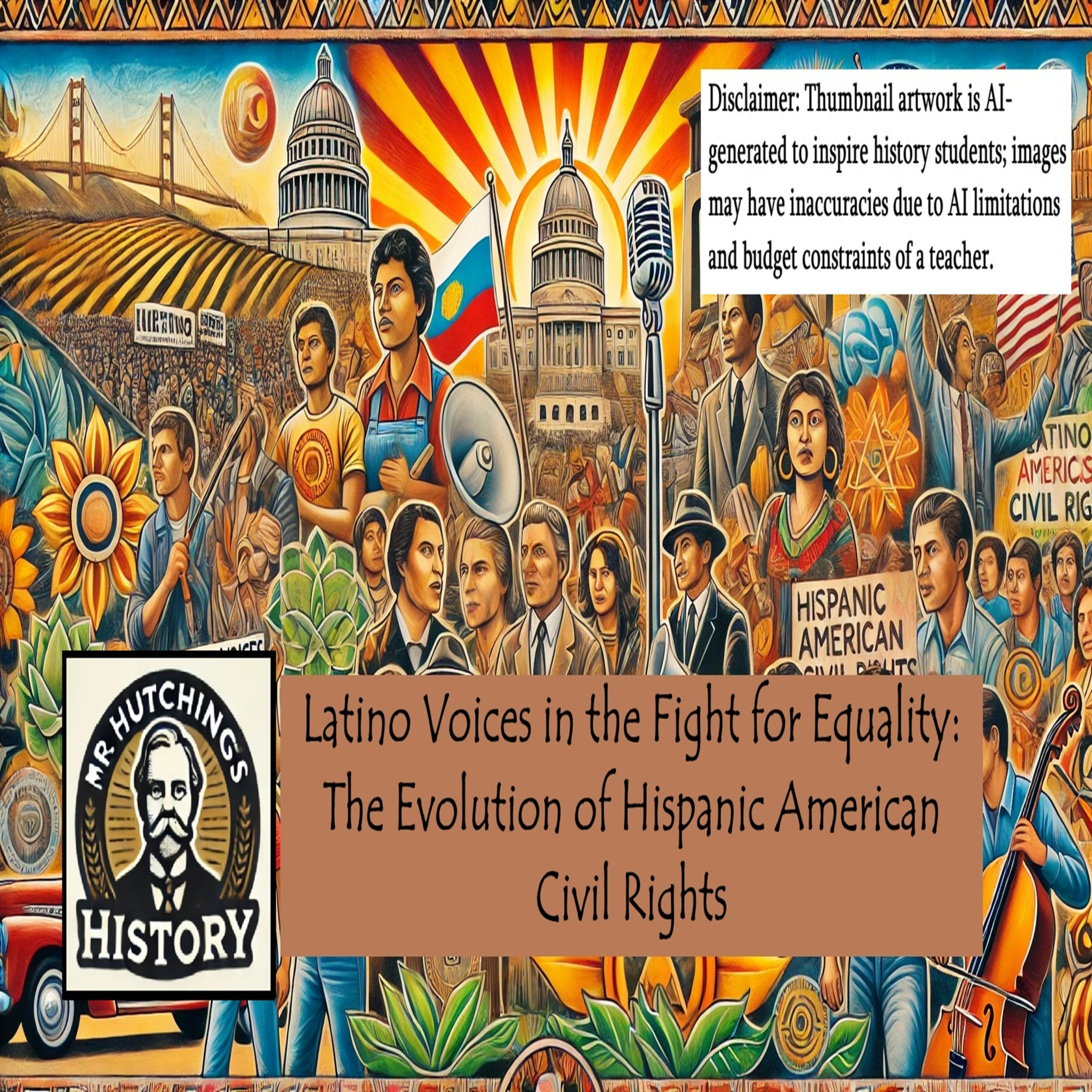 Mr. Hutchings HistoryLatino Voices in the Fight for Equality: The Evolution of Hispanic American Civil RightsIn this episode of Mr. Hutchings History, we explore the long and evolving struggle for equality faced by Hispanic Americans. From their roots in the 19th century to their significant influence by the early 21st century, we trace the history of Mexican, Puerto Rican, and Cuban-American activism, detailing the key figures and movements that shaped their journey. This episode delves into the growth of political power, with the rise of advocacy groups and key political milestones like the formation of the Congressional Hispanic Caucus in 1976. We also address the challenges of economic inequality, the struggle for educational access, and...2024-12-1018 min
Mr. Hutchings HistoryLatino Voices in the Fight for Equality: The Evolution of Hispanic American Civil RightsIn this episode of Mr. Hutchings History, we explore the long and evolving struggle for equality faced by Hispanic Americans. From their roots in the 19th century to their significant influence by the early 21st century, we trace the history of Mexican, Puerto Rican, and Cuban-American activism, detailing the key figures and movements that shaped their journey. This episode delves into the growth of political power, with the rise of advocacy groups and key political milestones like the formation of the Congressional Hispanic Caucus in 1976. We also address the challenges of economic inequality, the struggle for educational access, and...2024-12-1018 min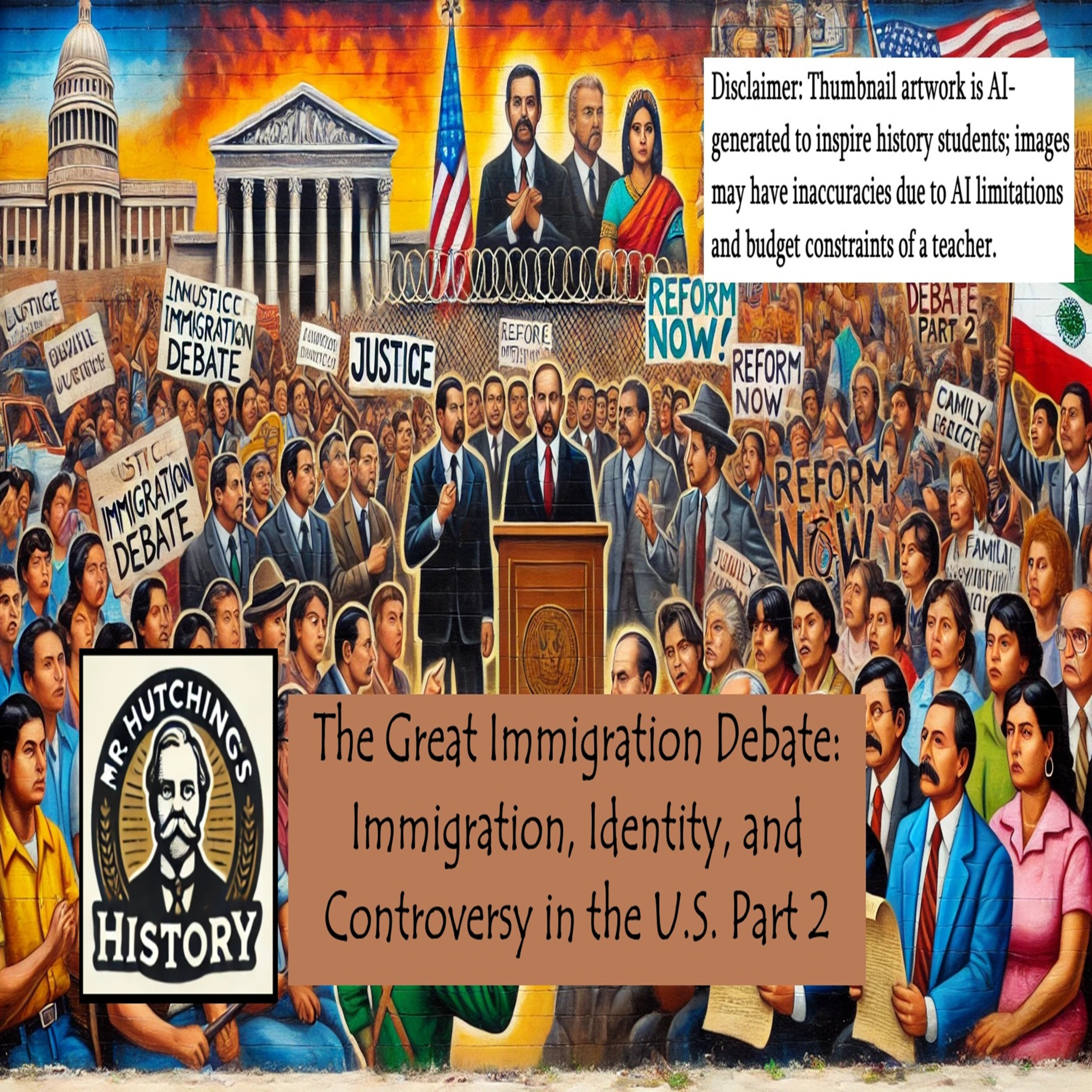 Mr. Hutchings HistoryThe Great Immigration Debate: Immigration, Identity, and Controversy in the U.S. Part 2In this episode of Mr. Hutchings History, we continue to explore the complex dynamics of the U.S. immigration debate, focusing on the experiences of Hispanic immigrants. This episode dives into the law and order narrative, addressing the persistent accusations that immigration contributes to rising crime rates, particularly in urban areas. We examine the debate over assimilation, highlighting the cultural and linguistic tensions, including backlash against bilingual education and the "English-only" movement. The episode also touches on the economic implications of immigration, with contrasting arguments about the costs and benefits immigrants bring to the U.S. economy. We further...2024-12-1011 min
Mr. Hutchings HistoryThe Great Immigration Debate: Immigration, Identity, and Controversy in the U.S. Part 2In this episode of Mr. Hutchings History, we continue to explore the complex dynamics of the U.S. immigration debate, focusing on the experiences of Hispanic immigrants. This episode dives into the law and order narrative, addressing the persistent accusations that immigration contributes to rising crime rates, particularly in urban areas. We examine the debate over assimilation, highlighting the cultural and linguistic tensions, including backlash against bilingual education and the "English-only" movement. The episode also touches on the economic implications of immigration, with contrasting arguments about the costs and benefits immigrants bring to the U.S. economy. We further...2024-12-1011 min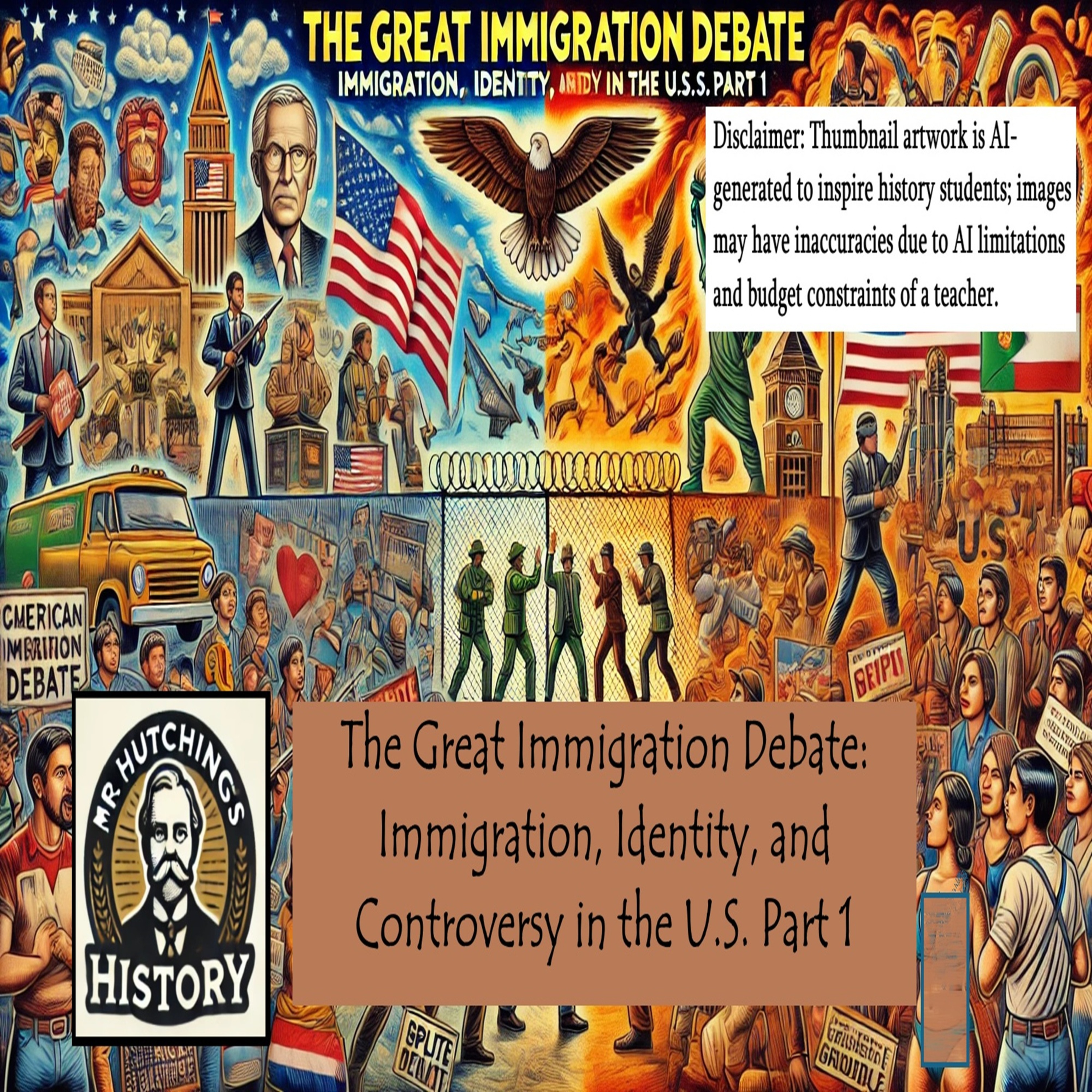 Mr. Hutchings HistoryThe Great Immigration Debate: Immigration, Identity, and Controversy in the U.S. Part 1In this episode of Mr. Hutchings History, we explore the pivotal role of Hispanic Americans in the ongoing U.S. immigration debate, focusing on the controversies and political challenges that arose during the late 20th century. We begin by examining California's Proposition 187, which sought to deny undocumented immigrants access to state-funded services. This episode delves into the economic arguments, including the perceived strain on public resources versus the vital labor immigrants provided. The discussion also addresses the cultural divide surrounding assimilation and language, highlighting the growth of bilingualism and the contributions immigrants made to American society. Additionally, we consider...2024-12-1022 min
Mr. Hutchings HistoryThe Great Immigration Debate: Immigration, Identity, and Controversy in the U.S. Part 1In this episode of Mr. Hutchings History, we explore the pivotal role of Hispanic Americans in the ongoing U.S. immigration debate, focusing on the controversies and political challenges that arose during the late 20th century. We begin by examining California's Proposition 187, which sought to deny undocumented immigrants access to state-funded services. This episode delves into the economic arguments, including the perceived strain on public resources versus the vital labor immigrants provided. The discussion also addresses the cultural divide surrounding assimilation and language, highlighting the growth of bilingualism and the contributions immigrants made to American society. Additionally, we consider...2024-12-1022 min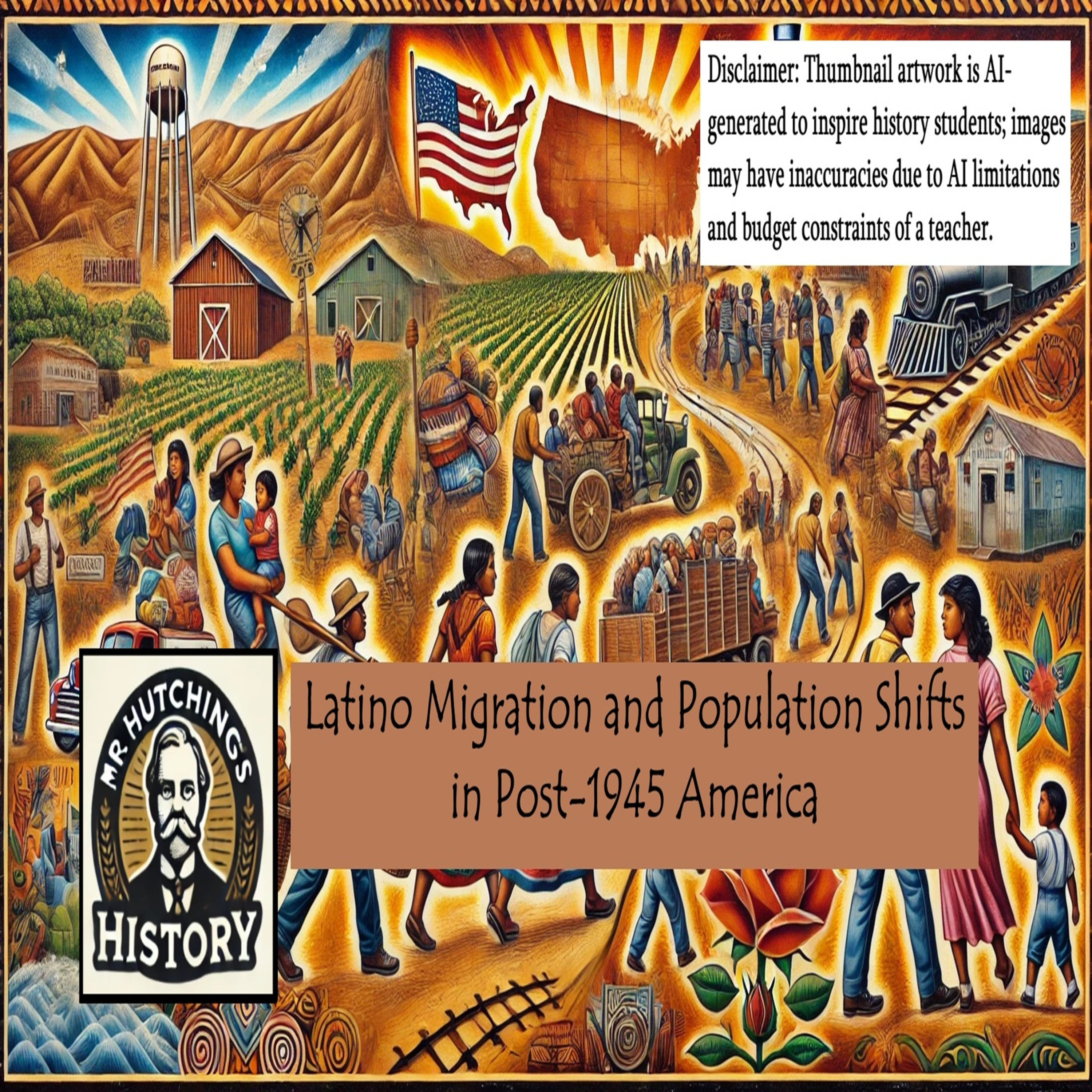 Mr. Hutchings HistoryLatino Migration and Population Shifts in Post-1945 AmericaIn this episode of Mr. Hutchings History, we examine the migration patterns and demographic shifts of Latino populations in the United States from the late 20th century into the 21st century. We explore the significant role of Mexican-Americans, Puerto Ricans, and Central American refugees in reshaping American society, with a focus on the political, economic, and cultural implications of these movements. From the dispersal of Puerto Ricans to Florida to the influx of Central Americans fleeing civil wars in the 1980s and 1990s, we discuss the challenges they faced, including strained resources and hostile reception. The episode also touches...2024-12-1010 min
Mr. Hutchings HistoryLatino Migration and Population Shifts in Post-1945 AmericaIn this episode of Mr. Hutchings History, we examine the migration patterns and demographic shifts of Latino populations in the United States from the late 20th century into the 21st century. We explore the significant role of Mexican-Americans, Puerto Ricans, and Central American refugees in reshaping American society, with a focus on the political, economic, and cultural implications of these movements. From the dispersal of Puerto Ricans to Florida to the influx of Central Americans fleeing civil wars in the 1980s and 1990s, we discuss the challenges they faced, including strained resources and hostile reception. The episode also touches...2024-12-1010 min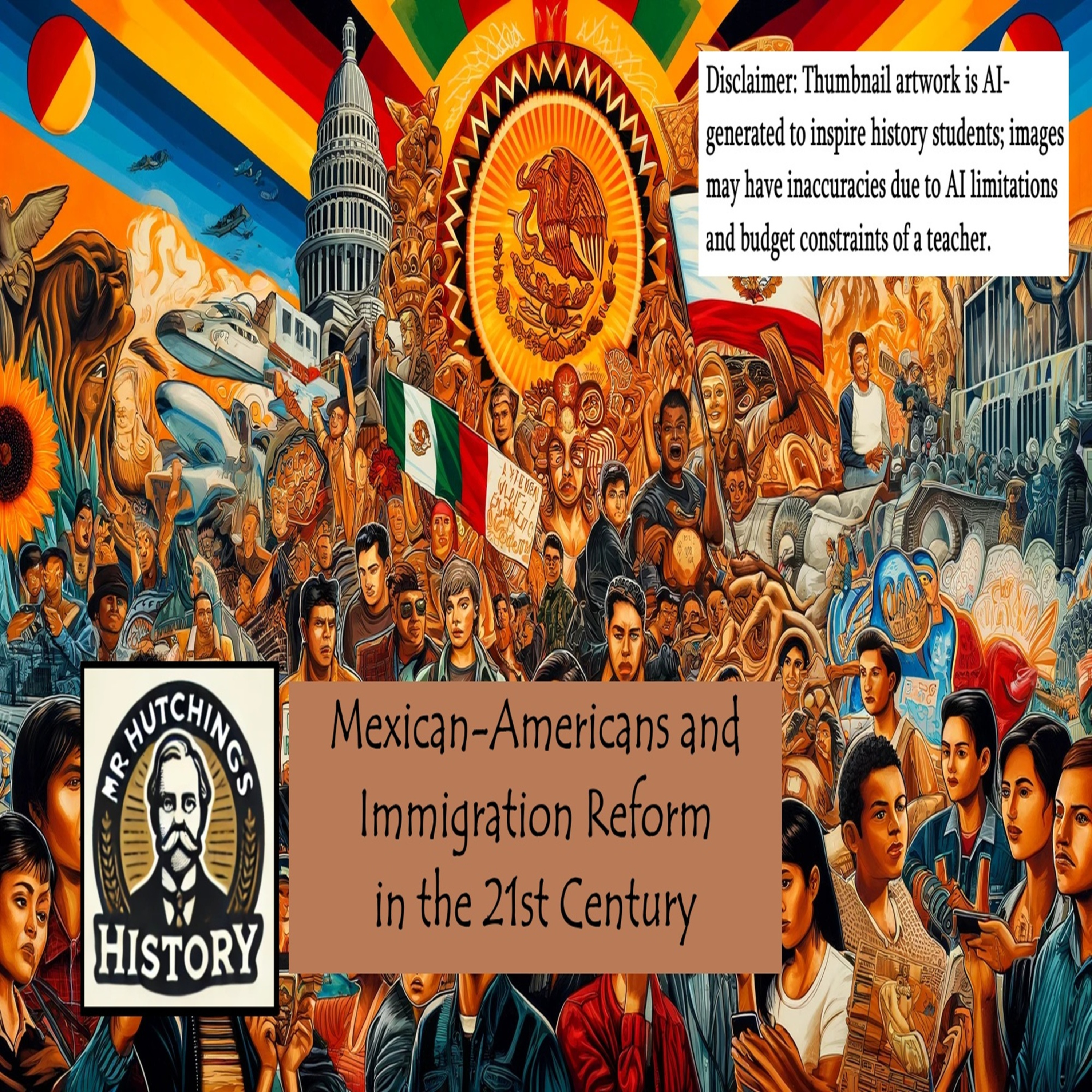 Mr. Hutchings HistoryMexican-Americans and Immigration Reform in the 21st CenturyIn this episode of Mr. Hutchings History, we explore the demographic, political, and social evolution of Mexican-Americans in the early 21st century. As the largest Hispanic group in the United States, Mexican-Americans have reshaped the cultural and political landscape, particularly in states like California and Texas. We discuss key moments in Mexican-American immigration, including the 1986 Immigration Reform and Control Act (IRCA), which granted amnesty to millions but also failed to stem the tide of undocumented immigration. We delve into the economic contributions of Mexican immigrants, who continue to play vital roles in agriculture, service industries, and construction, despite facing...2024-12-1022 min
Mr. Hutchings HistoryMexican-Americans and Immigration Reform in the 21st CenturyIn this episode of Mr. Hutchings History, we explore the demographic, political, and social evolution of Mexican-Americans in the early 21st century. As the largest Hispanic group in the United States, Mexican-Americans have reshaped the cultural and political landscape, particularly in states like California and Texas. We discuss key moments in Mexican-American immigration, including the 1986 Immigration Reform and Control Act (IRCA), which granted amnesty to millions but also failed to stem the tide of undocumented immigration. We delve into the economic contributions of Mexican immigrants, who continue to play vital roles in agriculture, service industries, and construction, despite facing...2024-12-1022 min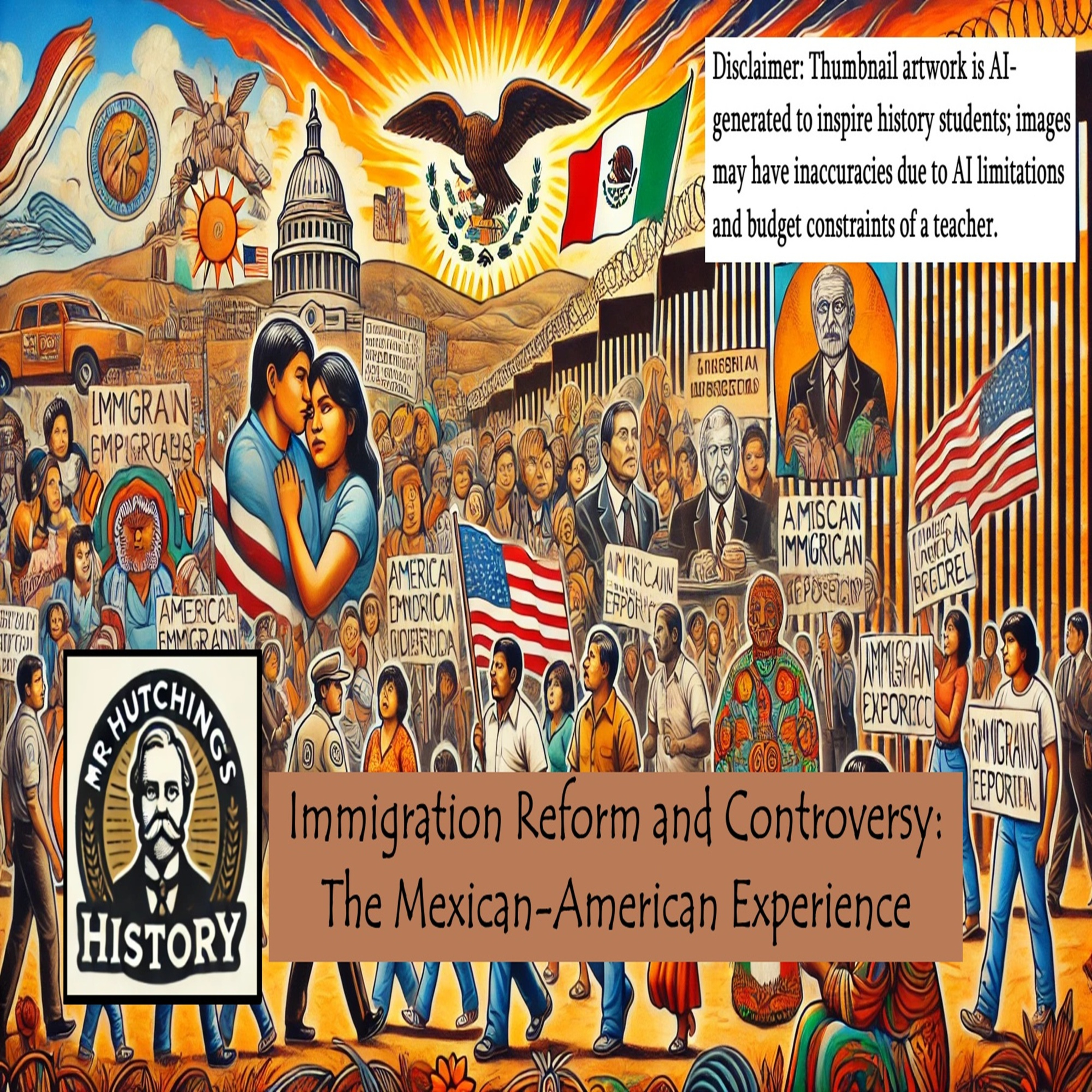 Mr. Hutchings HistoryImmigration Reform and Controversy: The Mexican-American ExperienceIn this episode of Mr. Hutchings History, we delve into the contentious history of Mexican-American immigration and the legislative reforms that shaped their experience. From the gold rush era to the 20th century’s key reforms, including the 1965 Hart-Celler Act and the 1986 Immigration Reform and Control Act (IRCA), we explore how Mexican migration was shaped by both economic necessity and political resistance. We’ll also look at the legacy of the Bracero Program, which brought Mexican laborers to U.S. farms during WWII, and the complex consequences of the IRCA, including the legalization of millions of Mexican immigrants, but also...2024-12-1018 min
Mr. Hutchings HistoryImmigration Reform and Controversy: The Mexican-American ExperienceIn this episode of Mr. Hutchings History, we delve into the contentious history of Mexican-American immigration and the legislative reforms that shaped their experience. From the gold rush era to the 20th century’s key reforms, including the 1965 Hart-Celler Act and the 1986 Immigration Reform and Control Act (IRCA), we explore how Mexican migration was shaped by both economic necessity and political resistance. We’ll also look at the legacy of the Bracero Program, which brought Mexican laborers to U.S. farms during WWII, and the complex consequences of the IRCA, including the legalization of millions of Mexican immigrants, but also...2024-12-1018 min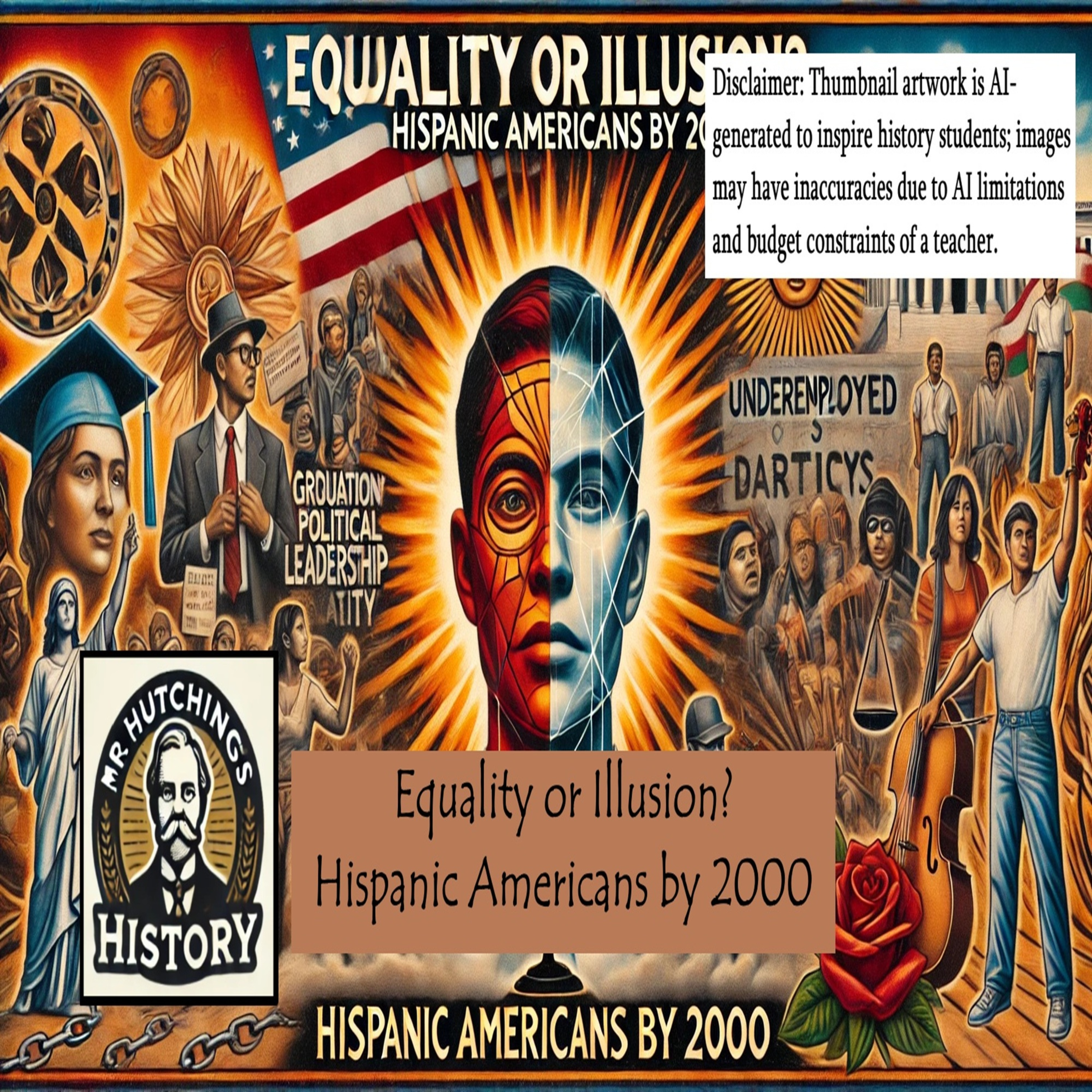 Mr. Hutchings HistoryEquality or Illusion? Hispanic Americans by 2000In this episode of Mr. Hutchings History, we explore the complex reality of Hispanic Americans by the year 2000. Despite significant progress in civil rights, education, and political representation, systemic inequalities continued to hinder full equality. Racial profiling, including higher incarceration rates for Latino youths and biased policing, underscored the persistence of institutional racism. Educational disparities, exacerbated by de facto segregation and inadequate funding, kept many Latino students at a disadvantage. While legal victories like Plyler v. Doe (1982) protected undocumented children’s right to public education, attacks on bilingual education and the rollback of affirmative action programs, such as Proposition 209, re...2024-12-1018 min
Mr. Hutchings HistoryEquality or Illusion? Hispanic Americans by 2000In this episode of Mr. Hutchings History, we explore the complex reality of Hispanic Americans by the year 2000. Despite significant progress in civil rights, education, and political representation, systemic inequalities continued to hinder full equality. Racial profiling, including higher incarceration rates for Latino youths and biased policing, underscored the persistence of institutional racism. Educational disparities, exacerbated by de facto segregation and inadequate funding, kept many Latino students at a disadvantage. While legal victories like Plyler v. Doe (1982) protected undocumented children’s right to public education, attacks on bilingual education and the rollback of affirmative action programs, such as Proposition 209, re...2024-12-1018 min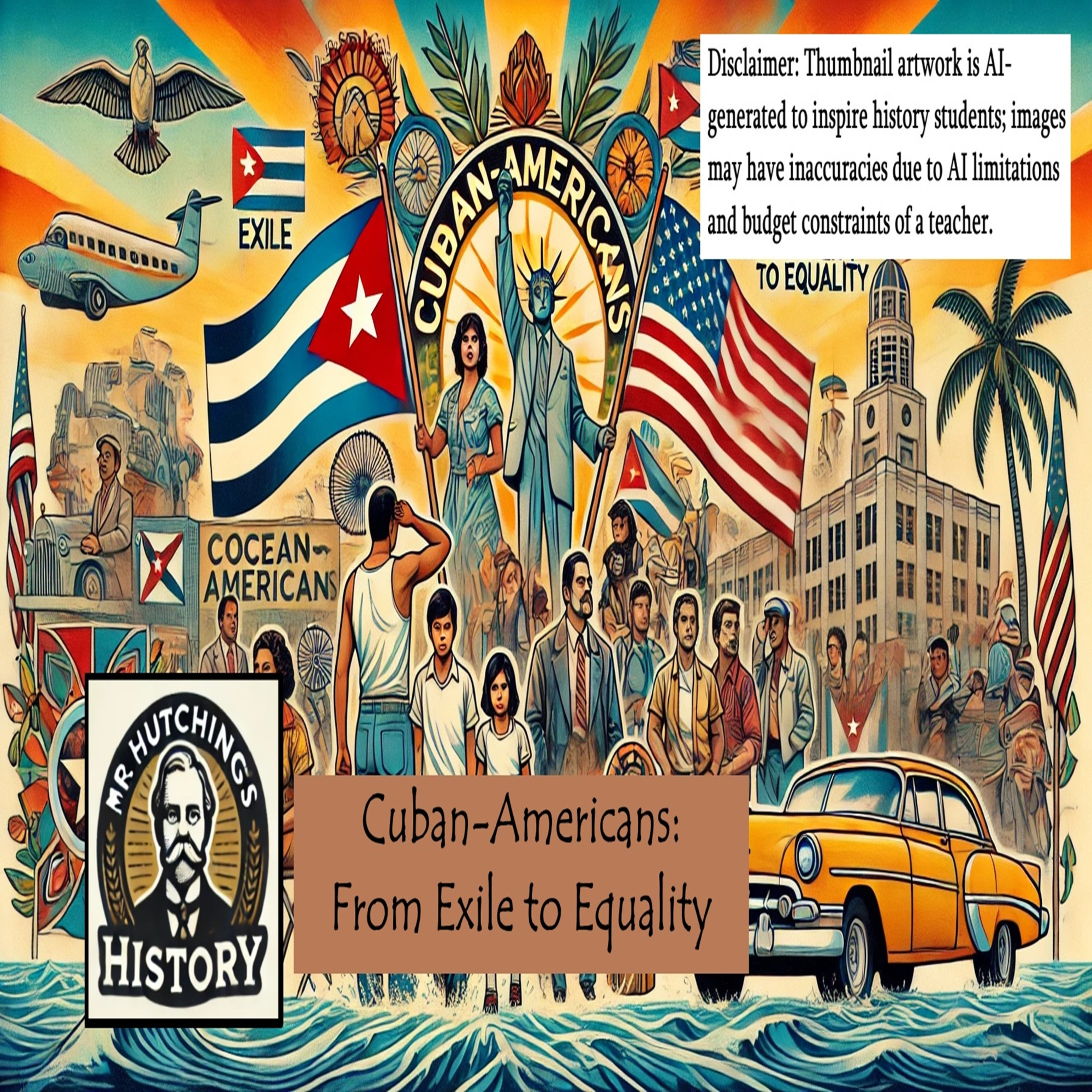 Mr. Hutchings HistoryCuban-Americans: From Exile to EqualityIn this episode of Mr. Hutchings History, we explore the Cuban-American experience, examining their transformation from political exiles to a powerful force in U.S. politics and society. We’ll trace the early waves of Cuban immigration, particularly the Cold War-era exodus of refugees fleeing Fidel Castro’s regime, and how U.S. government support helped them assimilate and achieve remarkable socioeconomic success. By the 1980s, Cuban-Americans had made significant strides in education and income levels. But the arrival of the Marielitos in 1980, a wave of Cuban immigrants who were less affluent and often stigmatized, revealed the complexities of Cuba...2024-12-1023 min
Mr. Hutchings HistoryCuban-Americans: From Exile to EqualityIn this episode of Mr. Hutchings History, we explore the Cuban-American experience, examining their transformation from political exiles to a powerful force in U.S. politics and society. We’ll trace the early waves of Cuban immigration, particularly the Cold War-era exodus of refugees fleeing Fidel Castro’s regime, and how U.S. government support helped them assimilate and achieve remarkable socioeconomic success. By the 1980s, Cuban-Americans had made significant strides in education and income levels. But the arrival of the Marielitos in 1980, a wave of Cuban immigrants who were less affluent and often stigmatized, revealed the complexities of Cuba...2024-12-1023 min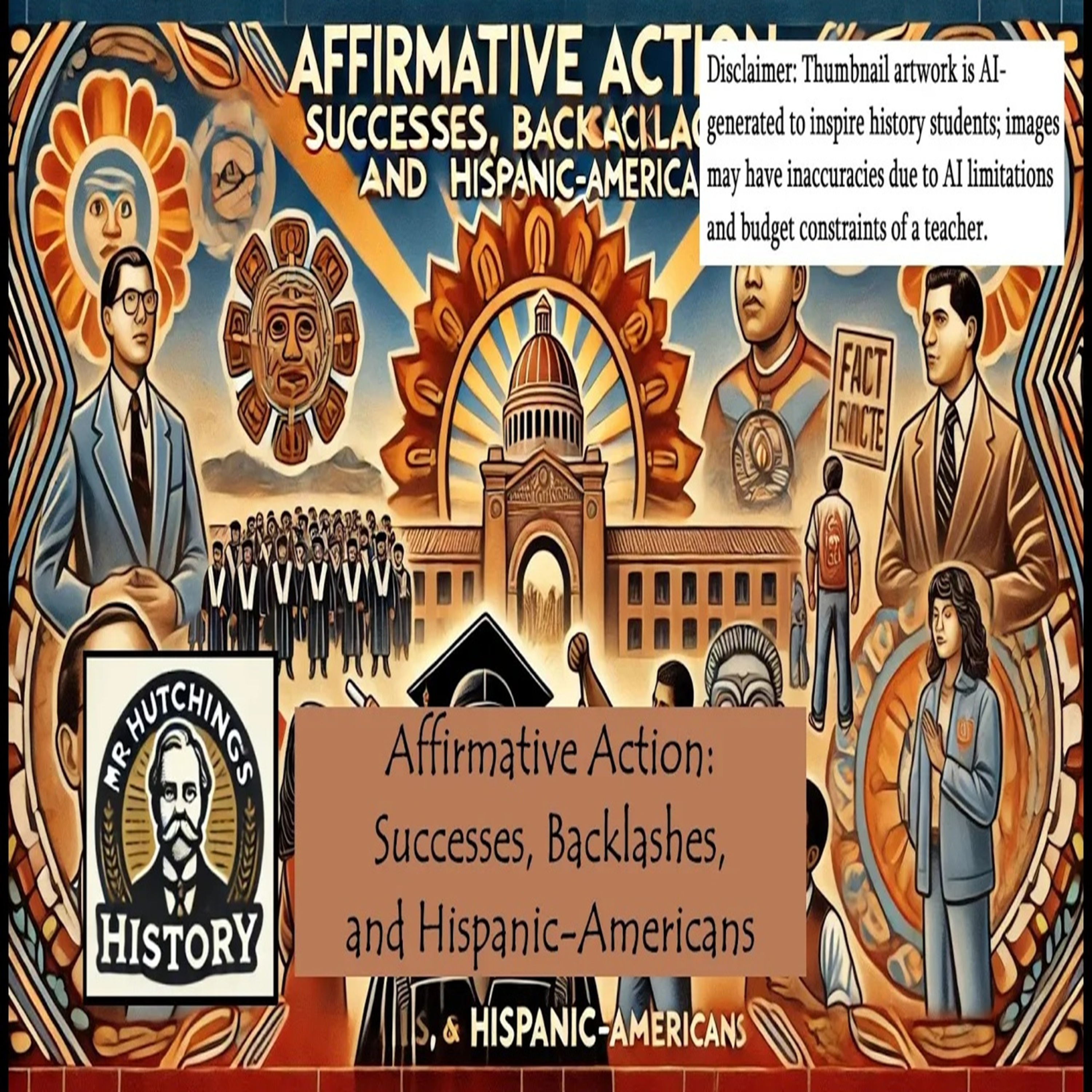 Mr. Hutchings HistoryAffirmative Action: Successes, Backlashes, and Hispanic-AmericansIn this episode of Mr. Hutchings History, we dive deep into the impact of affirmative action on Hispanic-Americans, examining both its successes and the backlash that has shaped its trajectory. Affirmative action was a key policy aimed at rectifying systemic discrimination in employment and education, and while it provided substantial opportunities for Latino students and workers, it also sparked significant opposition, particularly in the 1990s. We explore how affirmative action led to increased representation in higher education and corporate sectors for Hispanic-Americans, empowering generations to pursue their goals. However, the rise of initiatives like California's Proposition 209 and Washington State’s...2024-12-1017 min
Mr. Hutchings HistoryAffirmative Action: Successes, Backlashes, and Hispanic-AmericansIn this episode of Mr. Hutchings History, we dive deep into the impact of affirmative action on Hispanic-Americans, examining both its successes and the backlash that has shaped its trajectory. Affirmative action was a key policy aimed at rectifying systemic discrimination in employment and education, and while it provided substantial opportunities for Latino students and workers, it also sparked significant opposition, particularly in the 1990s. We explore how affirmative action led to increased representation in higher education and corporate sectors for Hispanic-Americans, empowering generations to pursue their goals. However, the rise of initiatives like California's Proposition 209 and Washington State’s...2024-12-1017 min Mr. Hutchings HistoryPuerto Rican Success Stories: From Struggle to Supreme CourtIn this episode of Mr. Hutchings History, we explore the inspiring journey of Puerto Ricans in the U.S., focusing on their rise from adversity to influential roles in public life, especially through the groundbreaking success of Sonia Sotomayor. Sotomayor's ascent to the U.S. Supreme Court symbolizes the resilience and determination of Puerto Rican individuals who have navigated systemic barriers to reach the highest echelons of American governance. From her early life in the Bronx to her groundbreaking judicial career, Sotomayor's story embodies the struggle for equality and representation. Alongside her, we highlight the contributions of local Puerto...2024-12-0920 min
Mr. Hutchings HistoryPuerto Rican Success Stories: From Struggle to Supreme CourtIn this episode of Mr. Hutchings History, we explore the inspiring journey of Puerto Ricans in the U.S., focusing on their rise from adversity to influential roles in public life, especially through the groundbreaking success of Sonia Sotomayor. Sotomayor's ascent to the U.S. Supreme Court symbolizes the resilience and determination of Puerto Rican individuals who have navigated systemic barriers to reach the highest echelons of American governance. From her early life in the Bronx to her groundbreaking judicial career, Sotomayor's story embodies the struggle for equality and representation. Alongside her, we highlight the contributions of local Puerto...2024-12-0920 min Mr. Hutchings HistoryLatino Economic Inequality: Root Causes and ConsequencesIn this episode of Mr. Hutchings History, we explore the ongoing economic inequality faced by Latinos in the U.S., from post-World War II to the early 21st century. Despite some gains, Latinos have been disproportionately affected by educational disparities, residential segregation, and systemic racial discrimination. By 1999, Latino households had an average income of $29,110—significantly lower than the $43,287 of white American households. Nearly 25% of Latino families lived below the poverty line, double the national average. Latinos often turned to the informal economy, engaging in low-wage, insecure jobs. Educational barriers, such as underfunded schools and high dropout rates, limited access to...2024-12-0918 min
Mr. Hutchings HistoryLatino Economic Inequality: Root Causes and ConsequencesIn this episode of Mr. Hutchings History, we explore the ongoing economic inequality faced by Latinos in the U.S., from post-World War II to the early 21st century. Despite some gains, Latinos have been disproportionately affected by educational disparities, residential segregation, and systemic racial discrimination. By 1999, Latino households had an average income of $29,110—significantly lower than the $43,287 of white American households. Nearly 25% of Latino families lived below the poverty line, double the national average. Latinos often turned to the informal economy, engaging in low-wage, insecure jobs. Educational barriers, such as underfunded schools and high dropout rates, limited access to...2024-12-0918 min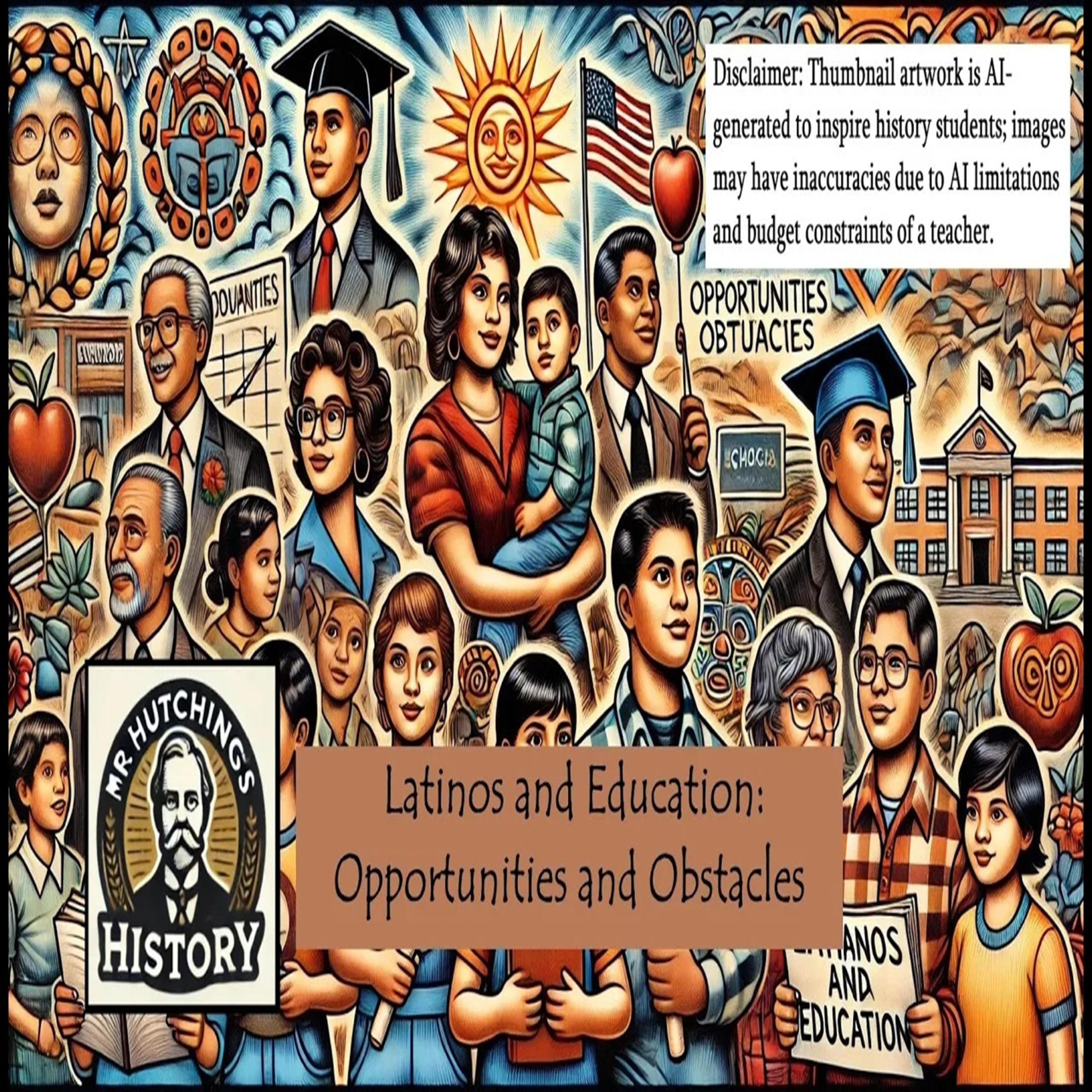 Mr. Hutchings HistoryLatinos and Education: Opportunities and ObstaclesIn this episode of Mr. Hutchings History, we delve into the complex educational journey of Hispanic-Americans from the 1940s onwards. Despite legal victories in desegregation, systemic barriers like de facto segregation, underfunding, and opposition to bilingual education persisted. Landmark cases like Alvarez v. Owen (1931) and Plyler v. Doe (1982) challenged discriminatory practices, but a 1996 Presidential Commission declared Latino educational attainment in crisis, with high dropout rates and limited access to higher education. Legislation like the Bilingual Education Acts of 1968 and 1974, as well as affirmative action programs, expanded opportunities, yet backlash in the 1990s, such as California’s Proposition 227, threatened these ga...2024-12-0925 min
Mr. Hutchings HistoryLatinos and Education: Opportunities and ObstaclesIn this episode of Mr. Hutchings History, we delve into the complex educational journey of Hispanic-Americans from the 1940s onwards. Despite legal victories in desegregation, systemic barriers like de facto segregation, underfunding, and opposition to bilingual education persisted. Landmark cases like Alvarez v. Owen (1931) and Plyler v. Doe (1982) challenged discriminatory practices, but a 1996 Presidential Commission declared Latino educational attainment in crisis, with high dropout rates and limited access to higher education. Legislation like the Bilingual Education Acts of 1968 and 1974, as well as affirmative action programs, expanded opportunities, yet backlash in the 1990s, such as California’s Proposition 227, threatened these ga...2024-12-0925 min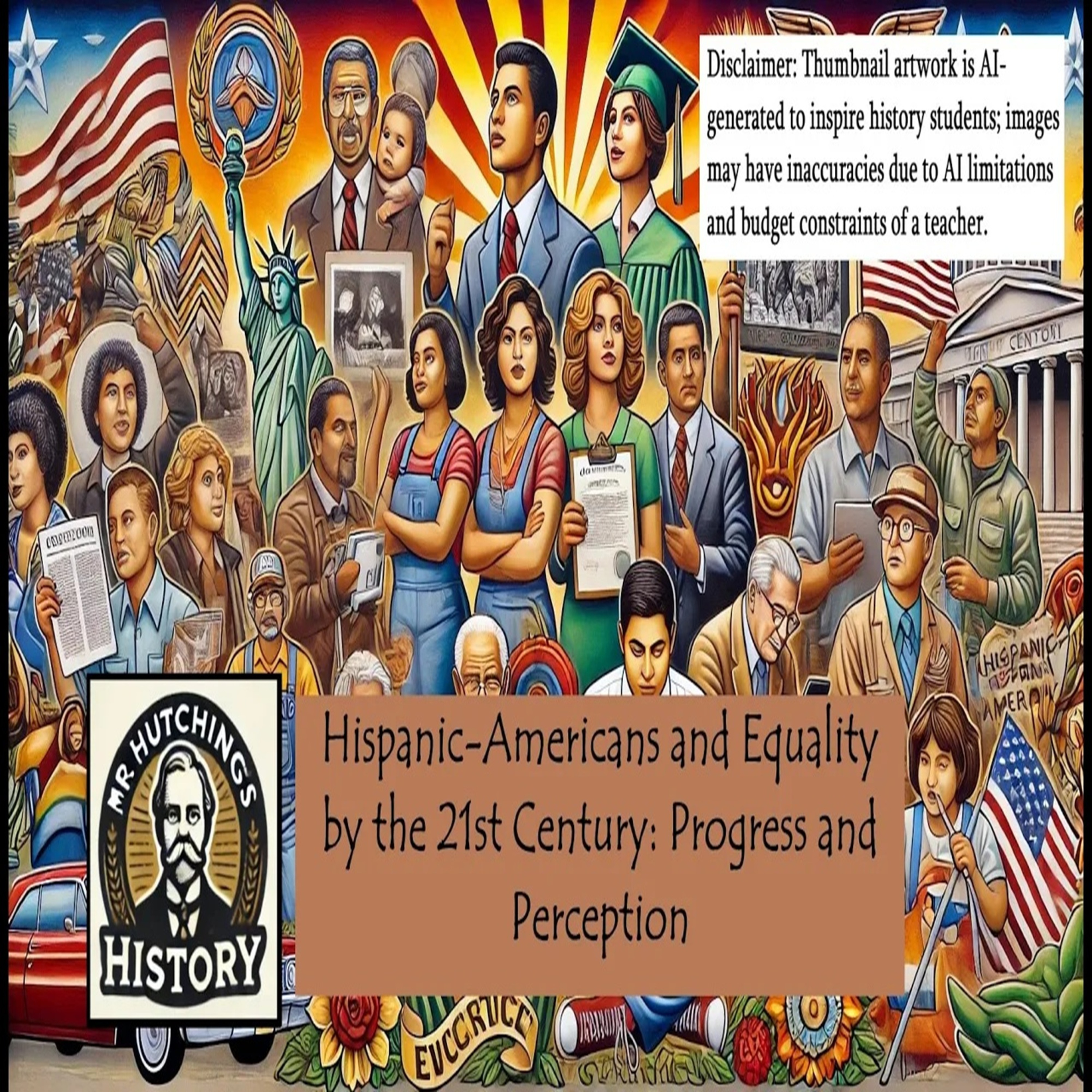 Mr. Hutchings HistoryHispanic-Americans and Equality by the 21st Century: Progress and PerceptionIn this episode of Mr. Hutchings History, we examine whether Hispanic-Americans achieved true equality by the early 21st century. Through key data, events, and social challenges, we explore the progress made and the obstacles that persisted. While Hispanic communities saw significant improvements in political representation and activism, persistent racial tensions, discrimination, and police profiling remained significant barriers. A 2007 poll revealed racial tensions between Hispanic-Americans, African-Americans, and white communities, while law enforcement practices like racial profiling further exacerbated inequality. The complex intersection of immigration enforcement and racial profiling added to these disparities. Historians like Juan González and Vicki Ruiz n...2024-12-0924 min
Mr. Hutchings HistoryHispanic-Americans and Equality by the 21st Century: Progress and PerceptionIn this episode of Mr. Hutchings History, we examine whether Hispanic-Americans achieved true equality by the early 21st century. Through key data, events, and social challenges, we explore the progress made and the obstacles that persisted. While Hispanic communities saw significant improvements in political representation and activism, persistent racial tensions, discrimination, and police profiling remained significant barriers. A 2007 poll revealed racial tensions between Hispanic-Americans, African-Americans, and white communities, while law enforcement practices like racial profiling further exacerbated inequality. The complex intersection of immigration enforcement and racial profiling added to these disparities. Historians like Juan González and Vicki Ruiz n...2024-12-0924 min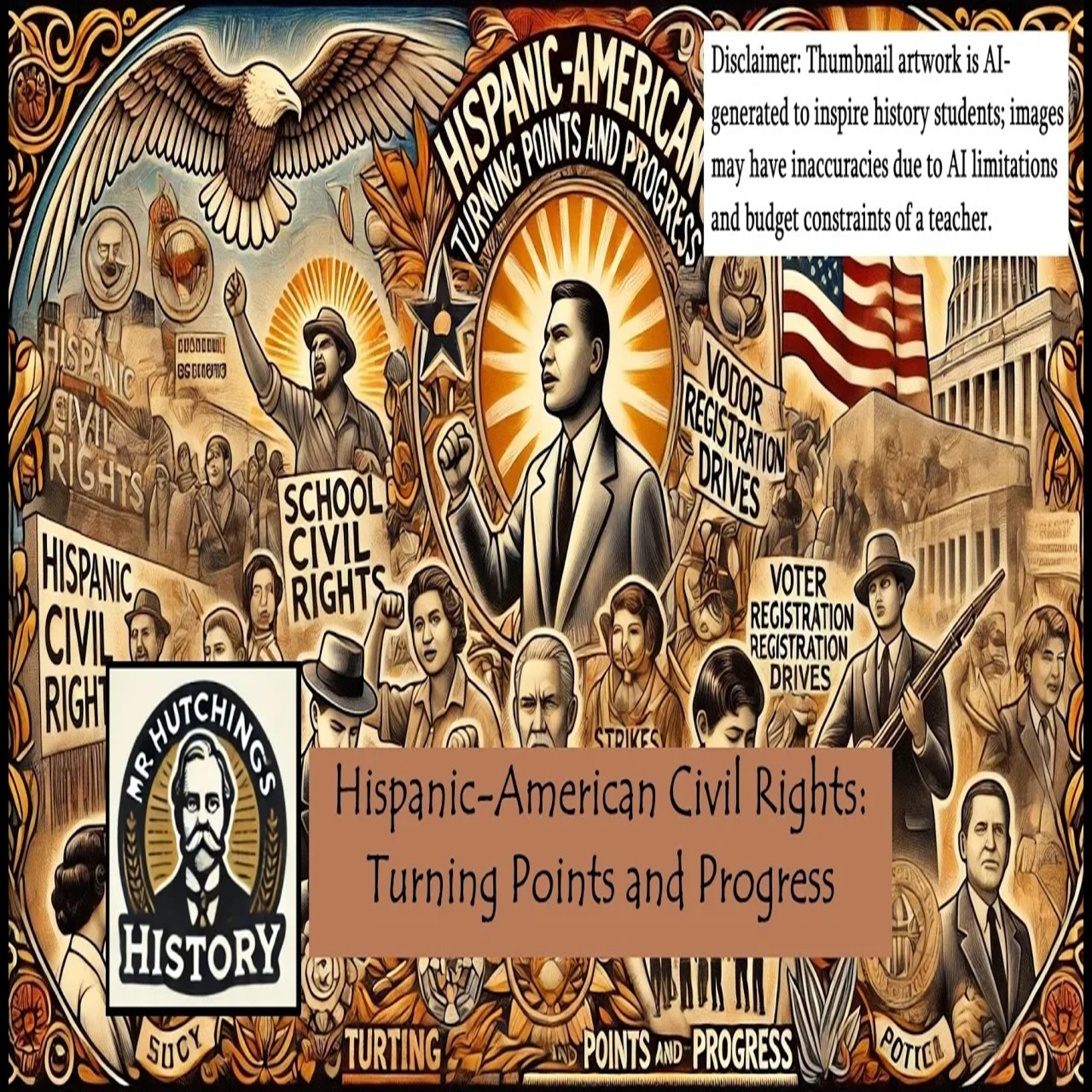 Mr. Hutchings HistoryHispanic-American Civil Rights: Turning Points and ProgressIn this episode of Mr. Hutchings History, we explore the trajectory of Hispanic-American civil rights from the 1960s to the 1990s, examining the pivotal moments that shaped the fight for equality. Was there a definitive turning point, or was progress more gradual? We delve into the 1960s, when grassroots activism and key legislative reforms set the stage for later victories, and the 1970s, which saw institutionalization through affirmative action. The 1980s brought increased political and cultural representation, but also significant challenges. The 1990s marked continued progress, especially in labor activism and political representation, but nativist backlash and economic inequalities...2024-12-0915 min
Mr. Hutchings HistoryHispanic-American Civil Rights: Turning Points and ProgressIn this episode of Mr. Hutchings History, we explore the trajectory of Hispanic-American civil rights from the 1960s to the 1990s, examining the pivotal moments that shaped the fight for equality. Was there a definitive turning point, or was progress more gradual? We delve into the 1960s, when grassroots activism and key legislative reforms set the stage for later victories, and the 1970s, which saw institutionalization through affirmative action. The 1980s brought increased political and cultural representation, but also significant challenges. The 1990s marked continued progress, especially in labor activism and political representation, but nativist backlash and economic inequalities...2024-12-0915 min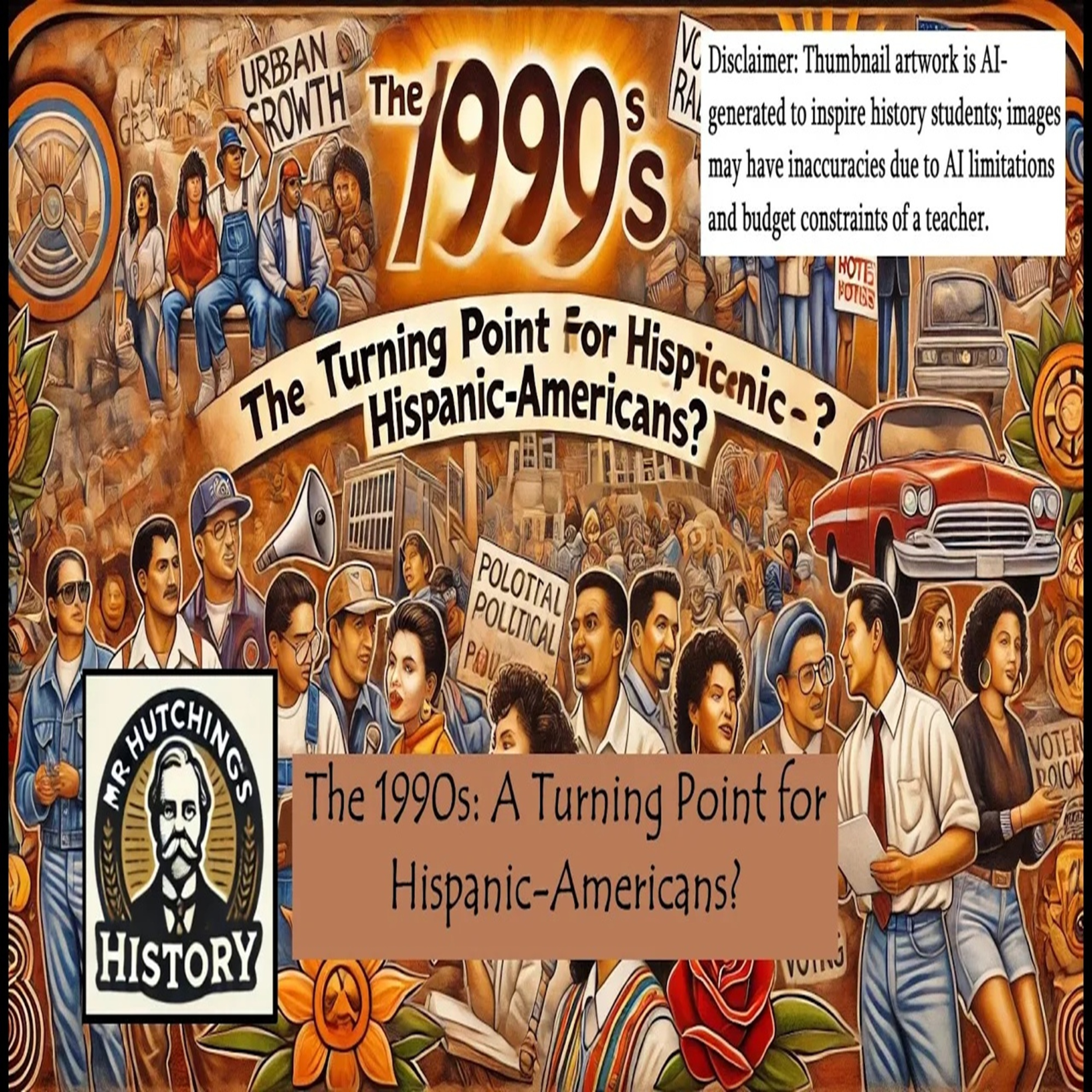 Mr. Hutchings HistoryThe 1990s: A Turning Point for Hispanic-Americans?In this episode of Mr. Hutchings History, we examine the 1990s as a transformative period for Hispanic-Americans. The decade witnessed significant progress in political representation, labor activism, and social justice, yet it was also marked by challenges like nativist backlash and internal tensions. We explore key moments such as the controversial Proposition 187, which sparked widespread protests and shifted Hispanic-American political alignment toward the Democratic Party. The 1990s also saw a resurgence of labor activism, led by Latinos in unions like SEIU, and significant gains in political representation, with more Hispanics elected to public office than ever before. However, despite...2024-12-0913 min
Mr. Hutchings HistoryThe 1990s: A Turning Point for Hispanic-Americans?In this episode of Mr. Hutchings History, we examine the 1990s as a transformative period for Hispanic-Americans. The decade witnessed significant progress in political representation, labor activism, and social justice, yet it was also marked by challenges like nativist backlash and internal tensions. We explore key moments such as the controversial Proposition 187, which sparked widespread protests and shifted Hispanic-American political alignment toward the Democratic Party. The 1990s also saw a resurgence of labor activism, led by Latinos in unions like SEIU, and significant gains in political representation, with more Hispanics elected to public office than ever before. However, despite...2024-12-0913 min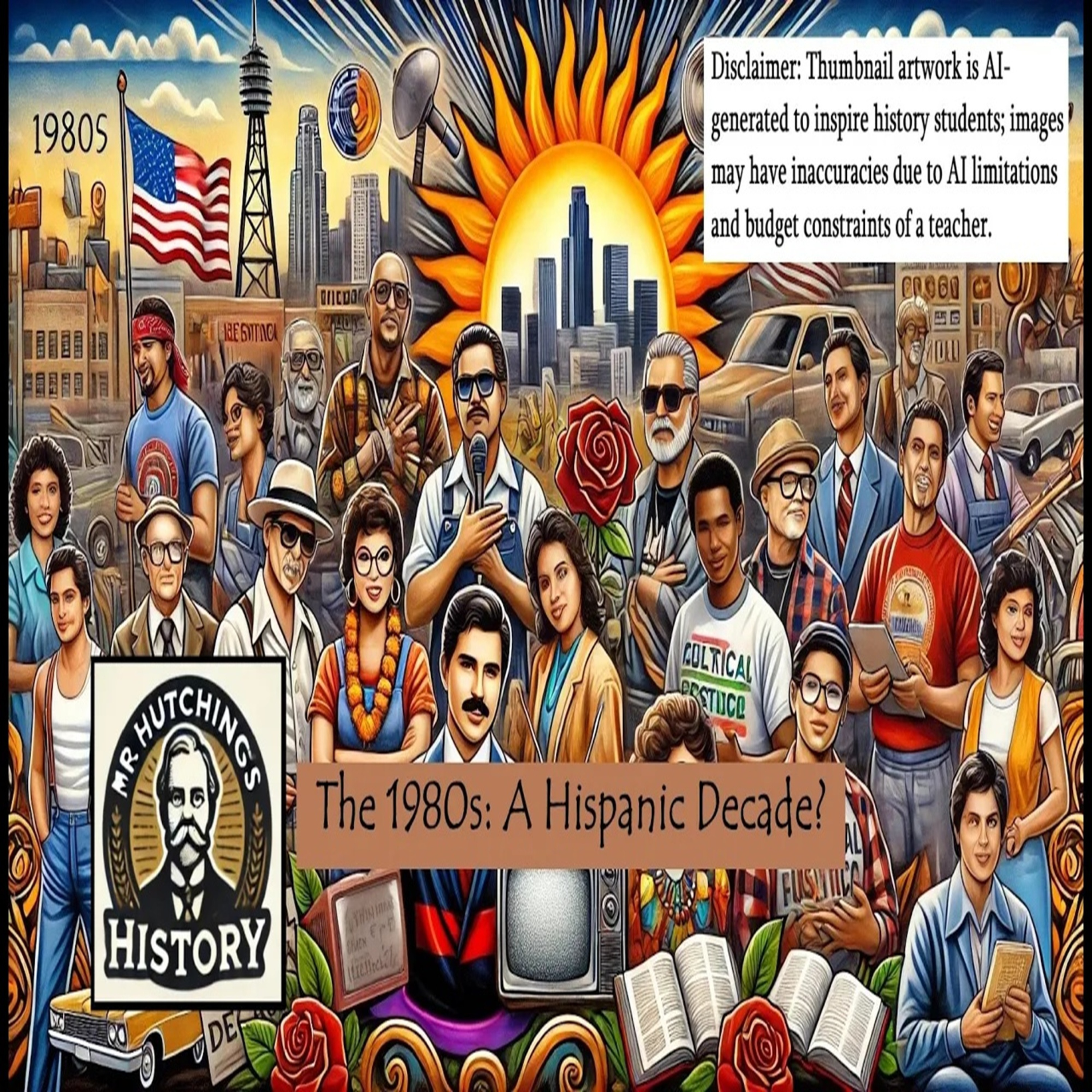 Mr. Hutchings HistoryThe 1980s: A Hispanic Decade?In this episode of Mr. Hutchings History, we explore whether the 1980s truly earned the title of the "Hispanic Decade." This pivotal decade marked significant strides in Hispanic-American political representation, legislative victories, and social influence, including the landmark Immigration Reform and Control Act of 1986. We’ll discuss the key developments that helped shape this era, such as the growth of Latino political representation, the role of advocacy organizations like MALDEF and NCLR, and the effects of affirmative action on education and employment opportunities. However, despite these gains, the 1980s also exposed persistent challenges such as white backlash, cuts to so...2024-12-0922 min
Mr. Hutchings HistoryThe 1980s: A Hispanic Decade?In this episode of Mr. Hutchings History, we explore whether the 1980s truly earned the title of the "Hispanic Decade." This pivotal decade marked significant strides in Hispanic-American political representation, legislative victories, and social influence, including the landmark Immigration Reform and Control Act of 1986. We’ll discuss the key developments that helped shape this era, such as the growth of Latino political representation, the role of advocacy organizations like MALDEF and NCLR, and the effects of affirmative action on education and employment opportunities. However, despite these gains, the 1980s also exposed persistent challenges such as white backlash, cuts to so...2024-12-0922 min Mr. Hutchings HistoryHispanic-Americans in the 1970s: Progress through Affirmative ActionIn this episode of Mr. Hutchings History, we explore the transformative decade of the 1970s for Hispanic-Americans, focusing on the progress made through affirmative action, legal battles, and political organization. This period saw significant strides in educational access, labor rights, and political representation, all fueled by grassroots activism and the efforts of advocacy organizations like LULAC, MALDEF, and NALEO. Key legal victories, such as the Cisneros v. Corpus Christi case and the Aspira Consent Decree of 1974, paved the way for bilingual education and furthered the push for systemic reforms. We discuss how affirmative action in education and employment helped...2024-12-0918 min
Mr. Hutchings HistoryHispanic-Americans in the 1970s: Progress through Affirmative ActionIn this episode of Mr. Hutchings History, we explore the transformative decade of the 1970s for Hispanic-Americans, focusing on the progress made through affirmative action, legal battles, and political organization. This period saw significant strides in educational access, labor rights, and political representation, all fueled by grassroots activism and the efforts of advocacy organizations like LULAC, MALDEF, and NALEO. Key legal victories, such as the Cisneros v. Corpus Christi case and the Aspira Consent Decree of 1974, paved the way for bilingual education and furthered the push for systemic reforms. We discuss how affirmative action in education and employment helped...2024-12-0918 min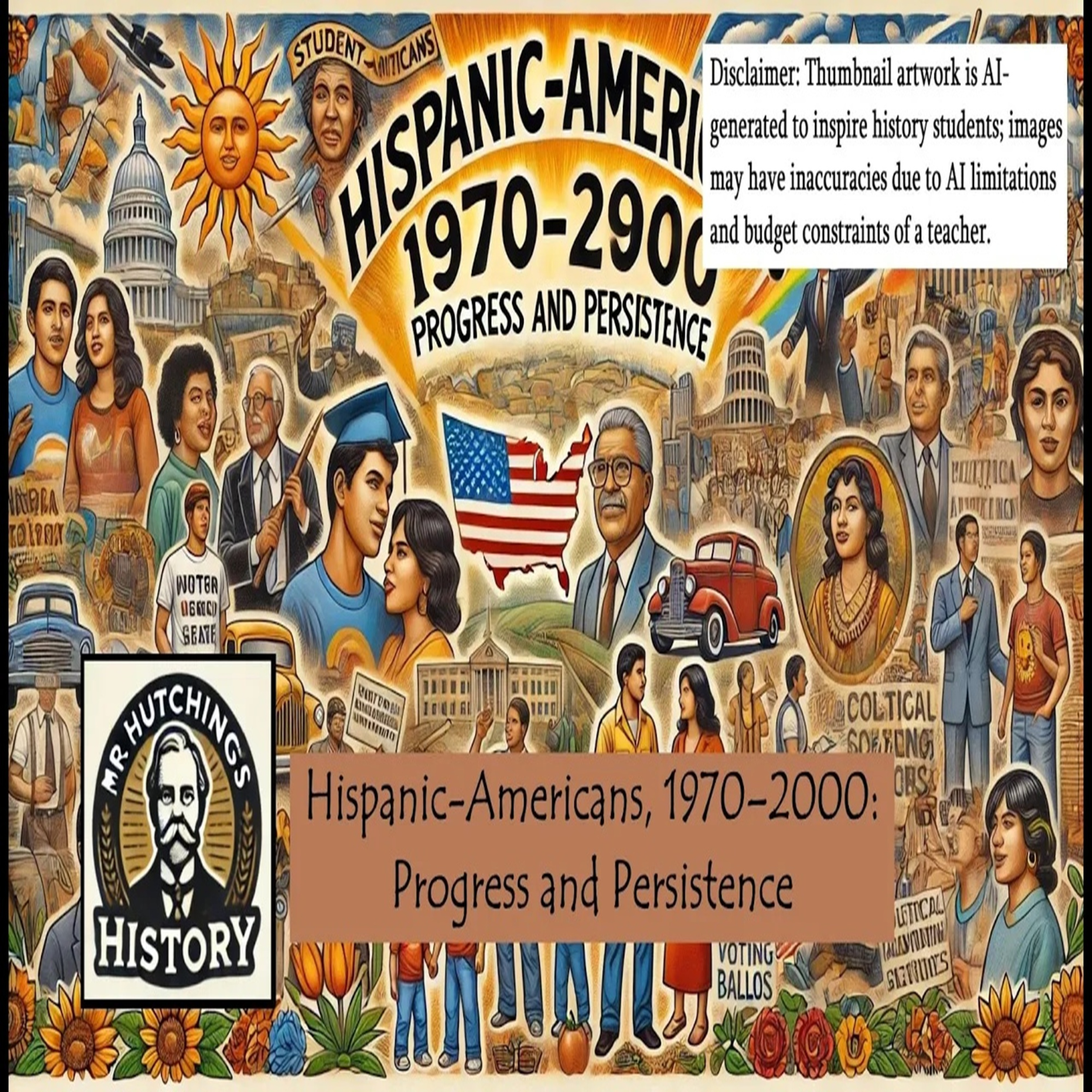 Mr. Hutchings HistoryHispanic-Americans, 1970–2000: Progress and PersistenceIn this episode of Mr. Hutchings History, we explore the experiences of Hispanic-Americans between 1970 and 2000, focusing on the political, educational, and social progress made during this period, alongside the persistent challenges that remained. As the largest and fastest-growing minority in the U.S., Hispanic-Americans fought for equality and recognition through grassroots activism, legal victories, and increased political representation. We discuss key events, like the passage of the Voting Rights Act Amendments (1975) and the landmark Aspira Consent Decree (1974), which secured bilingual education rights, alongside the rise of advocacy groups like the National Council of La Raza (NCLR) and the Southwest...2024-12-0918 min
Mr. Hutchings HistoryHispanic-Americans, 1970–2000: Progress and PersistenceIn this episode of Mr. Hutchings History, we explore the experiences of Hispanic-Americans between 1970 and 2000, focusing on the political, educational, and social progress made during this period, alongside the persistent challenges that remained. As the largest and fastest-growing minority in the U.S., Hispanic-Americans fought for equality and recognition through grassroots activism, legal victories, and increased political representation. We discuss key events, like the passage of the Voting Rights Act Amendments (1975) and the landmark Aspira Consent Decree (1974), which secured bilingual education rights, alongside the rise of advocacy groups like the National Council of La Raza (NCLR) and the Southwest...2024-12-0918 min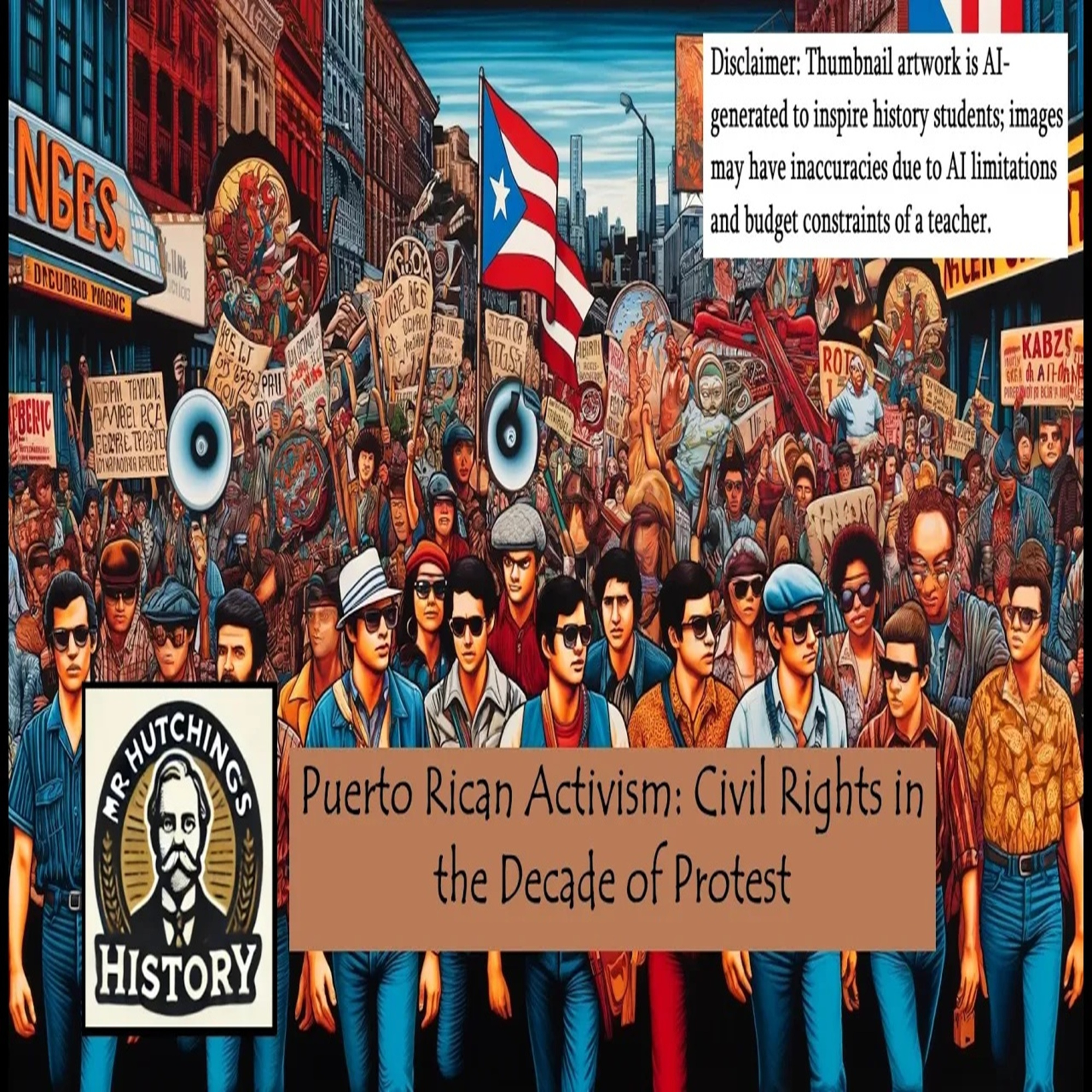 Mr. Hutchings HistoryPuerto Rican Activism: Civil Rights in the Decade of ProtestIn this episode of Mr. Hutchings History, we explore the rise of Puerto Rican activism in the United States during the post-1945 era. As Puerto Ricans faced systemic racism, economic inequality, and cultural challenges, they organized to demand justice and equality. This episode examines key movements and organizations such as Aspira, the Young Lords, and the Puerto Rican Legal Defense and Education Fund, which fought for bilingual education, political representation, and civil rights.
We also delve into the 1960s and 1970s “Decade of Protest,” when urban riots in Puerto Rican neighborhoods like Perth Amboy and Paterson sparked wide...2024-12-0915 min
Mr. Hutchings HistoryPuerto Rican Activism: Civil Rights in the Decade of ProtestIn this episode of Mr. Hutchings History, we explore the rise of Puerto Rican activism in the United States during the post-1945 era. As Puerto Ricans faced systemic racism, economic inequality, and cultural challenges, they organized to demand justice and equality. This episode examines key movements and organizations such as Aspira, the Young Lords, and the Puerto Rican Legal Defense and Education Fund, which fought for bilingual education, political representation, and civil rights.
We also delve into the 1960s and 1970s “Decade of Protest,” when urban riots in Puerto Rican neighborhoods like Perth Amboy and Paterson sparked wide...2024-12-0915 min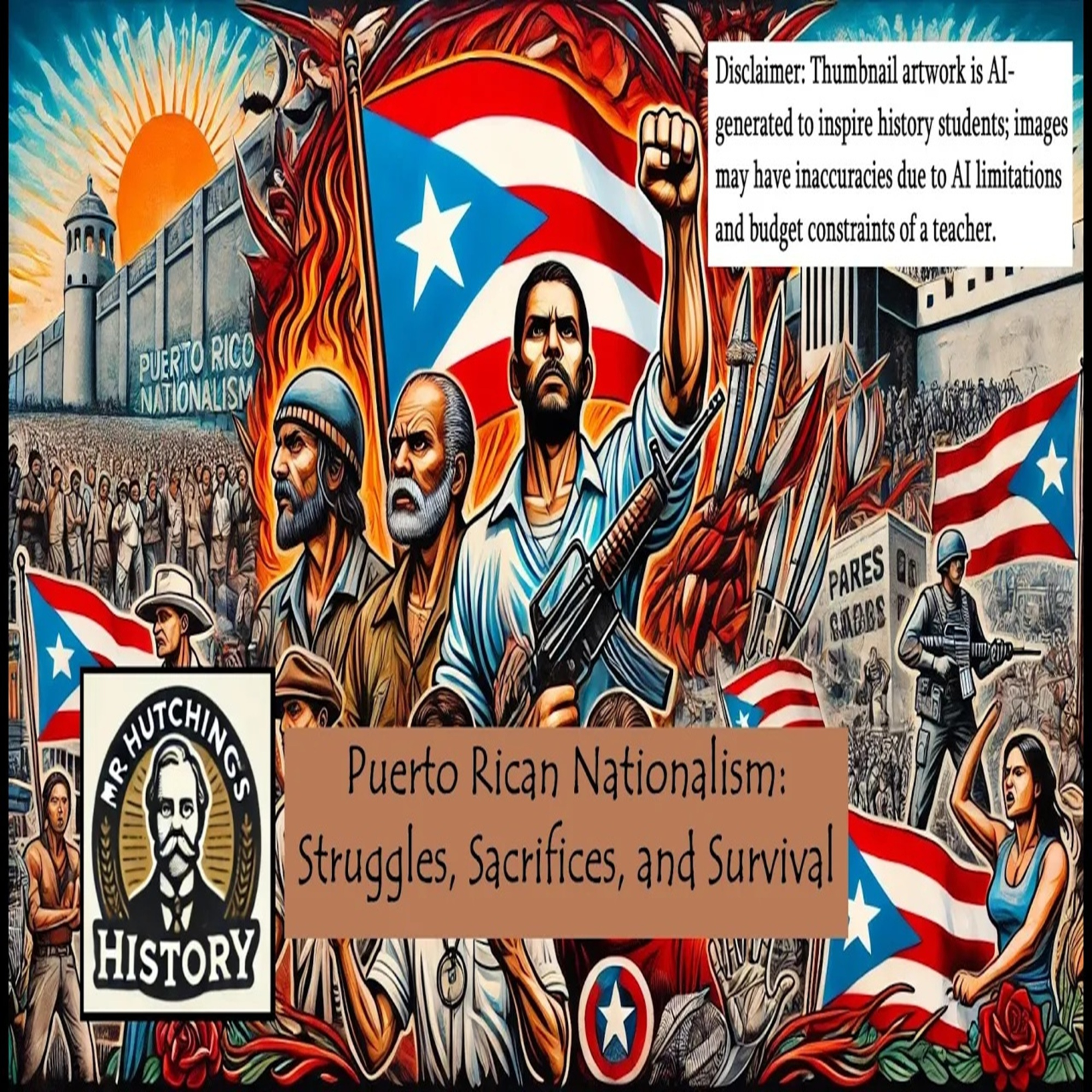 Mr. Hutchings HistoryPuerto Rican Nationalism: Struggles, Sacrifices, and SurvivalIn this episode of Mr. Hutchings History, we explore the intense and often controversial history of Puerto Rican nationalism, from acts of defiance in the 1950s to the enduring struggles of Puerto Ricans on the U.S. mainland. We examine the complex relationship between Puerto Rico and the U.S., beginning with its status as an unincorporated territory and the frustrations that led to the rise of the Puerto Rican Nationalist Party and groups like the Young Lords.
The episode covers pivotal events such as the 1950 assassination attempt on President Truman and the 1954 attack on the U...2024-12-0918 min
Mr. Hutchings HistoryPuerto Rican Nationalism: Struggles, Sacrifices, and SurvivalIn this episode of Mr. Hutchings History, we explore the intense and often controversial history of Puerto Rican nationalism, from acts of defiance in the 1950s to the enduring struggles of Puerto Ricans on the U.S. mainland. We examine the complex relationship between Puerto Rico and the U.S., beginning with its status as an unincorporated territory and the frustrations that led to the rise of the Puerto Rican Nationalist Party and groups like the Young Lords.
The episode covers pivotal events such as the 1950 assassination attempt on President Truman and the 1954 attack on the U...2024-12-0918 min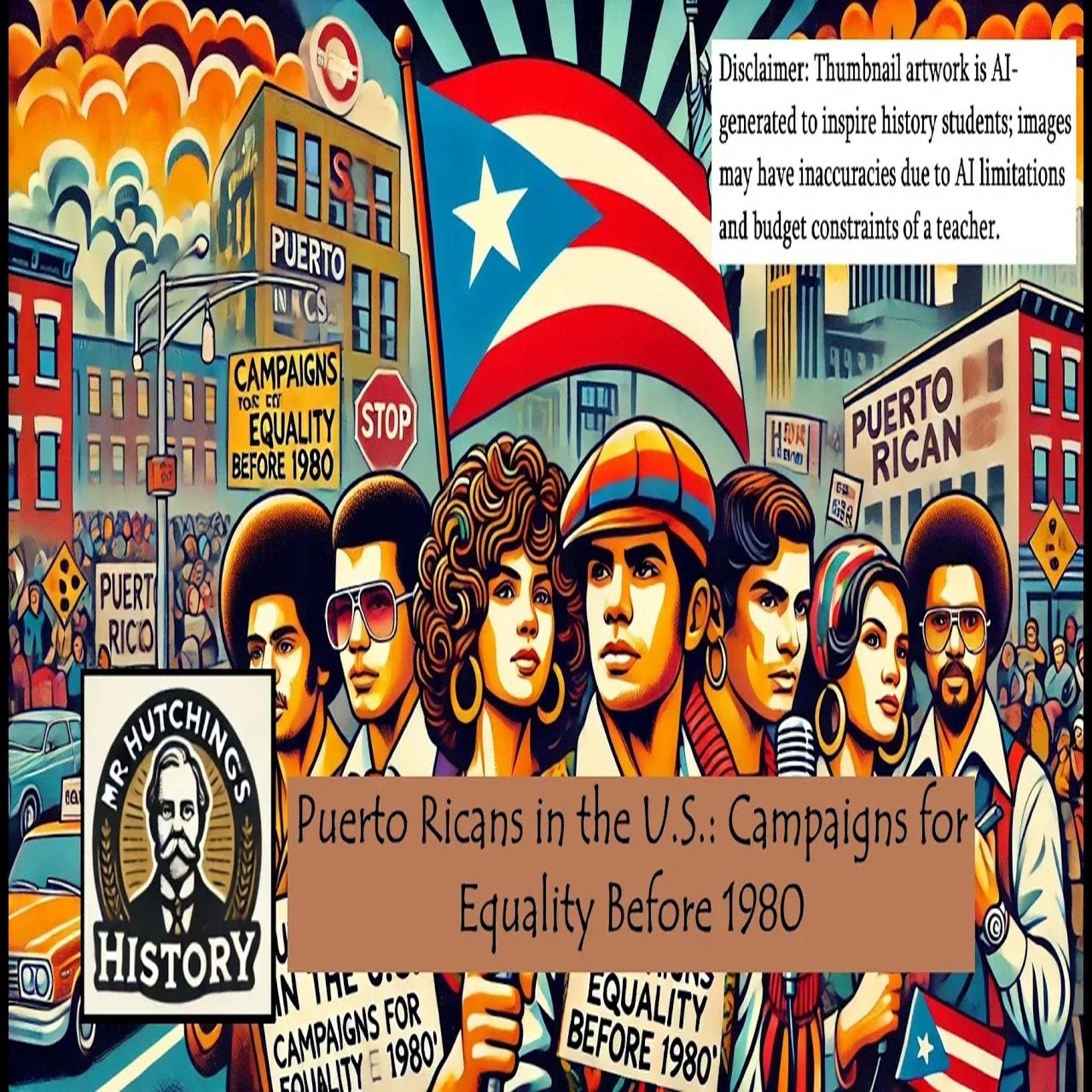 Mr. Hutchings HistoryPuerto Ricans in the U.S.: Campaigns for Equality Before 1980In this episode of Mr. Hutchings History, we explore the significant civil rights struggle of Puerto Ricans in the United States before 1980. From the challenges of migration and systemic discrimination to the rise of political activism, Puerto Ricans played a pivotal role in shaping the broader Hispanic American civil rights movement.
Following Puerto Rico’s cession to the U.S. in 1898, Puerto Ricans were granted citizenship but faced economic, cultural, and racial discrimination upon migration to the mainland. This episode covers key moments such as the formation of labor unions, the rise of the Young Lords in 1969, an...2024-12-0914 min
Mr. Hutchings HistoryPuerto Ricans in the U.S.: Campaigns for Equality Before 1980In this episode of Mr. Hutchings History, we explore the significant civil rights struggle of Puerto Ricans in the United States before 1980. From the challenges of migration and systemic discrimination to the rise of political activism, Puerto Ricans played a pivotal role in shaping the broader Hispanic American civil rights movement.
Following Puerto Rico’s cession to the U.S. in 1898, Puerto Ricans were granted citizenship but faced economic, cultural, and racial discrimination upon migration to the mainland. This episode covers key moments such as the formation of labor unions, the rise of the Young Lords in 1969, an...2024-12-0914 min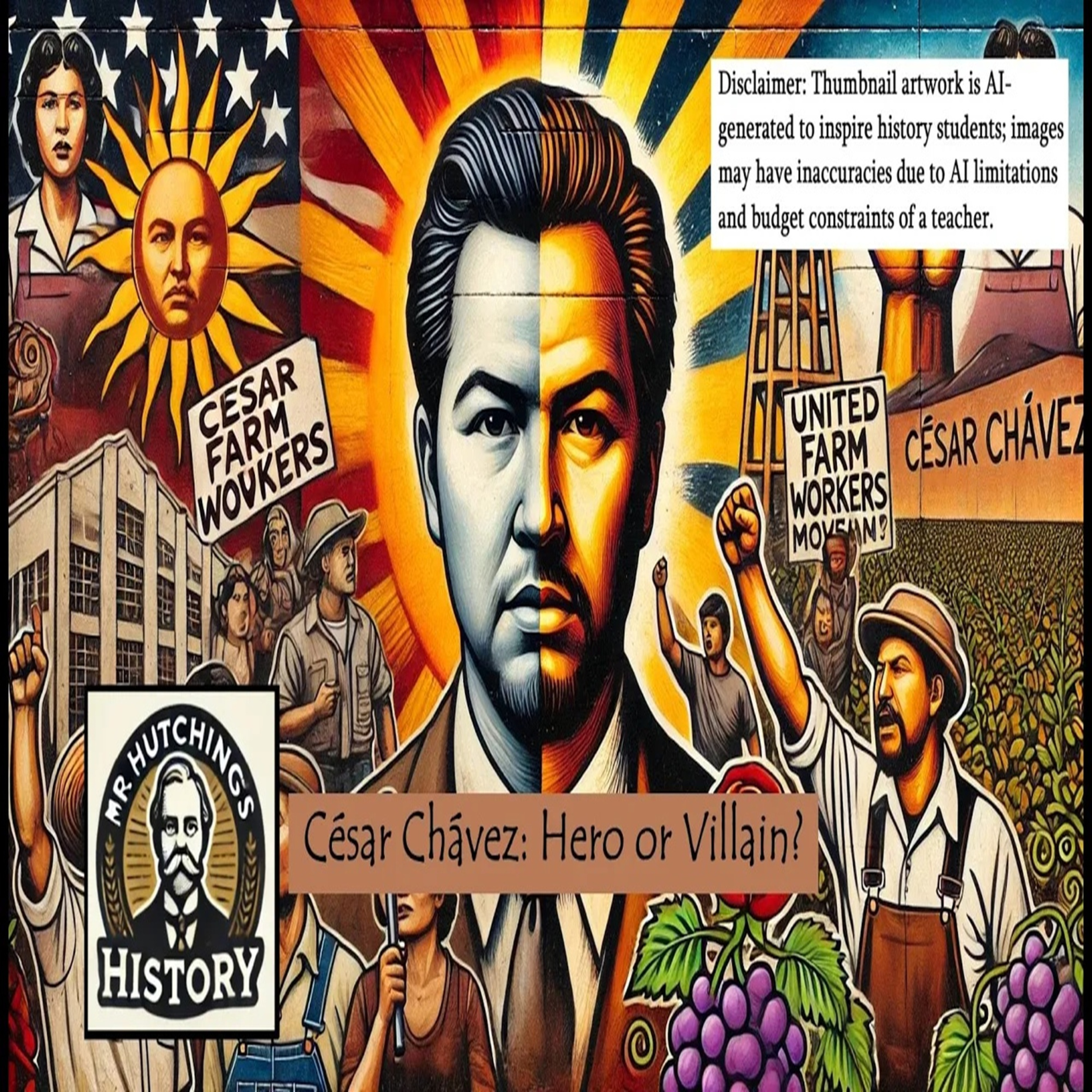 Mr. Hutchings HistoryCésar Chávez: Hero or Villain?In this episode of Mr. Hutchings History, we dive into the complex legacy of César Chávez, a central figure in the Hispanic American civil rights movement. Was Chávez the heroic champion of labor rights and Mexican-American equality, or a flawed leader whose authoritarian tendencies and strategic missteps tainted his achievements?
Chávez co-founded the United Farm Workers (UFW) in 1962, leading the iconic Delano Grape Strike and nationwide boycotts that brought much-needed reforms to agricultural labor. His commitment to nonviolence and cultural pride made him a symbol of resistance for Mexican-Americans. However, critics argue that his...2024-12-0913 min
Mr. Hutchings HistoryCésar Chávez: Hero or Villain?In this episode of Mr. Hutchings History, we dive into the complex legacy of César Chávez, a central figure in the Hispanic American civil rights movement. Was Chávez the heroic champion of labor rights and Mexican-American equality, or a flawed leader whose authoritarian tendencies and strategic missteps tainted his achievements?
Chávez co-founded the United Farm Workers (UFW) in 1962, leading the iconic Delano Grape Strike and nationwide boycotts that brought much-needed reforms to agricultural labor. His commitment to nonviolence and cultural pride made him a symbol of resistance for Mexican-Americans. However, critics argue that his...2024-12-0913 min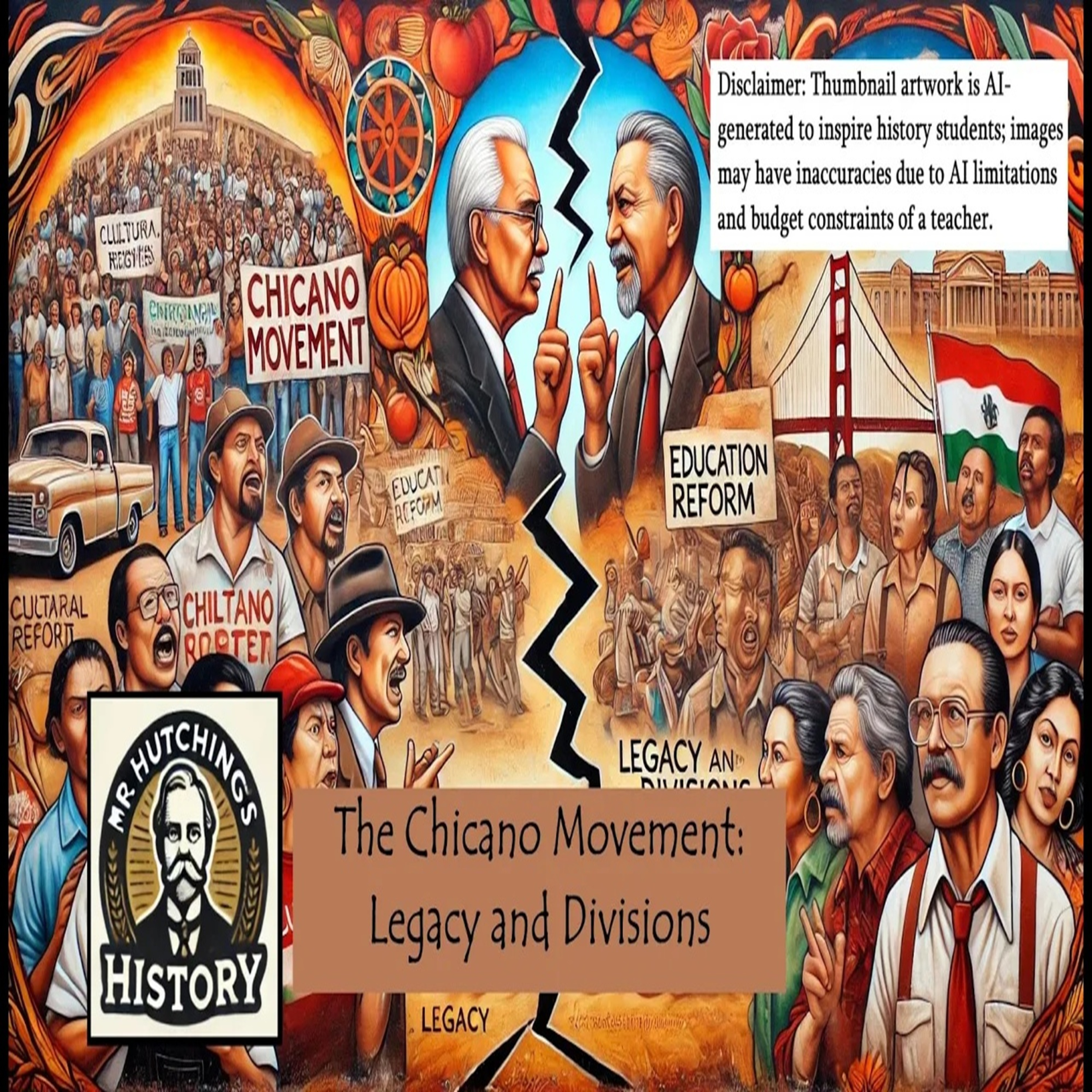 Mr. Hutchings HistoryThe Chicano Movement: Legacy and DivisionsIn this episode of Mr. Hutchings History, we explore the transformative impact of the Chicano Movement, a key chapter in the Hispanic American civil rights movement. The 1960s and 1970s saw Mexican-American activists demand education reform, political representation, and cultural pride. The movement led to the establishment of Chicano Studies programs, bilingual education, and greater representation of Mexican-Americans in schools and local governments.
Despite its successes, the Chicano Movement faced significant challenges, including ideological and regional divisions, government suppression, and internal fragmentation. The tensions between militant groups and more moderate factions often limited the movement's ability to...2024-12-0929 min
Mr. Hutchings HistoryThe Chicano Movement: Legacy and DivisionsIn this episode of Mr. Hutchings History, we explore the transformative impact of the Chicano Movement, a key chapter in the Hispanic American civil rights movement. The 1960s and 1970s saw Mexican-American activists demand education reform, political representation, and cultural pride. The movement led to the establishment of Chicano Studies programs, bilingual education, and greater representation of Mexican-Americans in schools and local governments.
Despite its successes, the Chicano Movement faced significant challenges, including ideological and regional divisions, government suppression, and internal fragmentation. The tensions between militant groups and more moderate factions often limited the movement's ability to...2024-12-0929 min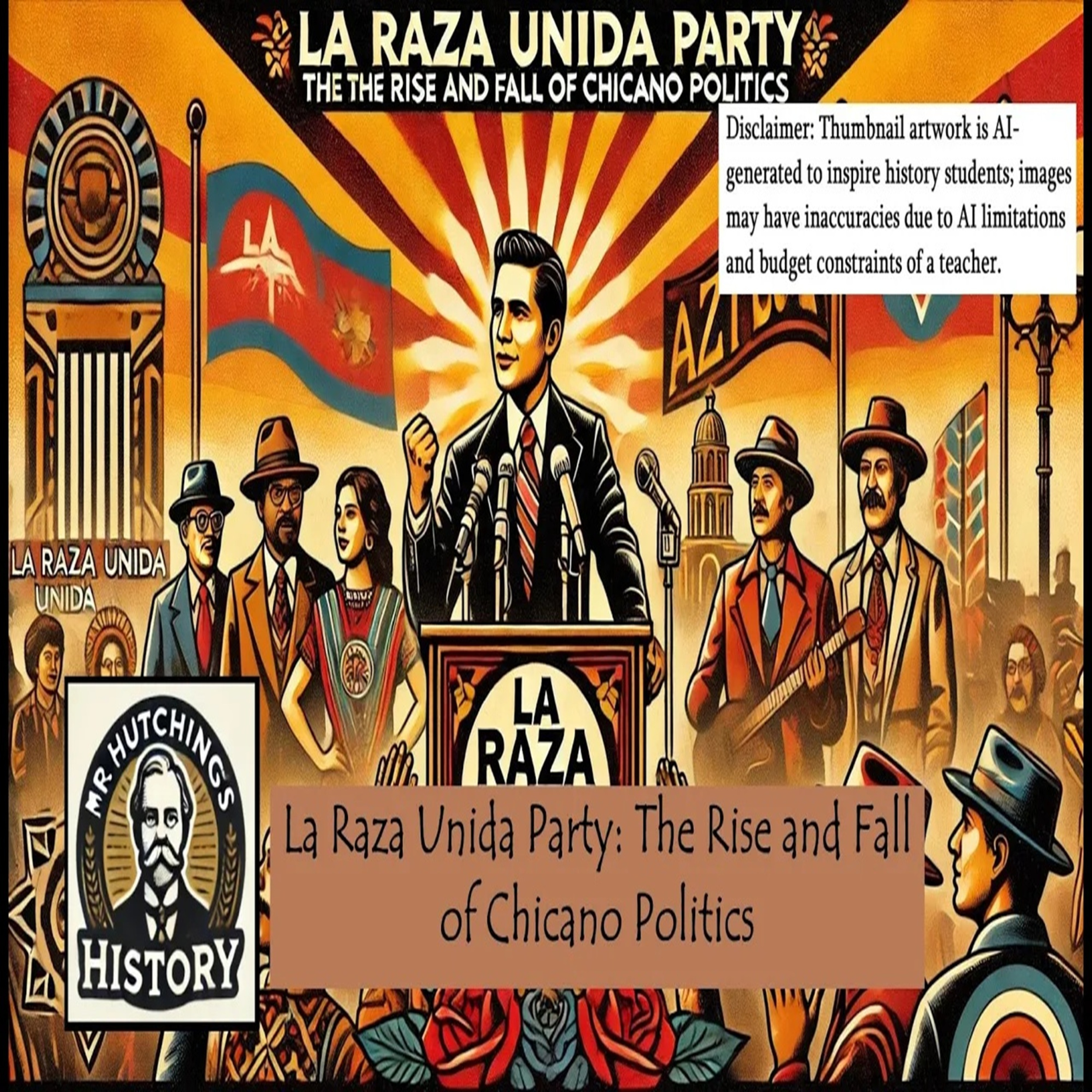 Mr. Hutchings HistoryLa Raza Unida Party: The Rise and Fall of Chicano PoliticsIn today’s episode of Mr. Hutchings History, we dive into the La Raza Unida Party (LRUP), a key political force in the Chicano civil rights movement. Founded in 1969, LRUP sought to address systemic inequality and increase Mexican-American political representation. Its early successes in Texas, where it secured local office wins and pushed for bilingual education, labor rights, and cultural pride, marked a major turning point in Chicano activism.
Despite its victories, internal divisions and political backlash led to the party’s decline by 1974. In this episode, we examine LRUP’s challenges, including its confrontational tactics, its strugg...2024-12-0922 min
Mr. Hutchings HistoryLa Raza Unida Party: The Rise and Fall of Chicano PoliticsIn today’s episode of Mr. Hutchings History, we dive into the La Raza Unida Party (LRUP), a key political force in the Chicano civil rights movement. Founded in 1969, LRUP sought to address systemic inequality and increase Mexican-American political representation. Its early successes in Texas, where it secured local office wins and pushed for bilingual education, labor rights, and cultural pride, marked a major turning point in Chicano activism.
Despite its victories, internal divisions and political backlash led to the party’s decline by 1974. In this episode, we examine LRUP’s challenges, including its confrontational tactics, its strugg...2024-12-0922 min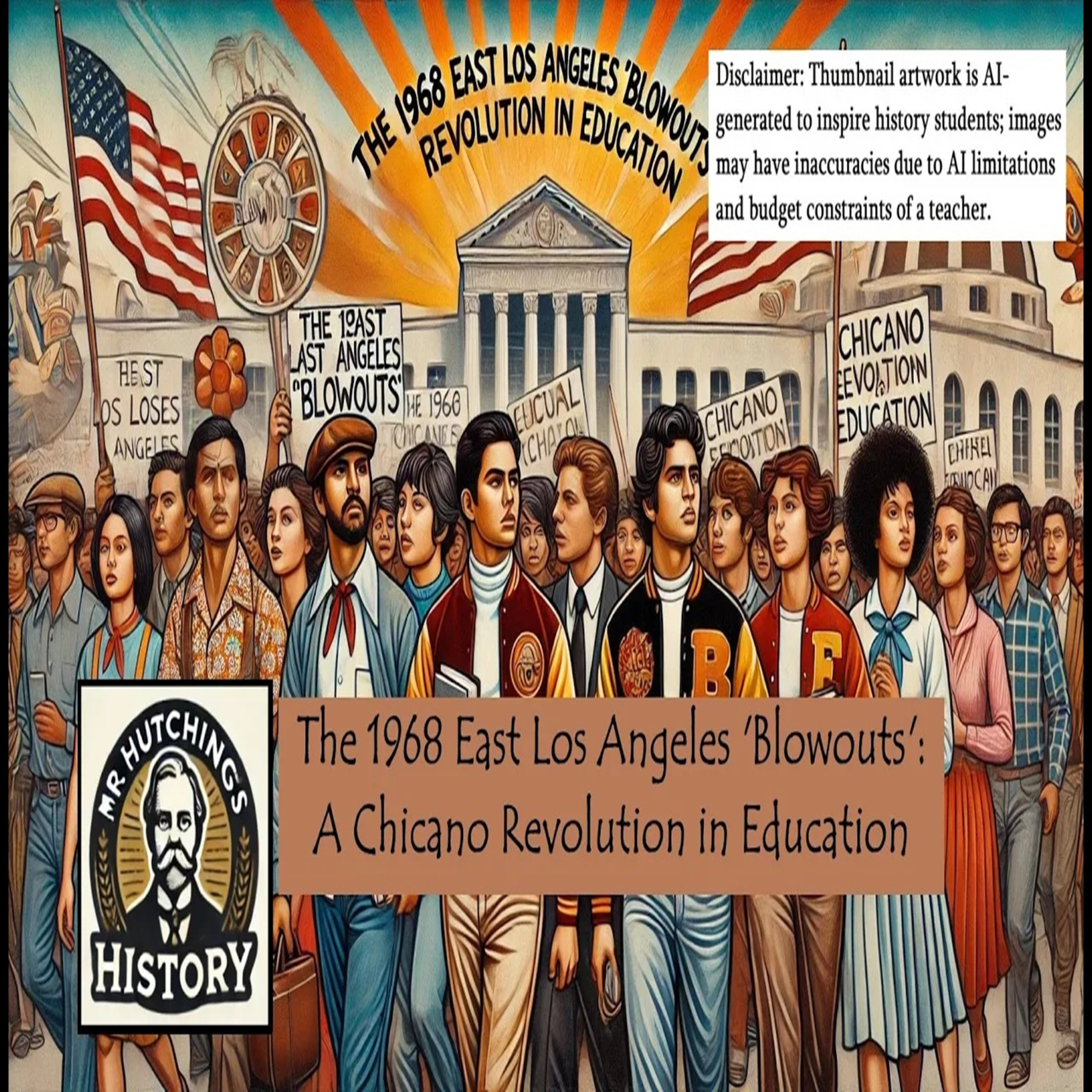 Mr. Hutchings HistoryThe 1968 East Los Angeles 'Blowouts': A Chicano Revolution in EducationIn this episode of Mr. Hutchings History, we explore the 1968 East Los Angeles "Blowouts," a landmark series of student walkouts that ignited the Chicano civil rights movement. These protests, driven by thousands of Mexican-American high school students, demanded educational reform, including access to college prep courses, bilingual education, and a curriculum that reflected Mexican-American history and culture.
The Blowouts not only exposed systemic discrimination in education but also helped redefine Chicano identity. The term "Chicano," once used disparagingly, was embraced as a symbol of pride and resistance. This episode delves into the motivations behind the student protests...2024-12-0912 min
Mr. Hutchings HistoryThe 1968 East Los Angeles 'Blowouts': A Chicano Revolution in EducationIn this episode of Mr. Hutchings History, we explore the 1968 East Los Angeles "Blowouts," a landmark series of student walkouts that ignited the Chicano civil rights movement. These protests, driven by thousands of Mexican-American high school students, demanded educational reform, including access to college prep courses, bilingual education, and a curriculum that reflected Mexican-American history and culture.
The Blowouts not only exposed systemic discrimination in education but also helped redefine Chicano identity. The term "Chicano," once used disparagingly, was embraced as a symbol of pride and resistance. This episode delves into the motivations behind the student protests...2024-12-0912 min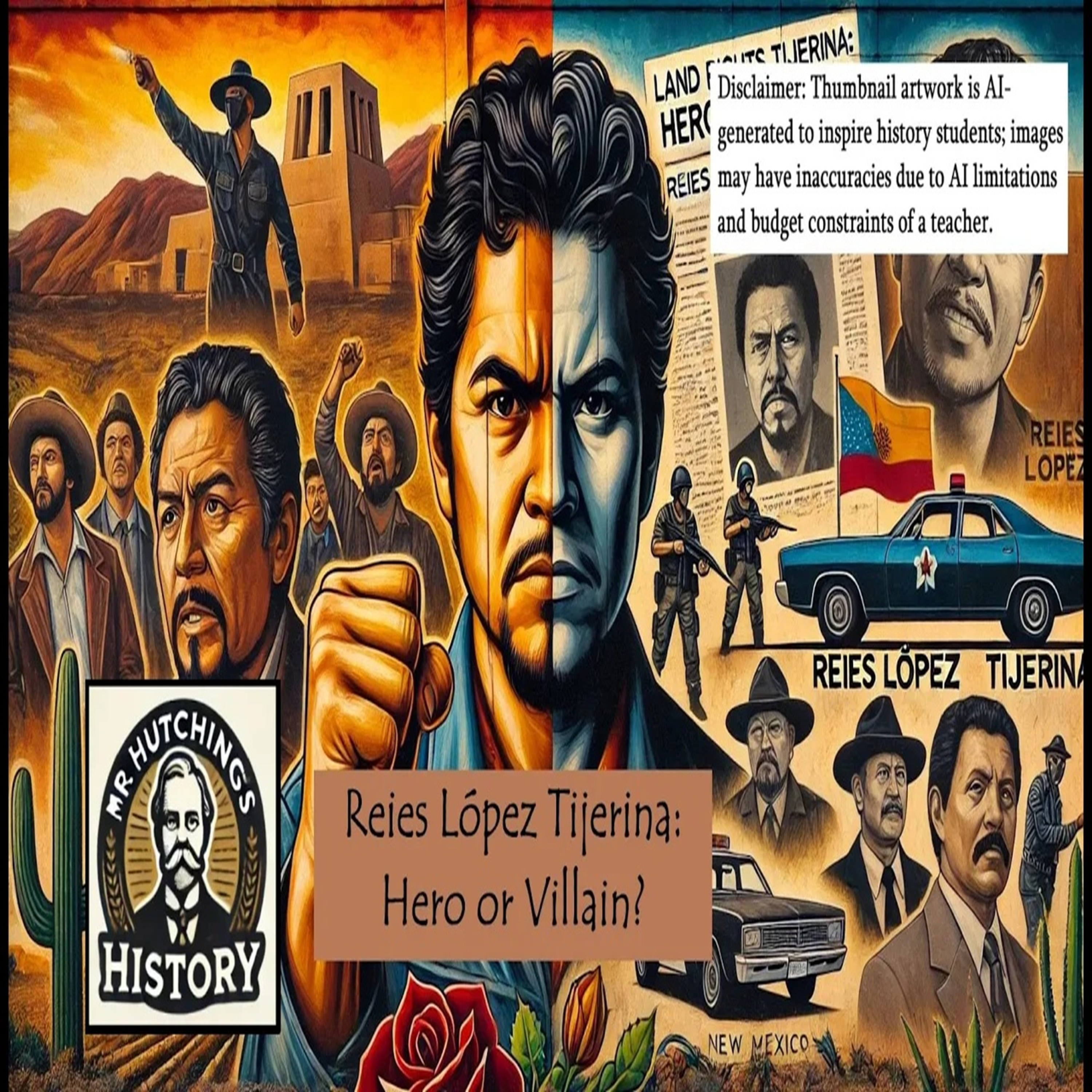 Mr. Hutchings HistoryReies López Tijerina: Hero or Villain?In this episode of Mr. Hutchings History, we delve into the complex legacy of Reies López Tijerina, a pivotal figure in the fight for land rights and self-determination for Hispanic and Indigenous communities in the American Southwest. Tijerina’s leadership of the Alianza Federal de Las Mercedes, aimed at reclaiming land taken under the Treaty of Guadalupe Hidalgo, made him a polarizing figure. Was he a hero who challenged systemic oppression, or a divisive militant whose methods alienated potential allies?
We explore key moments in Tijerina’s activism, such as the 1967 Rio Arriba County Courthouse raid and h...2024-12-0920 min
Mr. Hutchings HistoryReies López Tijerina: Hero or Villain?In this episode of Mr. Hutchings History, we delve into the complex legacy of Reies López Tijerina, a pivotal figure in the fight for land rights and self-determination for Hispanic and Indigenous communities in the American Southwest. Tijerina’s leadership of the Alianza Federal de Las Mercedes, aimed at reclaiming land taken under the Treaty of Guadalupe Hidalgo, made him a polarizing figure. Was he a hero who challenged systemic oppression, or a divisive militant whose methods alienated potential allies?
We explore key moments in Tijerina’s activism, such as the 1967 Rio Arriba County Courthouse raid and h...2024-12-0920 min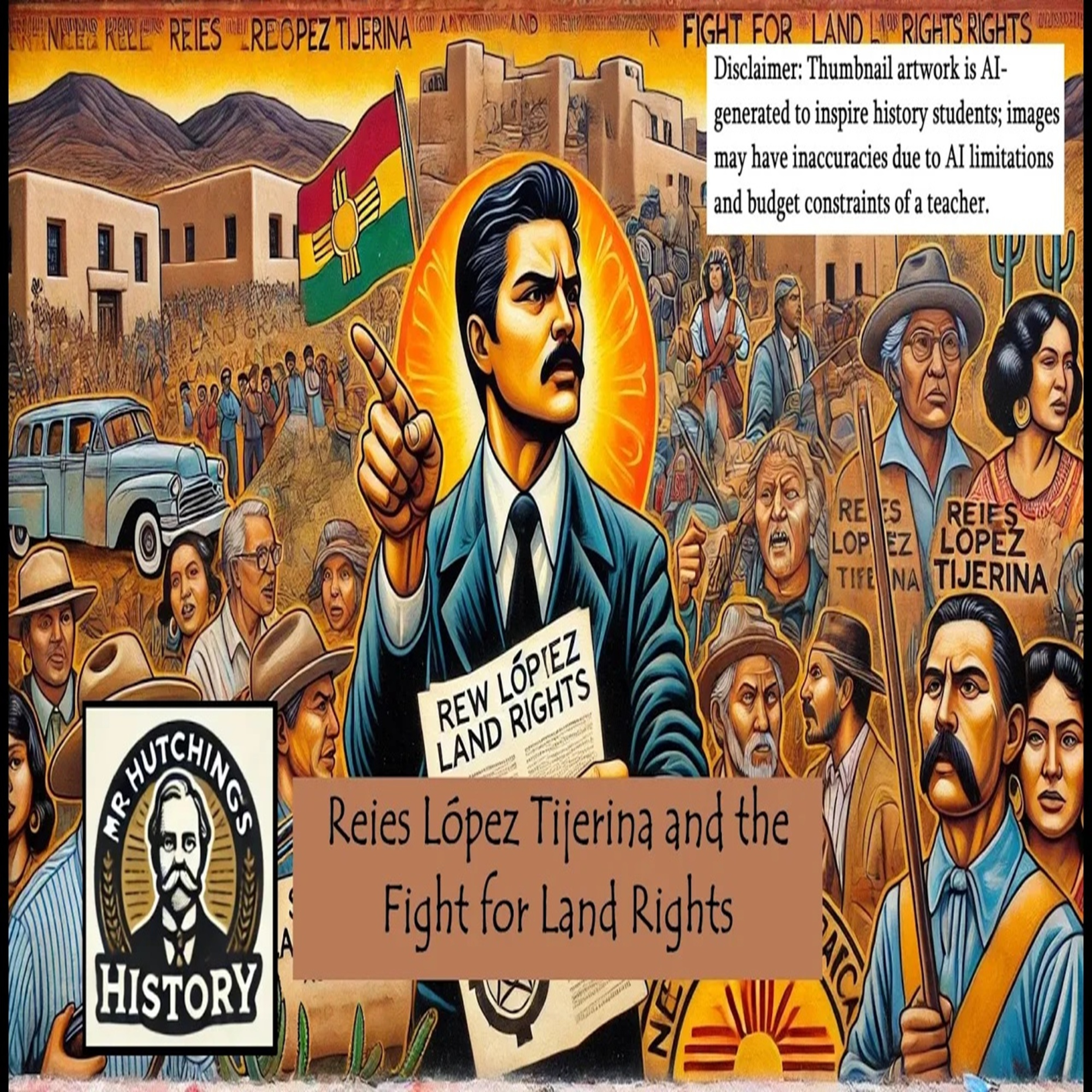 Mr. Hutchings HistoryReies López Tijerina and the Fight for Land RightsIn this episode of Mr. Hutchings History, we explore the life and legacy of Reies López Tijerina, a key figure in the fight for Hispanic land rights in the American Southwest. Tijerina’s work with the Alianza Federal de Las Mercedes (Federal Alliance of Land Grants) challenged U.S. government policies that disregarded the Treaty of Guadalupe Hidalgo, which had guaranteed land rights to Mexican citizens after the Mexican-American War.
Through legal battles, public protests, and direct action, Tijerina and his movement sought to reclaim lands that were illegally seized from Mexican and Indigenous communities. The 1966 Kit...2024-12-0911 min
Mr. Hutchings HistoryReies López Tijerina and the Fight for Land RightsIn this episode of Mr. Hutchings History, we explore the life and legacy of Reies López Tijerina, a key figure in the fight for Hispanic land rights in the American Southwest. Tijerina’s work with the Alianza Federal de Las Mercedes (Federal Alliance of Land Grants) challenged U.S. government policies that disregarded the Treaty of Guadalupe Hidalgo, which had guaranteed land rights to Mexican citizens after the Mexican-American War.
Through legal battles, public protests, and direct action, Tijerina and his movement sought to reclaim lands that were illegally seized from Mexican and Indigenous communities. The 1966 Kit...2024-12-0911 min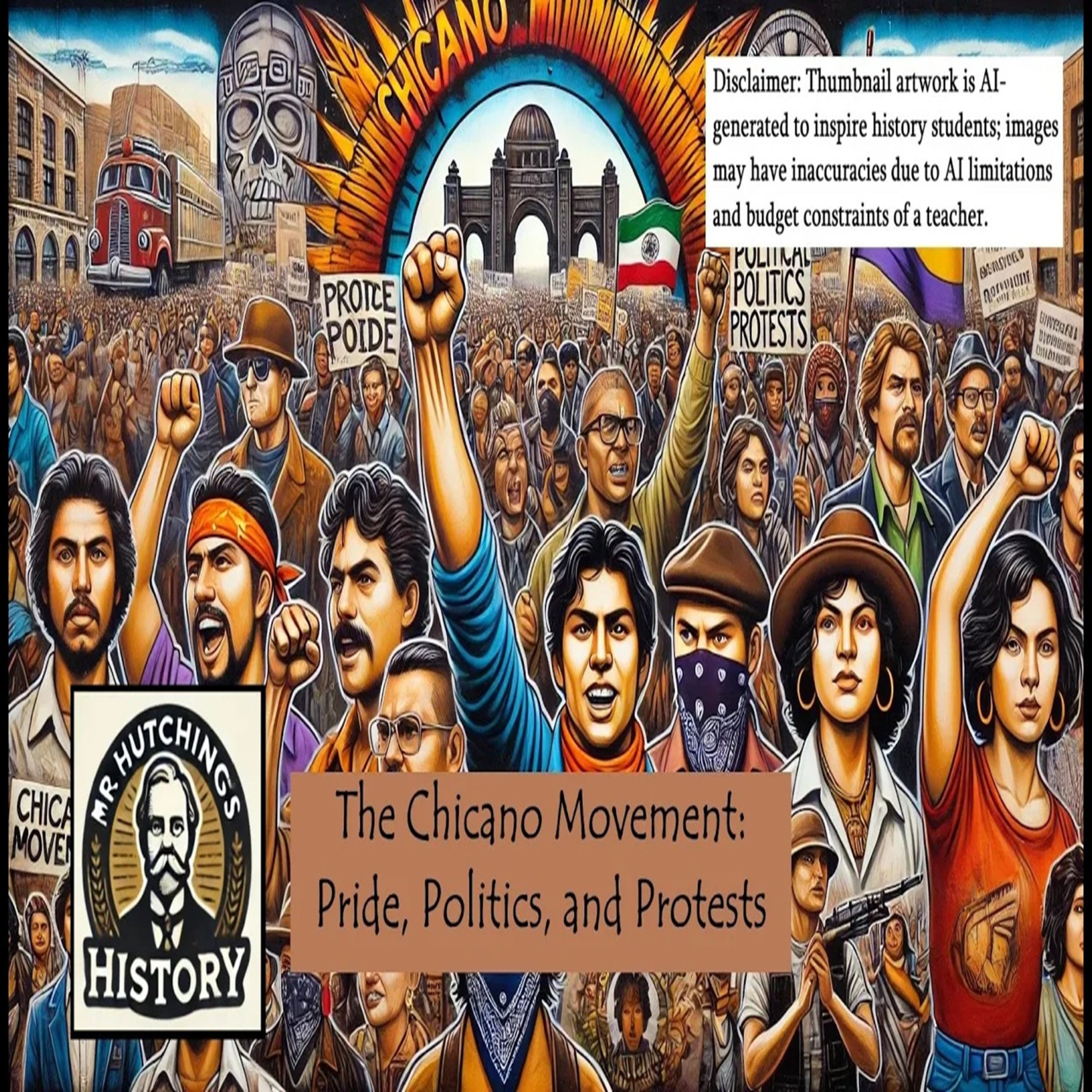 Mr. Hutchings HistoryThe Chicano Movement: Pride, Politics, and ProtestsIn this episode of Mr. Hutchings History, we explore the Chicano Movement, a powerful wave of activism that redefined Mexican-American identity, politics, and cultural pride in the 1960s and beyond. Rooted in struggles against systemic discrimination, the Chicano Movement rose from local battles for justice to national prominence, advocating for political representation, civil rights, and labor justice.
We dive into key events like the political awakening in Crystal City, Texas, where Tejano activists won a groundbreaking victory in 1963, and the formation of the La Raza Unida Party in 1970. Leaders such as César Chávez, Dolores Huerta, Jo...2024-12-0919 min
Mr. Hutchings HistoryThe Chicano Movement: Pride, Politics, and ProtestsIn this episode of Mr. Hutchings History, we explore the Chicano Movement, a powerful wave of activism that redefined Mexican-American identity, politics, and cultural pride in the 1960s and beyond. Rooted in struggles against systemic discrimination, the Chicano Movement rose from local battles for justice to national prominence, advocating for political representation, civil rights, and labor justice.
We dive into key events like the political awakening in Crystal City, Texas, where Tejano activists won a groundbreaking victory in 1963, and the formation of the La Raza Unida Party in 1970. Leaders such as César Chávez, Dolores Huerta, Jo...2024-12-0919 min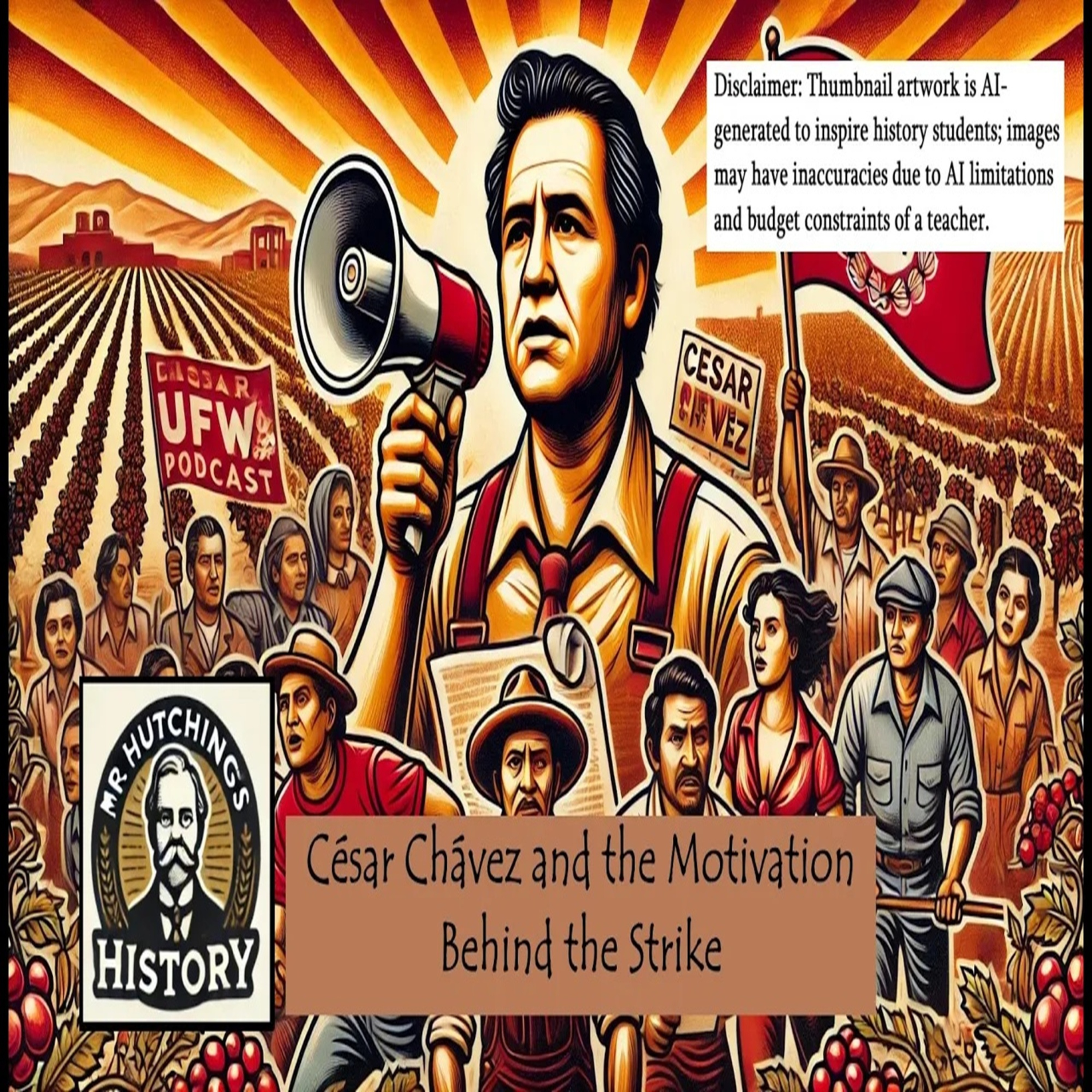 Mr. Hutchings HistoryCésar Chávez and the Motivation Behind the StrikeIn this episode of Mr. Hutchings History, we explore the motivations that drove the farmworker strikes led by César Chávez in the 1960s, focusing on his insights shared in his 1966 article The Organizer’s Tale. Chávez’s words reveal the deeper values that fueled the movement for farmworker rights, including a desire for dignity, justice, and cultural pride.
Through nonviolent resistance, Chávez and the United Farm Workers (UFW) brought national attention to the plight of agricultural laborers. The Delano Grape Strike (1965–1970), a pivotal moment in the movement, was more than just a fight for better...2024-12-0910 min
Mr. Hutchings HistoryCésar Chávez and the Motivation Behind the StrikeIn this episode of Mr. Hutchings History, we explore the motivations that drove the farmworker strikes led by César Chávez in the 1960s, focusing on his insights shared in his 1966 article The Organizer’s Tale. Chávez’s words reveal the deeper values that fueled the movement for farmworker rights, including a desire for dignity, justice, and cultural pride.
Through nonviolent resistance, Chávez and the United Farm Workers (UFW) brought national attention to the plight of agricultural laborers. The Delano Grape Strike (1965–1970), a pivotal moment in the movement, was more than just a fight for better...2024-12-0910 min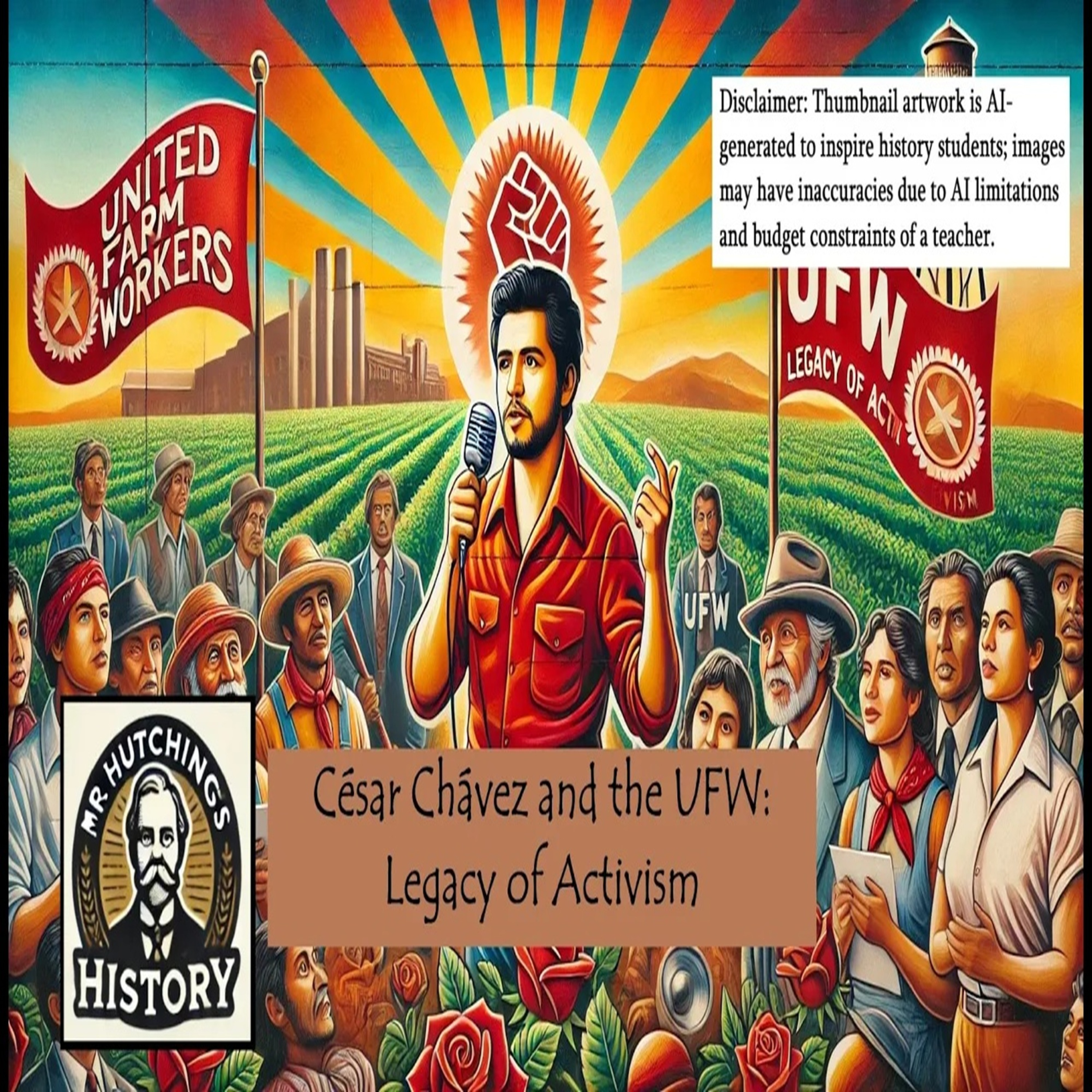 Mr. Hutchings HistoryCésar Chávez and the UFW: Legacy of ActivismIn this episode of Mr. Hutchings History, we delve into the life and legacy of César Chávez, the leader who transformed the lives of farmworkers in the U.S. through his work with the United Farm Workers (UFW). Chávez's nonviolent resistance and leadership during the Delano Grape Strike (1965–1970) brought national attention to the exploitation of farmworkers and led to significant labor reforms.
His work not only improved wages and working conditions for farmworkers but also inspired a new wave of activism within the Mexican-American community. Chávez’s focus on cultural pride, unity, and nonviole...2024-12-0920 min
Mr. Hutchings HistoryCésar Chávez and the UFW: Legacy of ActivismIn this episode of Mr. Hutchings History, we delve into the life and legacy of César Chávez, the leader who transformed the lives of farmworkers in the U.S. through his work with the United Farm Workers (UFW). Chávez's nonviolent resistance and leadership during the Delano Grape Strike (1965–1970) brought national attention to the exploitation of farmworkers and led to significant labor reforms.
His work not only improved wages and working conditions for farmworkers but also inspired a new wave of activism within the Mexican-American community. Chávez’s focus on cultural pride, unity, and nonviole...2024-12-0920 min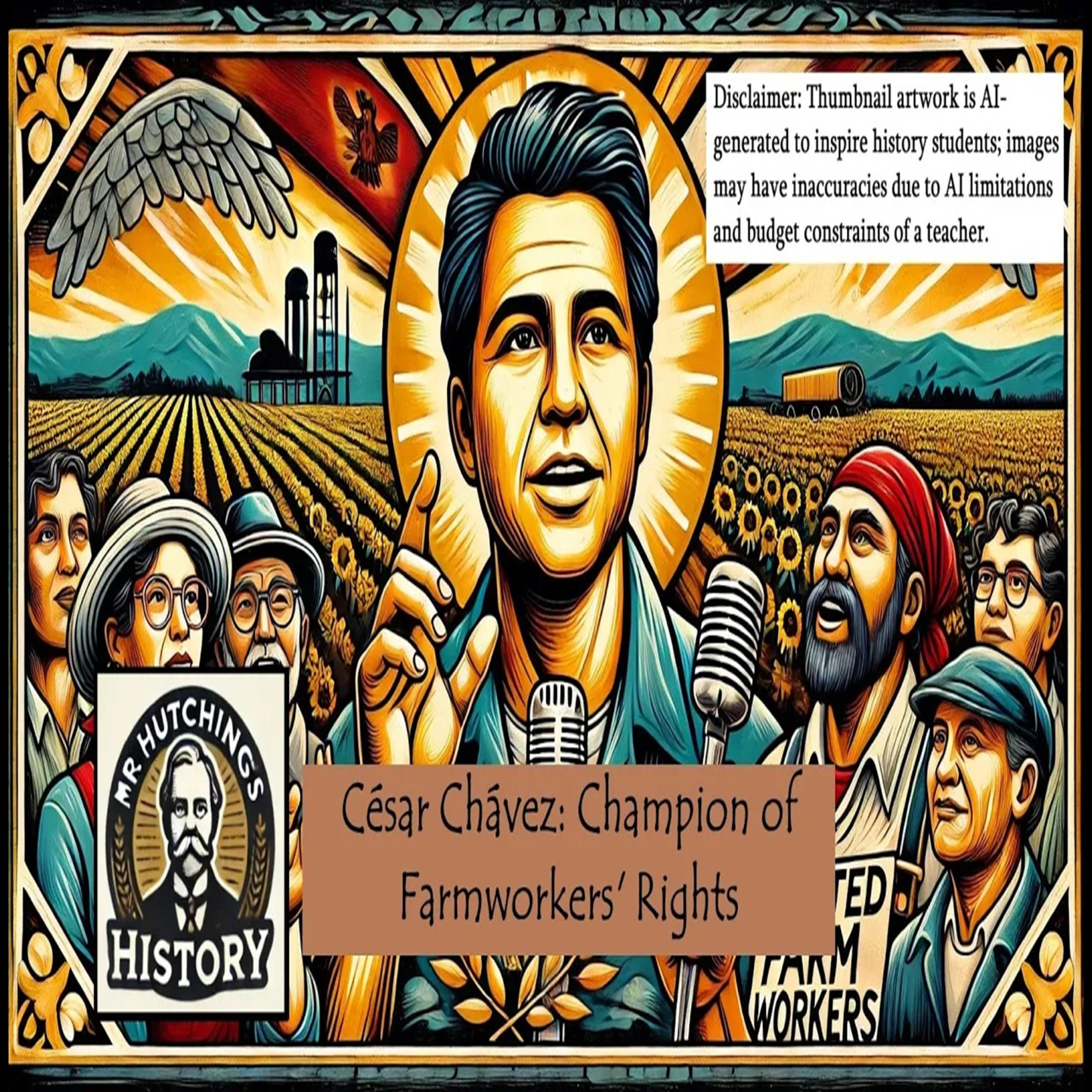 Mr. Hutchings HistoryCésar Chávez: Champion of Farmworkers' RightsIn this episode of Mr. Hutchings History, we examine the life and legacy of César Chávez, a pivotal figure in the Hispanic American civil rights movement. Chávez’s leadership of the United Farm Workers (UFW) revolutionized labor rights and brought national attention to the exploitation of farmworkers, primarily Mexican-Americans and Filipino-Americans, in the U.S. agricultural sector.
Chávez’s commitment to nonviolent resistance, inspired by Mahatma Gandhi and Dr. Martin Luther King Jr., led to key events like the Delano Grape Strike and the nationwide grape boycott (1965–1970), which garnered support from millions of Americans...2024-12-0725 min
Mr. Hutchings HistoryCésar Chávez: Champion of Farmworkers' RightsIn this episode of Mr. Hutchings History, we examine the life and legacy of César Chávez, a pivotal figure in the Hispanic American civil rights movement. Chávez’s leadership of the United Farm Workers (UFW) revolutionized labor rights and brought national attention to the exploitation of farmworkers, primarily Mexican-Americans and Filipino-Americans, in the U.S. agricultural sector.
Chávez’s commitment to nonviolent resistance, inspired by Mahatma Gandhi and Dr. Martin Luther King Jr., led to key events like the Delano Grape Strike and the nationwide grape boycott (1965–1970), which garnered support from millions of Americans...2024-12-0725 min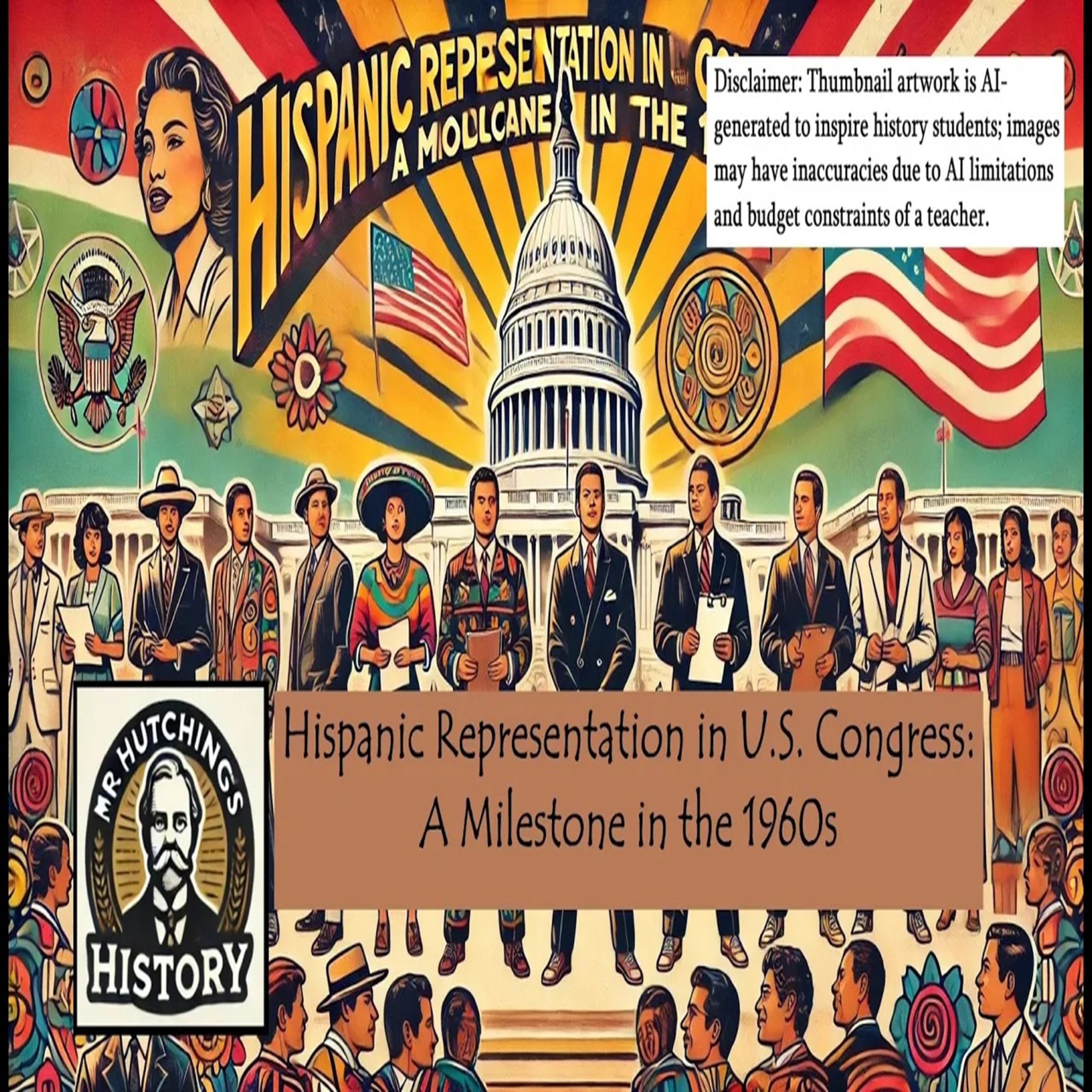 Mr. Hutchings HistoryHispanic Representation in U.S. Congress: A Milestone in the 1960sIn this episode of Mr. Hutchings History, we explore the rise of Hispanic representation in the U.S. Congress during the 1960s. The decade marked a significant shift as Mexican-American and Hispanic leaders broke barriers and took political office, forever changing the landscape of American politics. We focus on key figures such as Henry B. González, Edward Roybal, Joseph Manuel Montoya, and Manuel Luján Jr., who became trailblazers in the fight for civil rights, healthcare, education, and immigrant rights.
This lecture covers:
The political marginalization of Hispanic-Americans before the 1960s.
The impact of the Vo...2024-12-0721 min
Mr. Hutchings HistoryHispanic Representation in U.S. Congress: A Milestone in the 1960sIn this episode of Mr. Hutchings History, we explore the rise of Hispanic representation in the U.S. Congress during the 1960s. The decade marked a significant shift as Mexican-American and Hispanic leaders broke barriers and took political office, forever changing the landscape of American politics. We focus on key figures such as Henry B. González, Edward Roybal, Joseph Manuel Montoya, and Manuel Luján Jr., who became trailblazers in the fight for civil rights, healthcare, education, and immigrant rights.
This lecture covers:
The political marginalization of Hispanic-Americans before the 1960s.
The impact of the Vo...2024-12-0721 min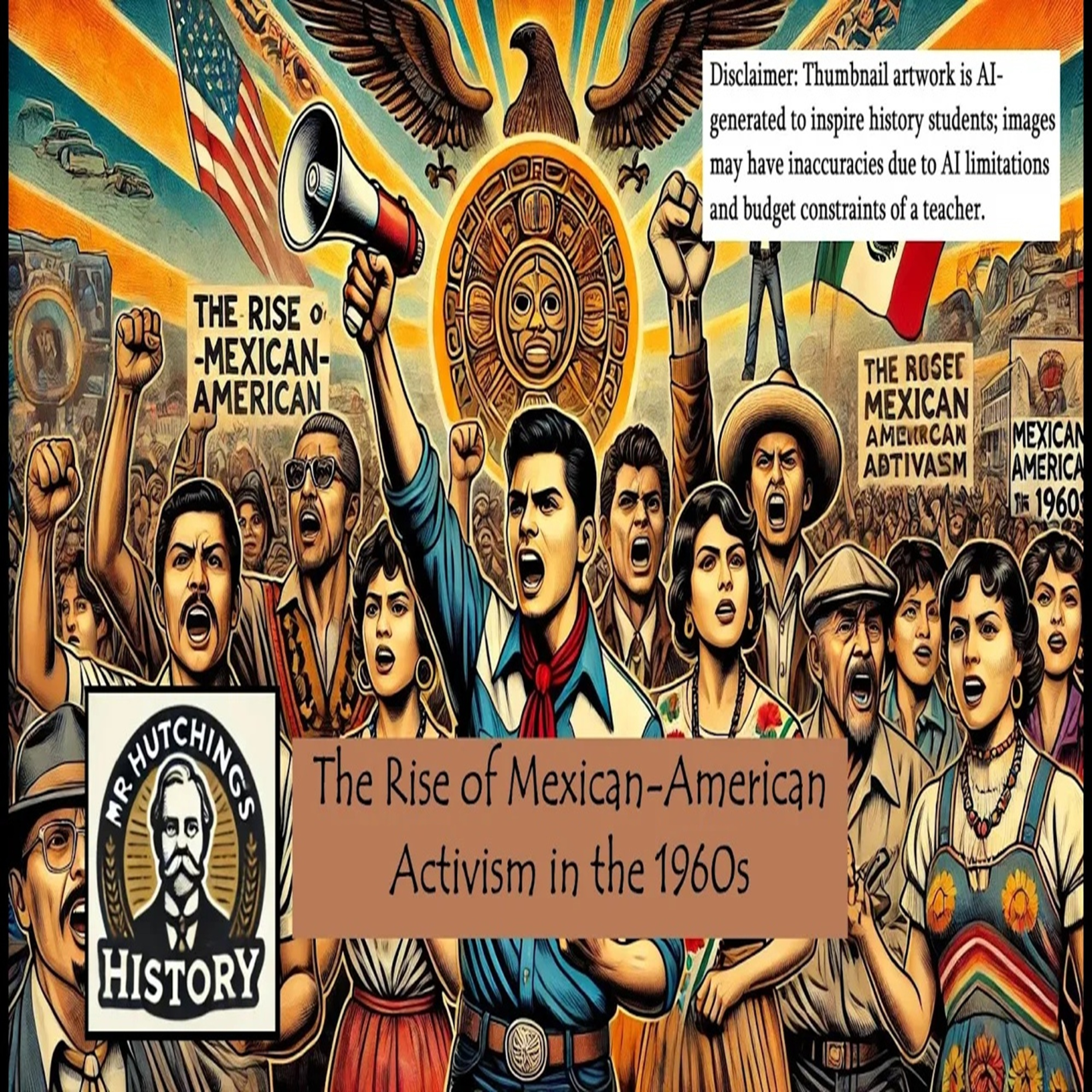 Mr. Hutchings HistoryThe Rise of Mexican-American Activism in the 1960sIn this episode of Mr. Hutchings History, we explore the rise of Mexican-American activism in the 1960s, a pivotal period in the fight for civil rights and equality. Mexican-Americans, inspired by the successes of the Black Civil Rights Movement, embraced a more militant stance against systemic discrimination. Key figures like César Chávez and Dolores Huerta led the United Farm Workers (UFW) to victory in the Delano Grape Strike, securing better wages and working conditions for farmworkers. The Chicano Movement also emerged, emphasizing cultural pride and self-determination, with leaders like Rodolfo "Corky" Gonzales promoting the concept of "Chicanismo."...2024-12-0714 min
Mr. Hutchings HistoryThe Rise of Mexican-American Activism in the 1960sIn this episode of Mr. Hutchings History, we explore the rise of Mexican-American activism in the 1960s, a pivotal period in the fight for civil rights and equality. Mexican-Americans, inspired by the successes of the Black Civil Rights Movement, embraced a more militant stance against systemic discrimination. Key figures like César Chávez and Dolores Huerta led the United Farm Workers (UFW) to victory in the Delano Grape Strike, securing better wages and working conditions for farmworkers. The Chicano Movement also emerged, emphasizing cultural pride and self-determination, with leaders like Rodolfo "Corky" Gonzales promoting the concept of "Chicanismo."...2024-12-0714 min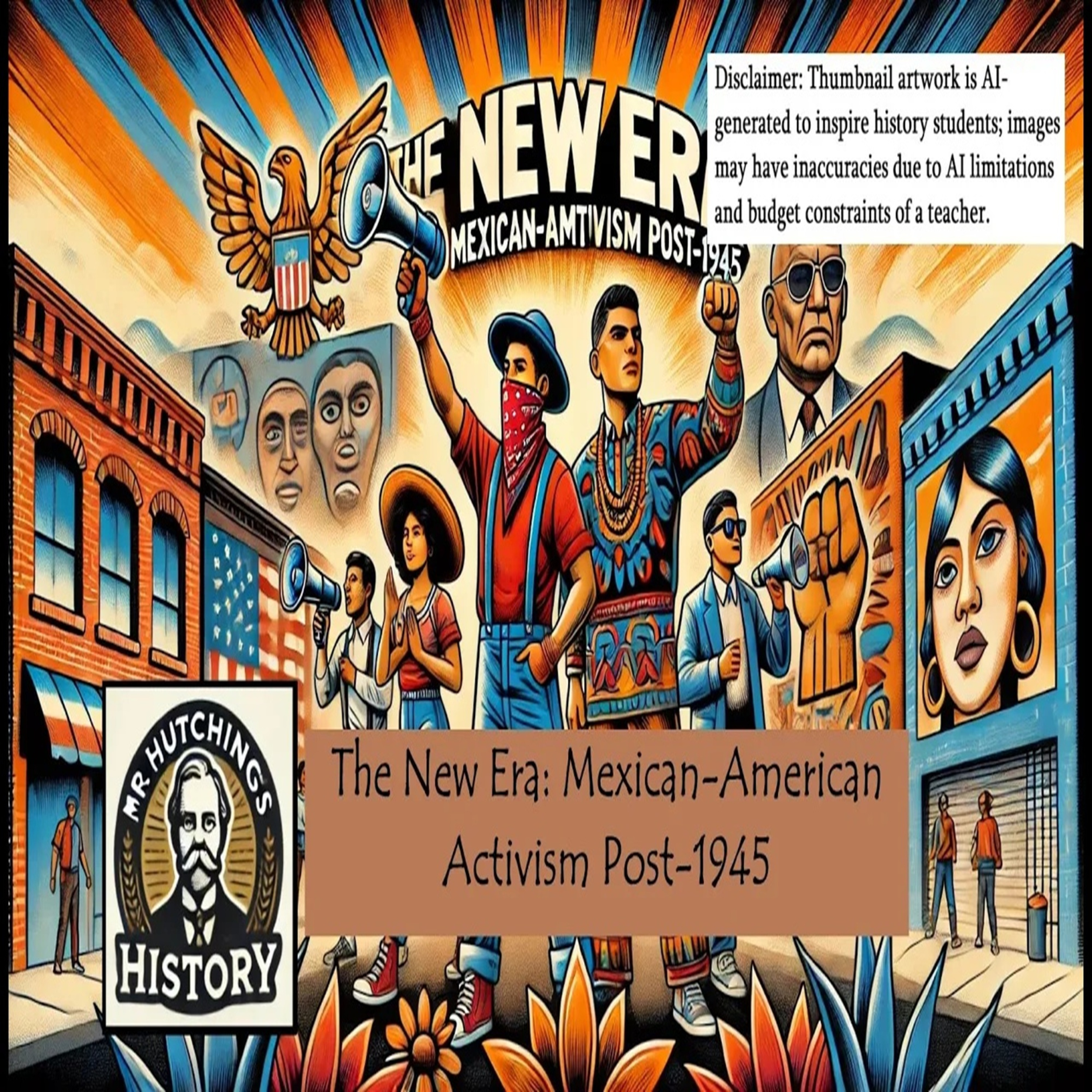 Mr. Hutchings HistoryThe New Era: Mexican-American Activism Post-1945In this episode of Mr. Hutchings History, we explore the rise of Mexican-American activism after 1945, focusing on key events, legal victories, and influential organizations that shaped the fight for civil rights. This period marks a pivotal moment in Mexican-American history, driven by military service, grassroots organizing, and a political awakening.
Key themes include:
World War II Impact: Mexican-American veterans and the racism they faced upon returning home, catalyzing activism.
The GI Forum: Dr. Hector P. Garcia’s founding of the American GI Forum and the Felix Longoria Affair, highlighting systemic discrimination.
LULAC’s Role: Legal battles and...2024-12-0713 min
Mr. Hutchings HistoryThe New Era: Mexican-American Activism Post-1945In this episode of Mr. Hutchings History, we explore the rise of Mexican-American activism after 1945, focusing on key events, legal victories, and influential organizations that shaped the fight for civil rights. This period marks a pivotal moment in Mexican-American history, driven by military service, grassroots organizing, and a political awakening.
Key themes include:
World War II Impact: Mexican-American veterans and the racism they faced upon returning home, catalyzing activism.
The GI Forum: Dr. Hector P. Garcia’s founding of the American GI Forum and the Felix Longoria Affair, highlighting systemic discrimination.
LULAC’s Role: Legal battles and...2024-12-0713 min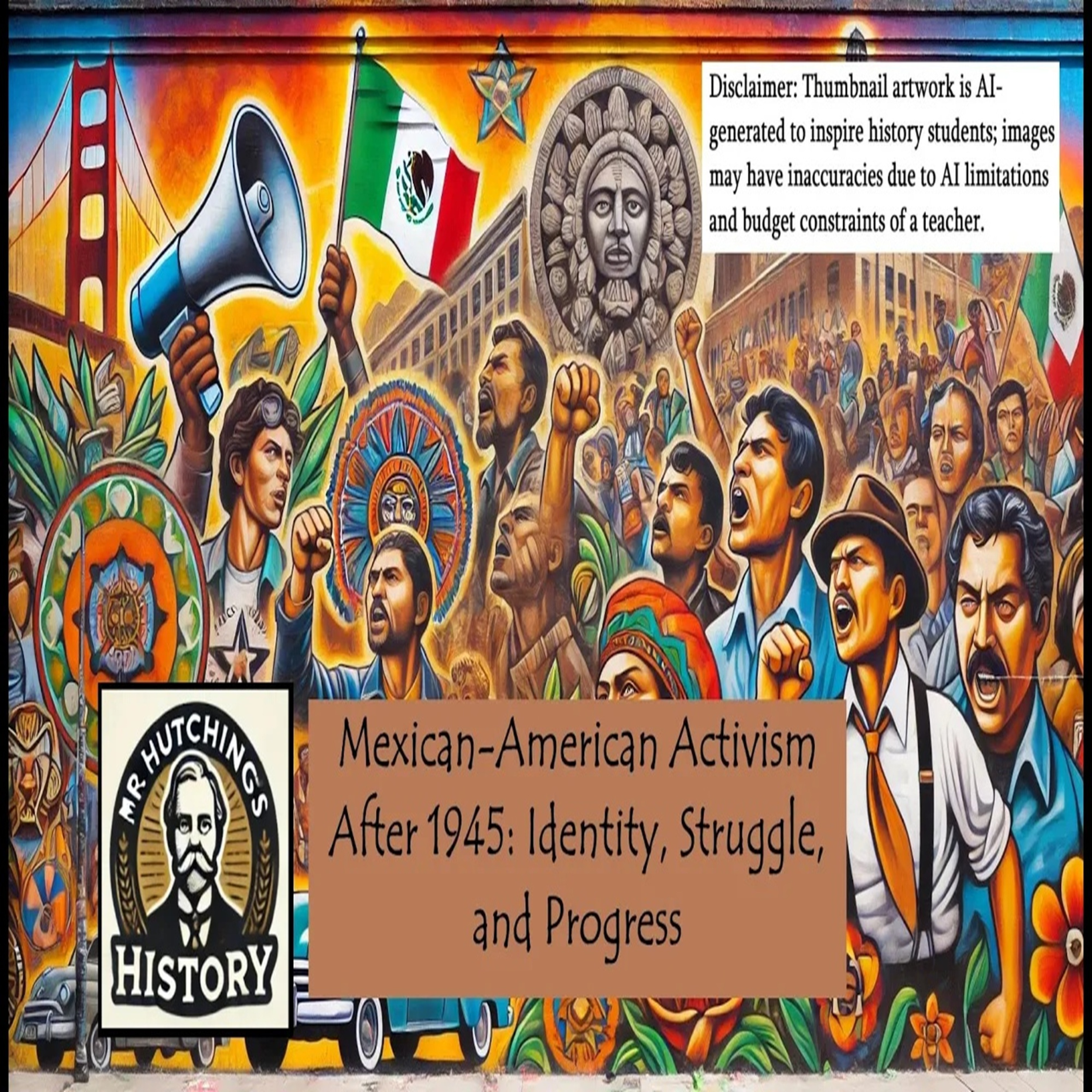 Mr. Hutchings HistoryMexican-American Activism After 1945: Identity, Struggle, and ProgressIn this episode of Mr. Hutchings History, we explore the history of Mexican-American activism after 1945, highlighting the evolving strategies and efforts to secure equality in the face of systemic oppression. From the early legal challenges and civil rights victories to the rise of the Chicano Movement, Mexican-Americans fought for social, economic, and political equality in the United States.
Key themes include:
Early Activism: The role of organizations like LULAC and the GI Forum in advocating for Mexican-American civil rights.
World War II Impact: The Zoot Suit Riots and the effects of the Bracero Program on identity...2024-12-0718 min
Mr. Hutchings HistoryMexican-American Activism After 1945: Identity, Struggle, and ProgressIn this episode of Mr. Hutchings History, we explore the history of Mexican-American activism after 1945, highlighting the evolving strategies and efforts to secure equality in the face of systemic oppression. From the early legal challenges and civil rights victories to the rise of the Chicano Movement, Mexican-Americans fought for social, economic, and political equality in the United States.
Key themes include:
Early Activism: The role of organizations like LULAC and the GI Forum in advocating for Mexican-American civil rights.
World War II Impact: The Zoot Suit Riots and the effects of the Bracero Program on identity...2024-12-0718 min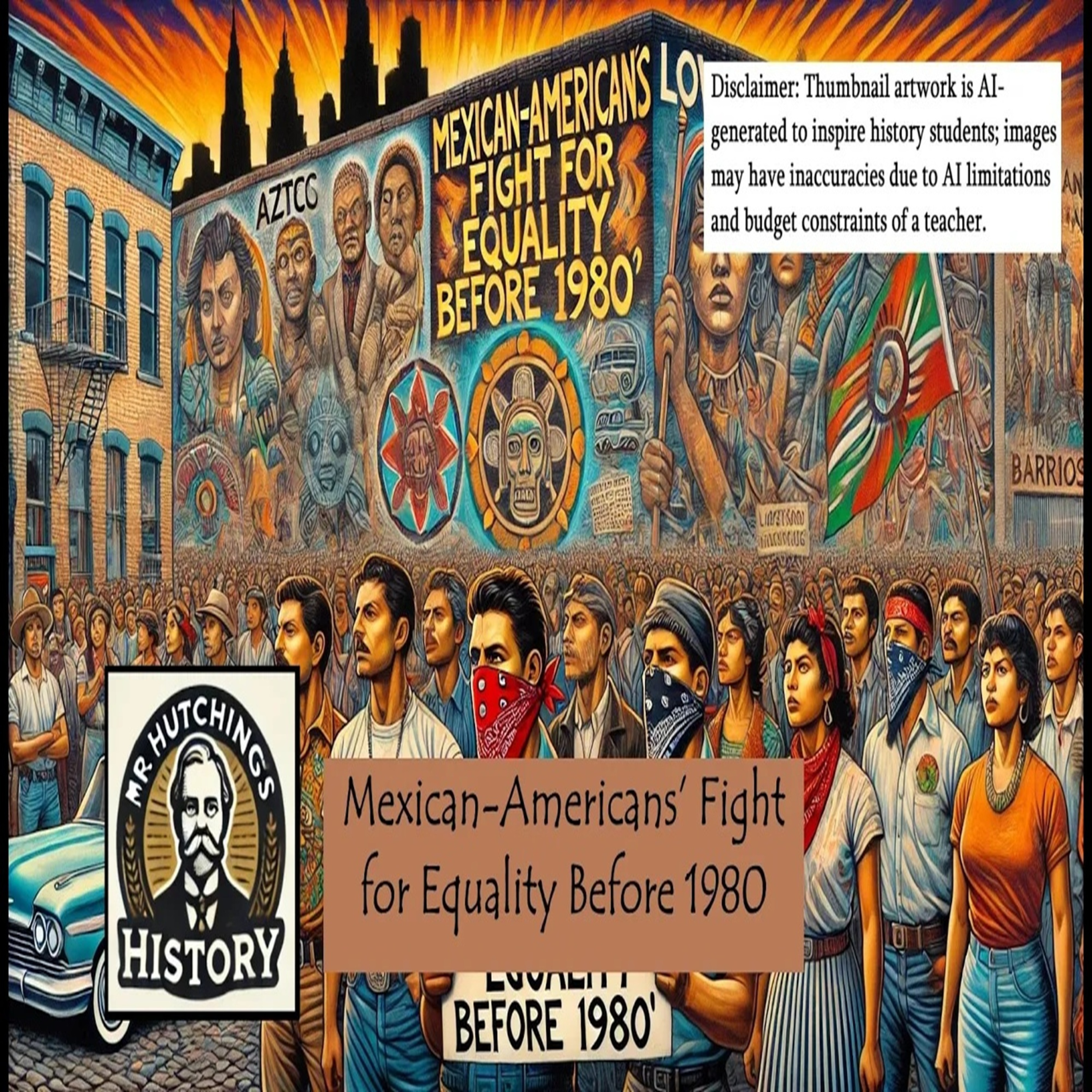 Mr. Hutchings HistoryMexican-Americans’ Fight for Equality Before 1980In this episode of Mr. Hutchings History, we explore the pivotal journey of Mexican-Americans' fight for equality before 1980, navigating systemic racism, labor struggles, and legal challenges. From the Treaty of Guadalupe Hidalgo to grassroots activism, this lecture highlights key milestones in the Mexican-American civil rights movement, emphasizing their resilience and the role of leaders like César Chávez and Dolores Huerta.
Key topics include:
Legal Challenges: The landmark Mendez v. Westminster case and the rise of the League of United Latin American Citizens (LULAC) in fighting school segregation and securing voting rights.
Labor Activism: César...2024-12-0714 min
Mr. Hutchings HistoryMexican-Americans’ Fight for Equality Before 1980In this episode of Mr. Hutchings History, we explore the pivotal journey of Mexican-Americans' fight for equality before 1980, navigating systemic racism, labor struggles, and legal challenges. From the Treaty of Guadalupe Hidalgo to grassroots activism, this lecture highlights key milestones in the Mexican-American civil rights movement, emphasizing their resilience and the role of leaders like César Chávez and Dolores Huerta.
Key topics include:
Legal Challenges: The landmark Mendez v. Westminster case and the rise of the League of United Latin American Citizens (LULAC) in fighting school segregation and securing voting rights.
Labor Activism: César...2024-12-0714 min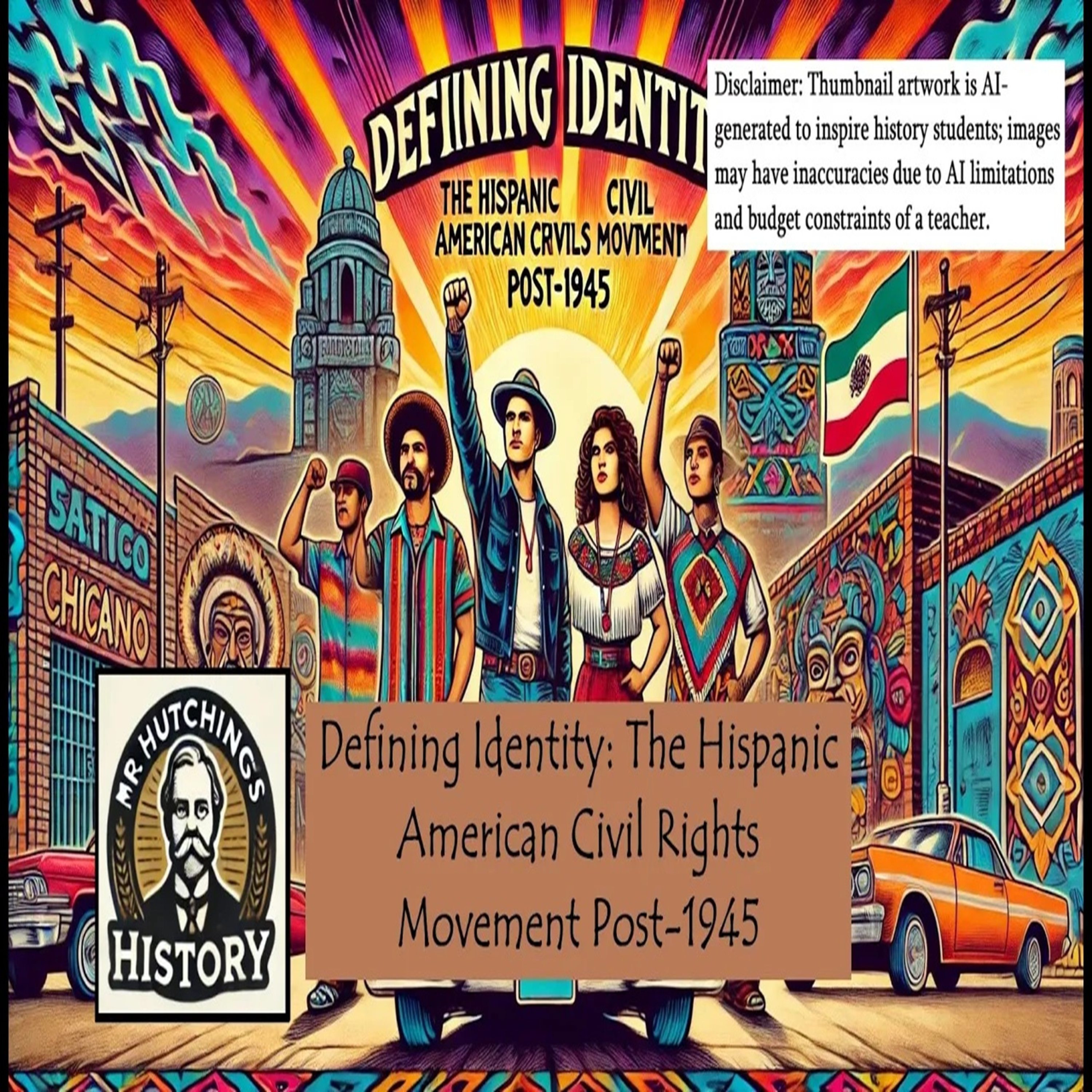 Mr. Hutchings HistoryDefining Identity: The Hispanic American Civil Rights Movement Post-1945In today’s episode of Mr. Hutchings History, we explore the multifaceted journey of the Hispanic American civil rights movement, focusing on how different communities—Mexican-American, Puerto Rican, and Cuban-American—fought for equality and justice in the post-1945 era. From legal battles to radical activism, we analyze the impact of identity, culture, and immigration on the civil rights struggle.
Key topics include:
Mexican-American Activism: Landmark legal victories like Mendez v. Westminster and the role of César Chávez and Dolores Huerta in organizing farmworkers and advocating for economic rights.
Puerto Rican Advocacy: The rise of the Youn...2024-12-0715 min
Mr. Hutchings HistoryDefining Identity: The Hispanic American Civil Rights Movement Post-1945In today’s episode of Mr. Hutchings History, we explore the multifaceted journey of the Hispanic American civil rights movement, focusing on how different communities—Mexican-American, Puerto Rican, and Cuban-American—fought for equality and justice in the post-1945 era. From legal battles to radical activism, we analyze the impact of identity, culture, and immigration on the civil rights struggle.
Key topics include:
Mexican-American Activism: Landmark legal victories like Mendez v. Westminster and the role of César Chávez and Dolores Huerta in organizing farmworkers and advocating for economic rights.
Puerto Rican Advocacy: The rise of the Youn...2024-12-0715 min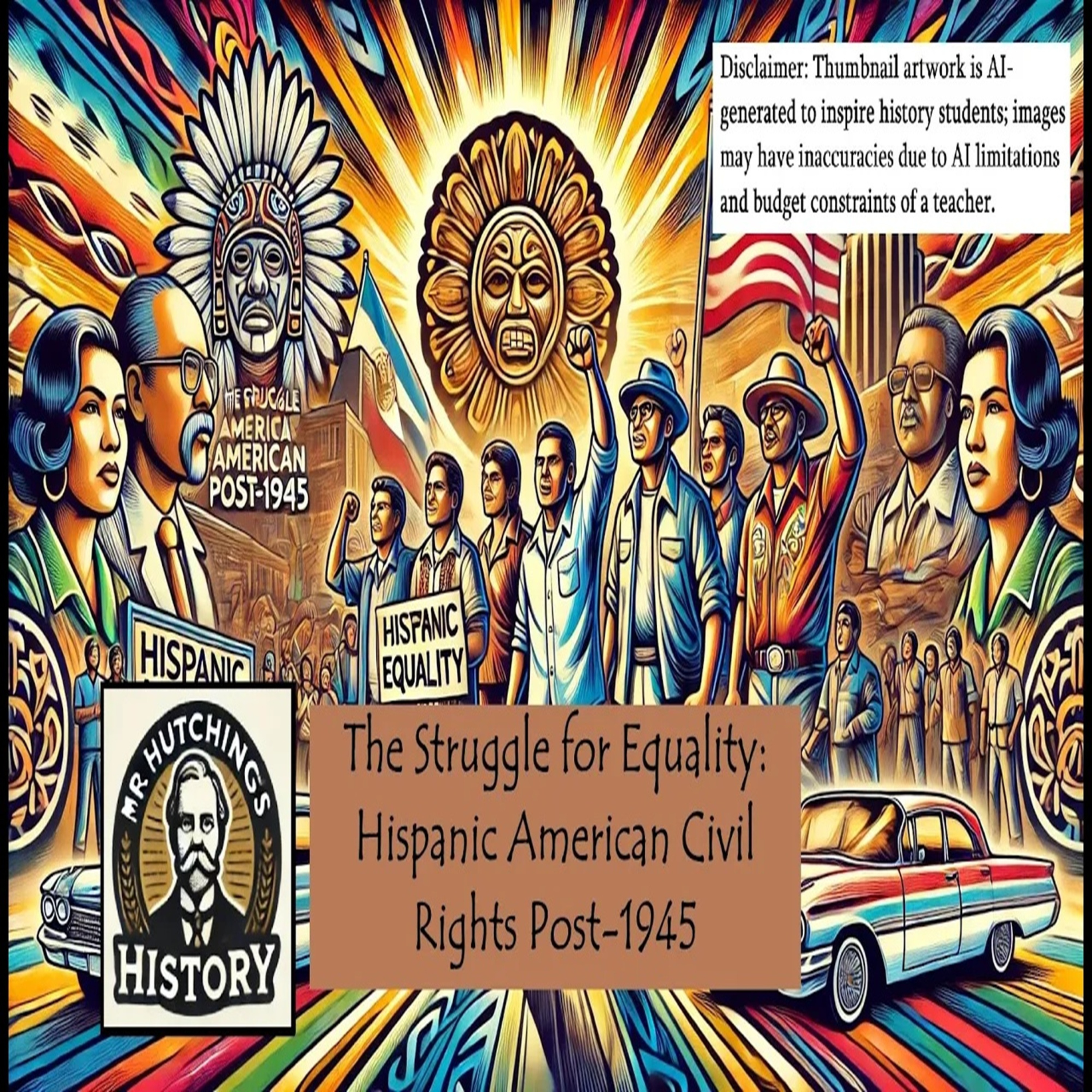 Mr. Hutchings HistoryThe Struggle for Equality: Hispanic American Civil Rights Post-1945In this episode of Mr. Hutchings History, we explore the transformative journey of Hispanic American civil rights movements in the United States, focusing on their post-World War II struggles for equality and justice. From Mexican-American labor activism to Puerto Rican advocacy and political participation, we trace the milestones and setbacks faced by Hispanic communities.
Key topics covered:
Mexican-American Resistance: The rise of organizations like the GI Forum and LULAC, and the pivotal impact of César Chávez and Dolores Huerta in the United Farm Workers’ campaigns.
Puerto Rican Advocacy: The emergence of the Young Lords Orga...2024-12-0725 min
Mr. Hutchings HistoryThe Struggle for Equality: Hispanic American Civil Rights Post-1945In this episode of Mr. Hutchings History, we explore the transformative journey of Hispanic American civil rights movements in the United States, focusing on their post-World War II struggles for equality and justice. From Mexican-American labor activism to Puerto Rican advocacy and political participation, we trace the milestones and setbacks faced by Hispanic communities.
Key topics covered:
Mexican-American Resistance: The rise of organizations like the GI Forum and LULAC, and the pivotal impact of César Chávez and Dolores Huerta in the United Farm Workers’ campaigns.
Puerto Rican Advocacy: The emergence of the Young Lords Orga...2024-12-0725 min Mr. Hutchings HistoryFeminism: Goals, Conflicts, and Historical PerspectivesIn this episode of Mr. Hutchings' History, we dive deep into the complex and evolving landscape of feminism, exploring the various schools of thought and ideologies that have shaped the movement. From the early calls for equality by Mary Wollstonecraft to the radical transformations advocated by figures like Shulamith Firestone, we analyze how feminism’s goals have evolved over time. We’ll examine key feminist schools, including liberal, radical, socialist, and cultural feminism, and explore their differing perspectives on abortion access, reproductive rights, and the role of women in society.
The episode covers:
The historical origins of f...2024-12-0522 min
Mr. Hutchings HistoryFeminism: Goals, Conflicts, and Historical PerspectivesIn this episode of Mr. Hutchings' History, we dive deep into the complex and evolving landscape of feminism, exploring the various schools of thought and ideologies that have shaped the movement. From the early calls for equality by Mary Wollstonecraft to the radical transformations advocated by figures like Shulamith Firestone, we analyze how feminism’s goals have evolved over time. We’ll examine key feminist schools, including liberal, radical, socialist, and cultural feminism, and explore their differing perspectives on abortion access, reproductive rights, and the role of women in society.
The episode covers:
The historical origins of f...2024-12-0522 min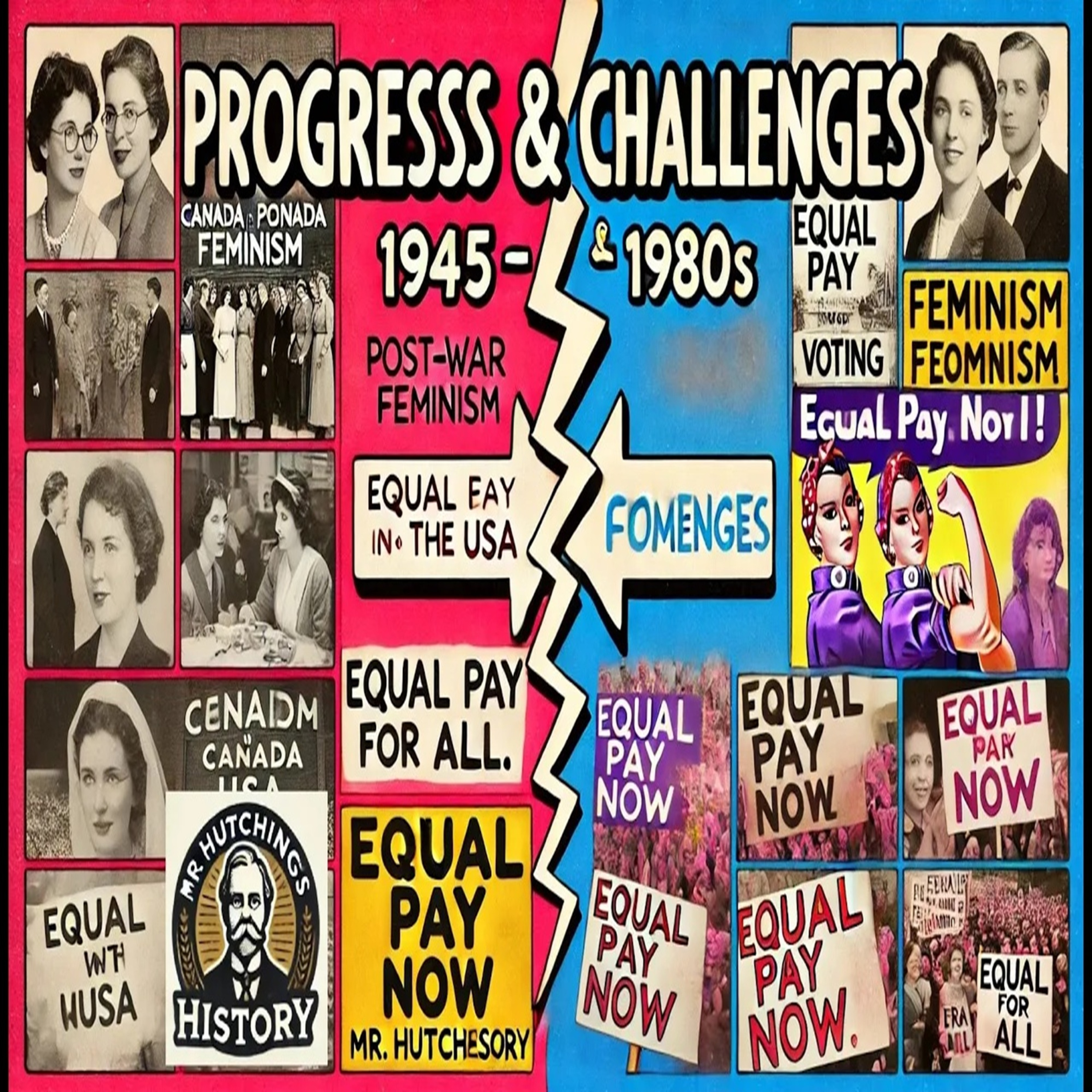 Mr. Hutchings HistoryProgress and Challenges: The Feminist Movements in Canada and the USA, 1945-1980sIn this episode of Mr. Hutchings' History, we explore the evolving feminist movements in Canada and the United States from the post-World War II era to the 1980s. These decades saw significant strides in reproductive rights, employment equality, and political representation, yet were also met with growing opposition. We’ll examine pivotal moments like the passage of the Equal Rights Amendment (ERA), the landmark Roe v. Wade decision, and the Royal Commission on the Status of Women in Canada. Despite legal victories, barriers such as the conservative backlash, wage disparities, and limited access to reproductive healthcare highlighted the ongoing ch...2024-12-0425 min
Mr. Hutchings HistoryProgress and Challenges: The Feminist Movements in Canada and the USA, 1945-1980sIn this episode of Mr. Hutchings' History, we explore the evolving feminist movements in Canada and the United States from the post-World War II era to the 1980s. These decades saw significant strides in reproductive rights, employment equality, and political representation, yet were also met with growing opposition. We’ll examine pivotal moments like the passage of the Equal Rights Amendment (ERA), the landmark Roe v. Wade decision, and the Royal Commission on the Status of Women in Canada. Despite legal victories, barriers such as the conservative backlash, wage disparities, and limited access to reproductive healthcare highlighted the ongoing ch...2024-12-0425 min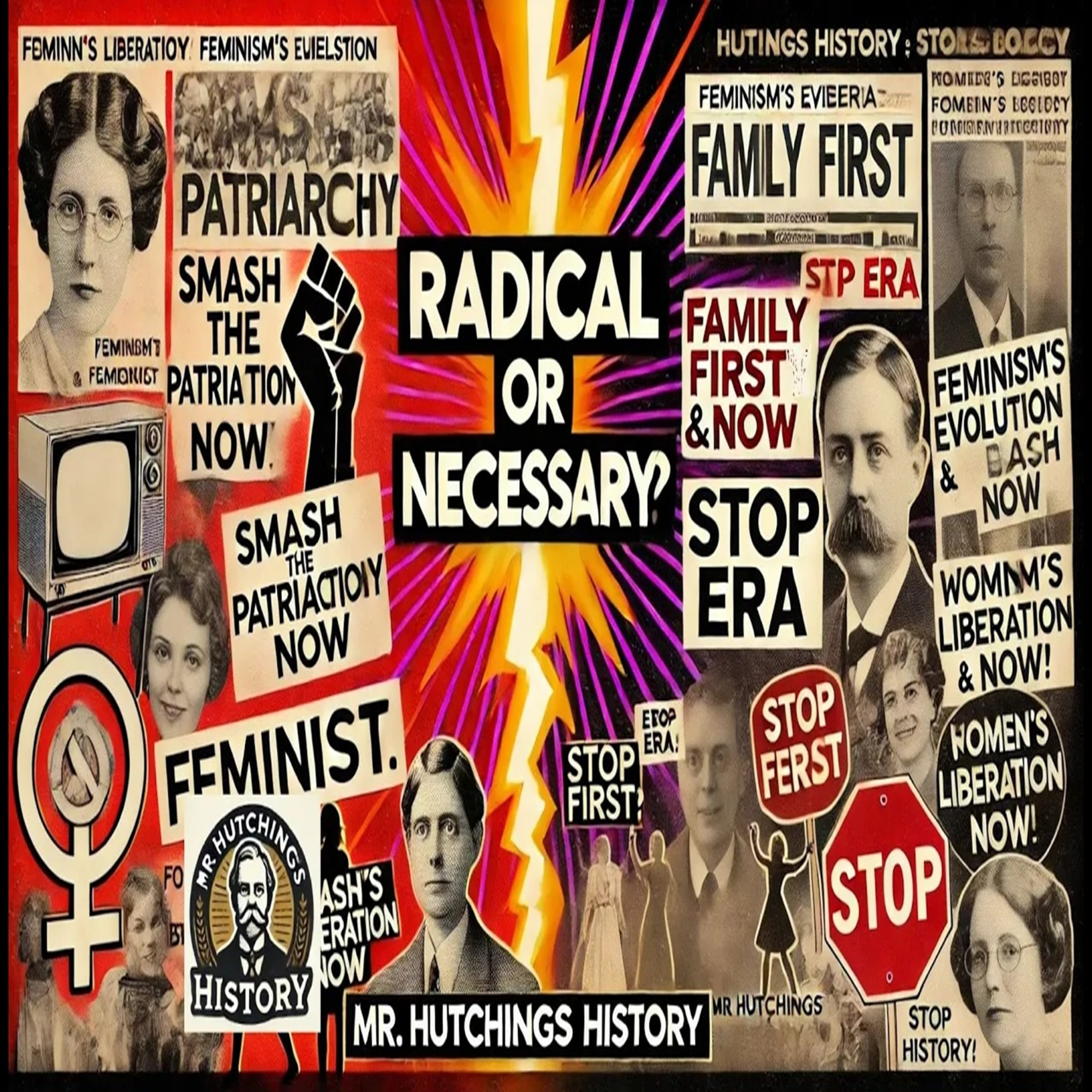 Mr. Hutchings HistoryRadical or Necessary? The Evolution and Backlash of the Feminist Movements in North AmericaIn this episode of Mr. Hutchings’ History, we dive into the 1970s, a pivotal decade for feminist movements in Canada and the United States. This period saw significant advances in reproductive rights, workplace equality, and political representation, but also a strong conservative backlash. We’ll explore the influence of landmark cases like Roe v. Wade (1973), the rise of radical feminist groups like the Radicalesbians, and the powerful opposition led by Phyllis Schlafly. From the rise of Betty Ford’s public advocacy to the conservative challenges against the Equal Rights Amendment (ERA), this episode examines the cultural tensions that defined this t...2024-12-0319 min
Mr. Hutchings HistoryRadical or Necessary? The Evolution and Backlash of the Feminist Movements in North AmericaIn this episode of Mr. Hutchings’ History, we dive into the 1970s, a pivotal decade for feminist movements in Canada and the United States. This period saw significant advances in reproductive rights, workplace equality, and political representation, but also a strong conservative backlash. We’ll explore the influence of landmark cases like Roe v. Wade (1973), the rise of radical feminist groups like the Radicalesbians, and the powerful opposition led by Phyllis Schlafly. From the rise of Betty Ford’s public advocacy to the conservative challenges against the Equal Rights Amendment (ERA), this episode examines the cultural tensions that defined this t...2024-12-0319 min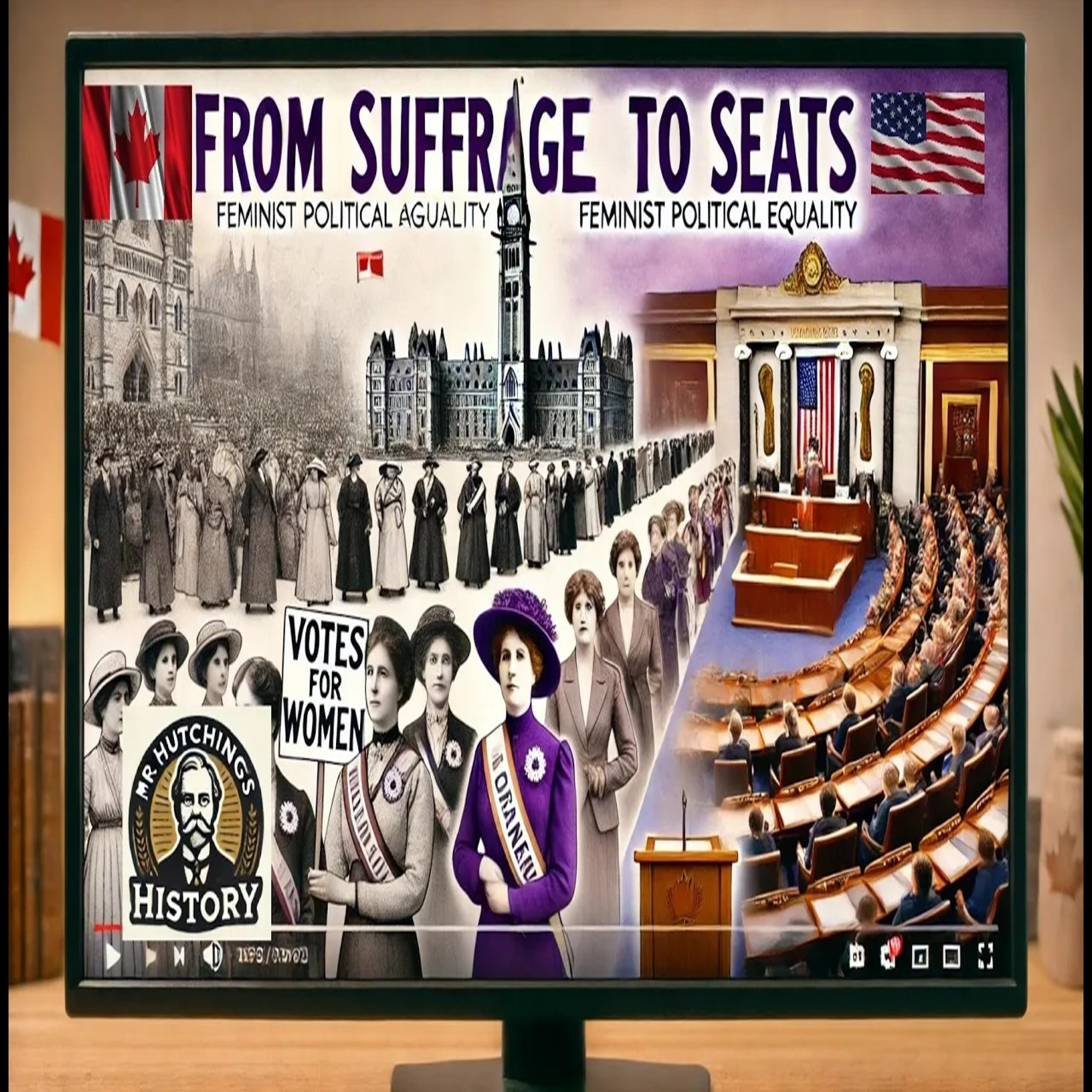 Mr. Hutchings HistoryFrom Suffrage to Seats: Feminist Struggles for Political Equality in Canada and the USAIn this episode of Mr. Hutchings’ History, we explore the ongoing fight for political equality faced by women in Canada and the United States. Despite significant progress in areas like reproductive rights and social reforms, political representation has remained one of the toughest battlegrounds for feminists. From the 1984 U.S. presidential election with Geraldine Ferraro to Canada's breakthrough with Audrey McLaughlin leading the New Democratic Party, we examine the historical milestones and continued challenges women have faced in political leadership. We’ll analyze the symbolic importance of female political figures, the systemic barriers they encountered, and the significance of thei...2024-12-0121 min
Mr. Hutchings HistoryFrom Suffrage to Seats: Feminist Struggles for Political Equality in Canada and the USAIn this episode of Mr. Hutchings’ History, we explore the ongoing fight for political equality faced by women in Canada and the United States. Despite significant progress in areas like reproductive rights and social reforms, political representation has remained one of the toughest battlegrounds for feminists. From the 1984 U.S. presidential election with Geraldine Ferraro to Canada's breakthrough with Audrey McLaughlin leading the New Democratic Party, we examine the historical milestones and continued challenges women have faced in political leadership. We’ll analyze the symbolic importance of female political figures, the systemic barriers they encountered, and the significance of thei...2024-12-0121 min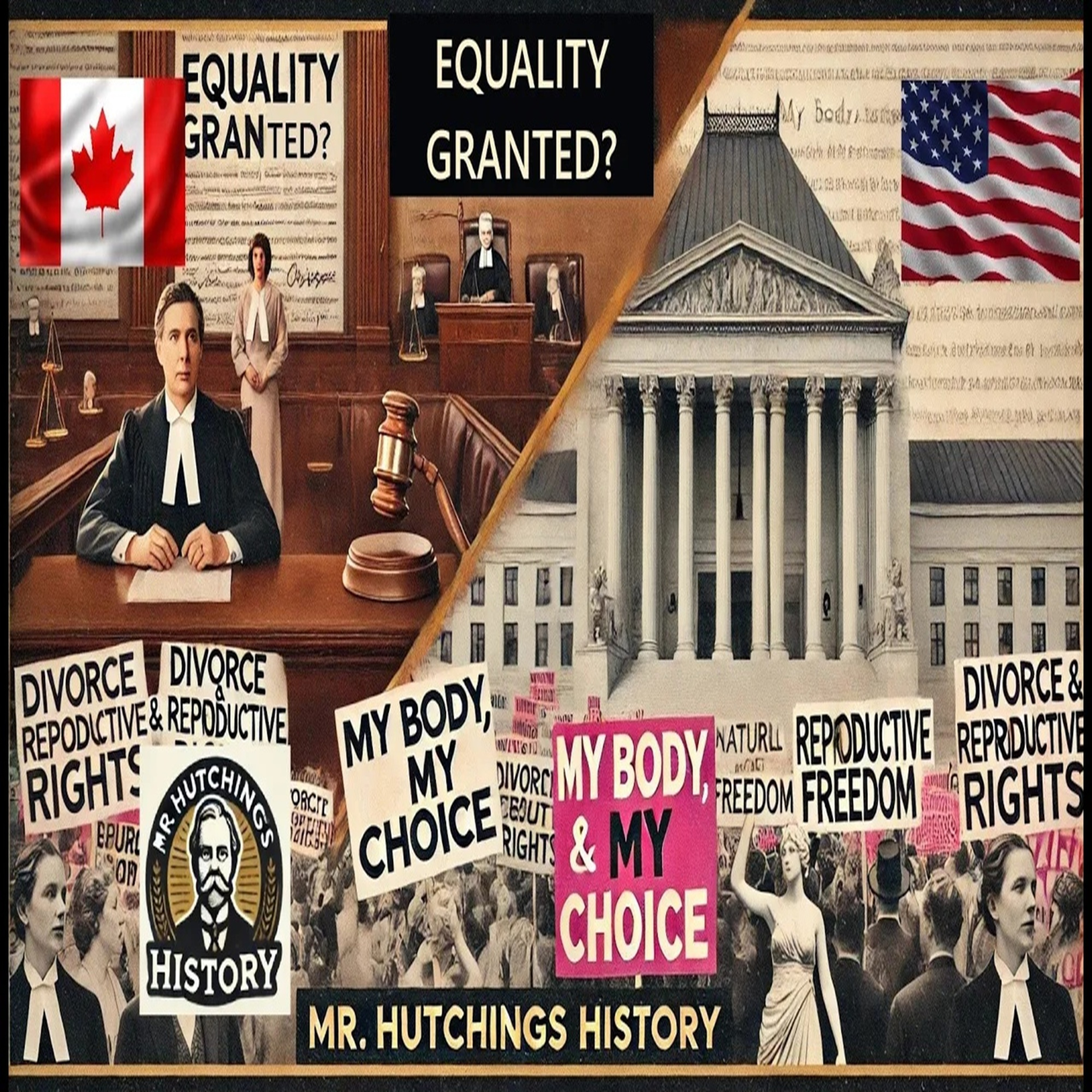 Mr. Hutchings HistoryTo what extent did the government grant equality to feminists in Canada and the USA? Divorce and reproductive rightsIn this episode of Mr. Hutchings’ History, we explore the feminist movements in Canada and the United States during the 1970s and 1980s, focusing on key legal and societal battles surrounding divorce and reproductive rights. We’ll dive into the pivotal court decisions, like R. v. Morgentaler in Canada and Roe v. Wade in the U.S., which shaped women’s rights to control their bodies and access family planning. Despite significant victories, backlash from conservative forces created ongoing challenges. We’ll examine the role of influential figures, such as Dr. Henry Morgentaler and feminist groups like NOW, as well as...2024-11-2535 min
Mr. Hutchings HistoryTo what extent did the government grant equality to feminists in Canada and the USA? Divorce and reproductive rightsIn this episode of Mr. Hutchings’ History, we explore the feminist movements in Canada and the United States during the 1970s and 1980s, focusing on key legal and societal battles surrounding divorce and reproductive rights. We’ll dive into the pivotal court decisions, like R. v. Morgentaler in Canada and Roe v. Wade in the U.S., which shaped women’s rights to control their bodies and access family planning. Despite significant victories, backlash from conservative forces created ongoing challenges. We’ll examine the role of influential figures, such as Dr. Henry Morgentaler and feminist groups like NOW, as well as...2024-11-2535 min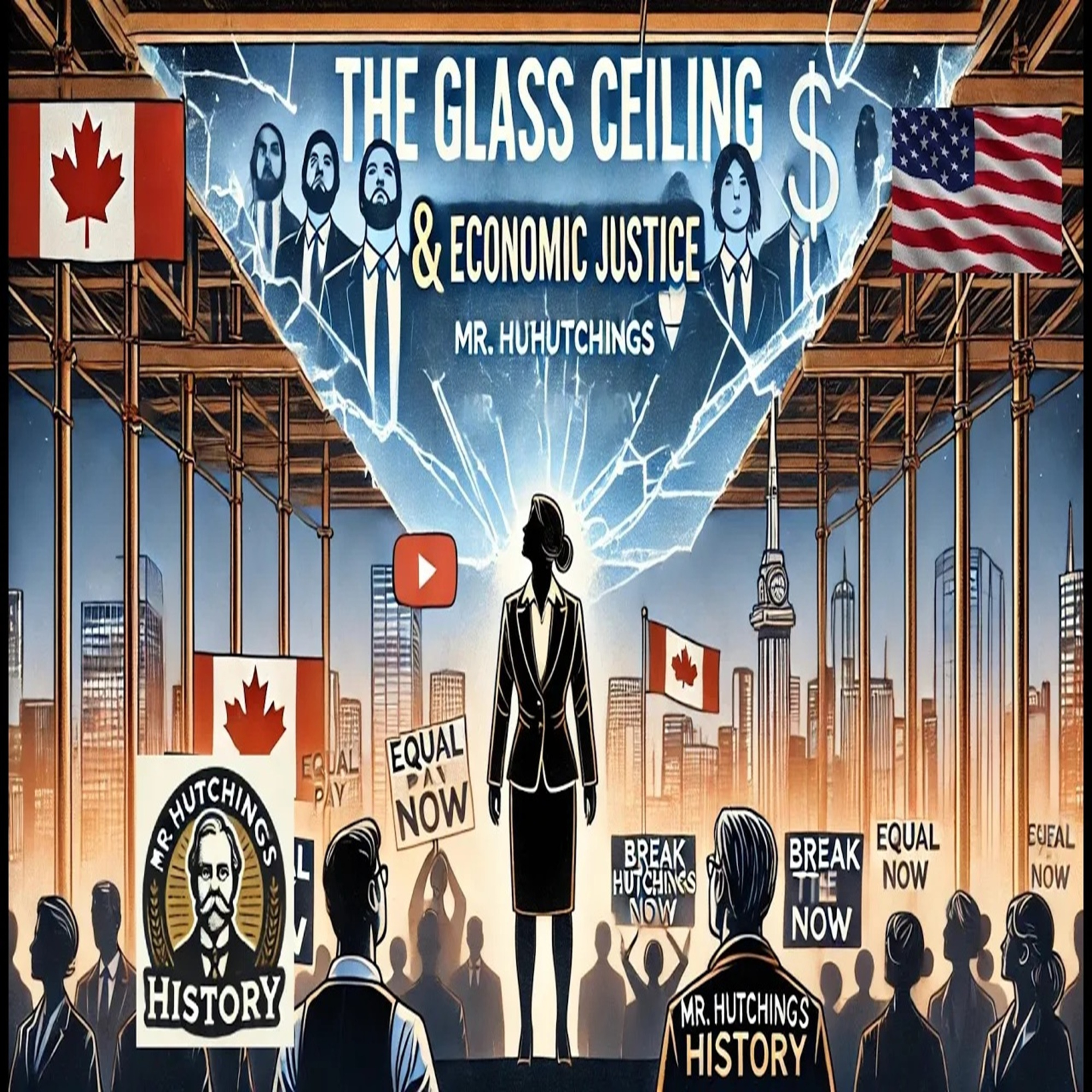 Mr. Hutchings HistoryThe Glass Ceiling and Gender Equality: Feminist Struggles for Economic Justice in North AmericaIn this episode of Mr. Hutchings' History, we delve into the feminist movements in Canada and the United States during the 1970s and 1980s, focusing on the fight for economic equality. Despite significant progress in addressing gender disparities, challenges such as the wage gap and the “glass ceiling” remained persistent. We’ll explore key moments and legislative battles, including the Royal Commission on the Status of Women in Canada and the feminist push for equal pay and reproductive healthcare in both nations.
Key Topics:
The Royal Commission on the Status of Women in Canada and its influe...2024-11-2531 min
Mr. Hutchings HistoryThe Glass Ceiling and Gender Equality: Feminist Struggles for Economic Justice in North AmericaIn this episode of Mr. Hutchings' History, we delve into the feminist movements in Canada and the United States during the 1970s and 1980s, focusing on the fight for economic equality. Despite significant progress in addressing gender disparities, challenges such as the wage gap and the “glass ceiling” remained persistent. We’ll explore key moments and legislative battles, including the Royal Commission on the Status of Women in Canada and the feminist push for equal pay and reproductive healthcare in both nations.
Key Topics:
The Royal Commission on the Status of Women in Canada and its influe...2024-11-2531 min Mr. Hutchings HistoryLegal Battles and Government Responses: Feminist Movements in Canada and the USA, 1970s and 1980sIn this episode of Mr. Hutchings’ History, we explore how feminist movements in Canada and the USA gained traction through legal battles, governmental responses, and influential organizations in the 1970s and 1980s. From landmark government commissions in Canada to pivotal Supreme Court rulings in the U.S., we examine the progress, challenges, and limitations that shaped the feminist fight for equality.
Key Topics:
The Royal Commission on the Status of Women in Canada (1967) and its impact on policy reforms.
The Canadian Charter of Rights and Freedoms (1982) and Section 28’s promise for gender equality.
U.S. government resp...2024-11-2417 min
Mr. Hutchings HistoryLegal Battles and Government Responses: Feminist Movements in Canada and the USA, 1970s and 1980sIn this episode of Mr. Hutchings’ History, we explore how feminist movements in Canada and the USA gained traction through legal battles, governmental responses, and influential organizations in the 1970s and 1980s. From landmark government commissions in Canada to pivotal Supreme Court rulings in the U.S., we examine the progress, challenges, and limitations that shaped the feminist fight for equality.
Key Topics:
The Royal Commission on the Status of Women in Canada (1967) and its impact on policy reforms.
The Canadian Charter of Rights and Freedoms (1982) and Section 28’s promise for gender equality.
U.S. government resp...2024-11-2417 min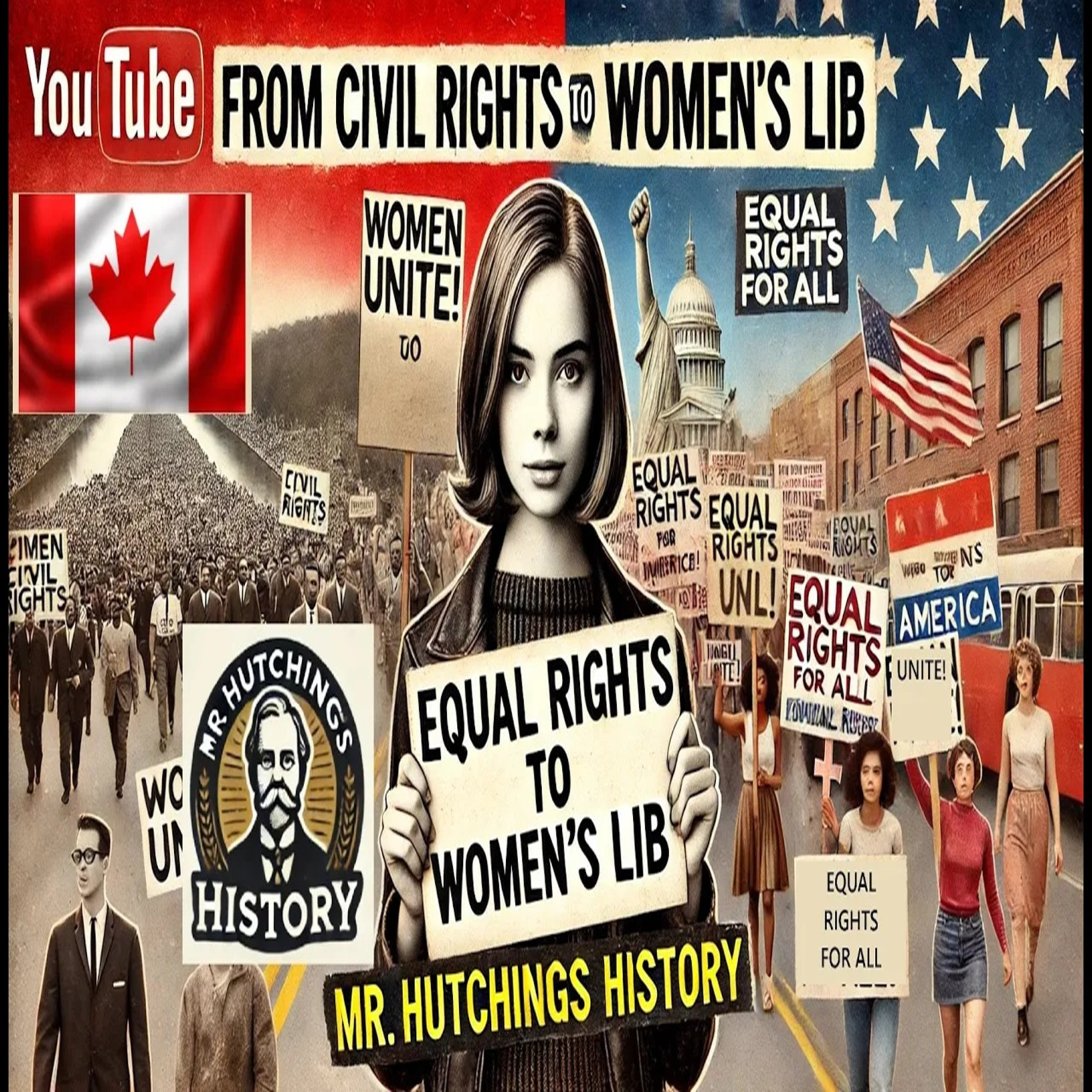 Mr. Hutchings HistoryFrom Civil Rights to Women’s Lib: The Feminist Movements in 1960s AmericaIn this episode of Mr. Hutchings’ History, we explore the rise of feminist activism in the United States during the 1960s, shaped by the Civil Rights Movement, rising discontent, and the fight for gender equality. We’ll delve into the emergence of key organizations like the National Organization for Women (NOW), examine the radical turn with “women’s lib,” and discuss the protests and demonstrations that challenged societal norms.
Key Topics:
The influence of the Civil Rights Movement on the feminist struggle for gender equality.
The radicalization of feminist activism, including protests like the 1968 Miss America Pageant de...2024-11-2417 min
Mr. Hutchings HistoryFrom Civil Rights to Women’s Lib: The Feminist Movements in 1960s AmericaIn this episode of Mr. Hutchings’ History, we explore the rise of feminist activism in the United States during the 1960s, shaped by the Civil Rights Movement, rising discontent, and the fight for gender equality. We’ll delve into the emergence of key organizations like the National Organization for Women (NOW), examine the radical turn with “women’s lib,” and discuss the protests and demonstrations that challenged societal norms.
Key Topics:
The influence of the Civil Rights Movement on the feminist struggle for gender equality.
The radicalization of feminist activism, including protests like the 1968 Miss America Pageant de...2024-11-2417 min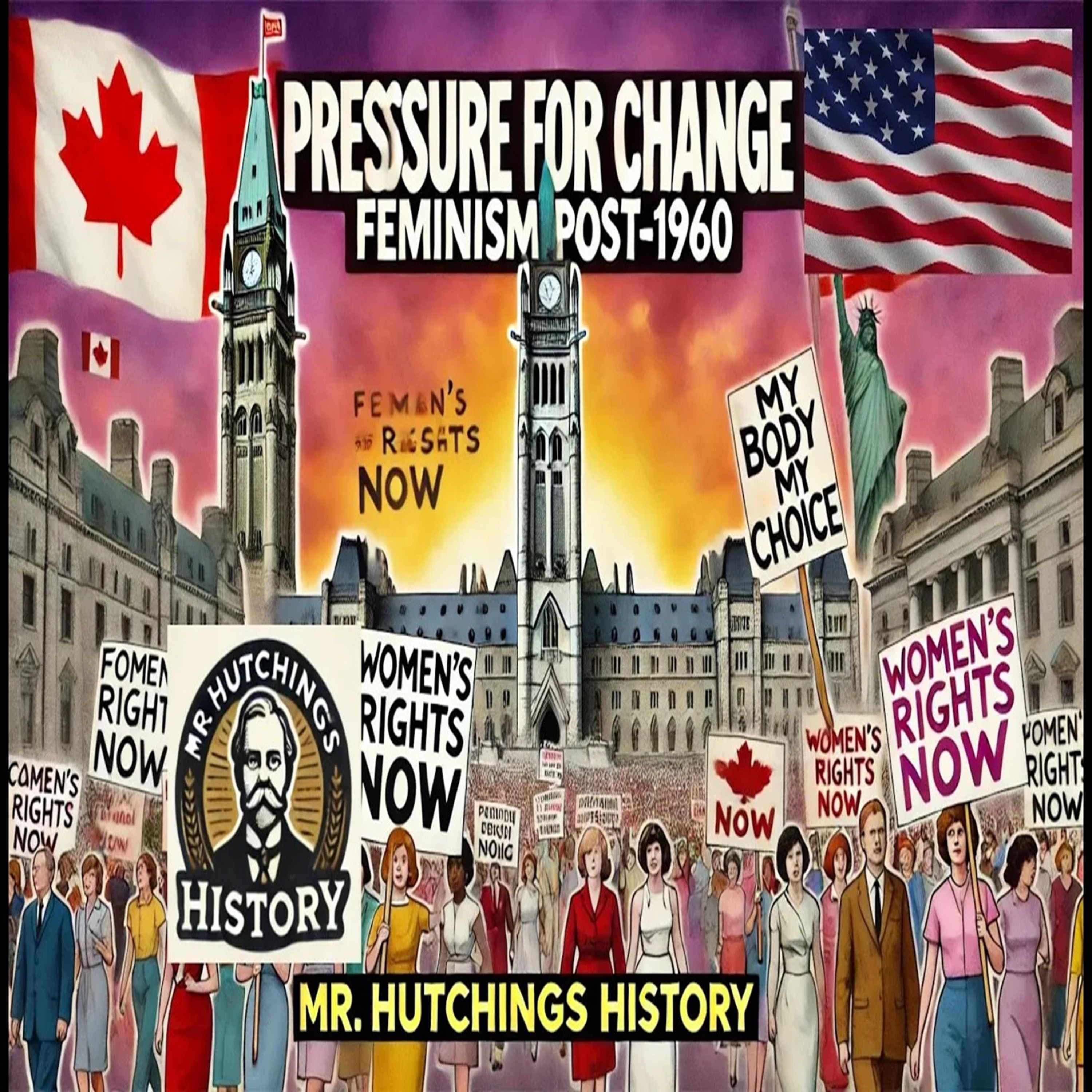 Mr. Hutchings HistoryPressure for Change: Feminism in Canada and the USA Post-1960In this episode of Mr. Hutchings History, we explore the feminist movements in Canada and the United States after 1960, highlighting their growing impact and the significant strides toward gender equality. From political organization and legal reforms to rising feminist voices, we examine how activism in both countries catalyzed systemic change, shaping future policies and societal norms.
Key Topics:
The rise of political activism in Canada through organizations like the Committee for the Equality of Women and the Royal Commission on the Status of Women.
The American feminist movement’s push for legal reforms, including the Equal Pa...2024-11-2416 min
Mr. Hutchings HistoryPressure for Change: Feminism in Canada and the USA Post-1960In this episode of Mr. Hutchings History, we explore the feminist movements in Canada and the United States after 1960, highlighting their growing impact and the significant strides toward gender equality. From political organization and legal reforms to rising feminist voices, we examine how activism in both countries catalyzed systemic change, shaping future policies and societal norms.
Key Topics:
The rise of political activism in Canada through organizations like the Committee for the Equality of Women and the Royal Commission on the Status of Women.
The American feminist movement’s push for legal reforms, including the Equal Pa...2024-11-2416 min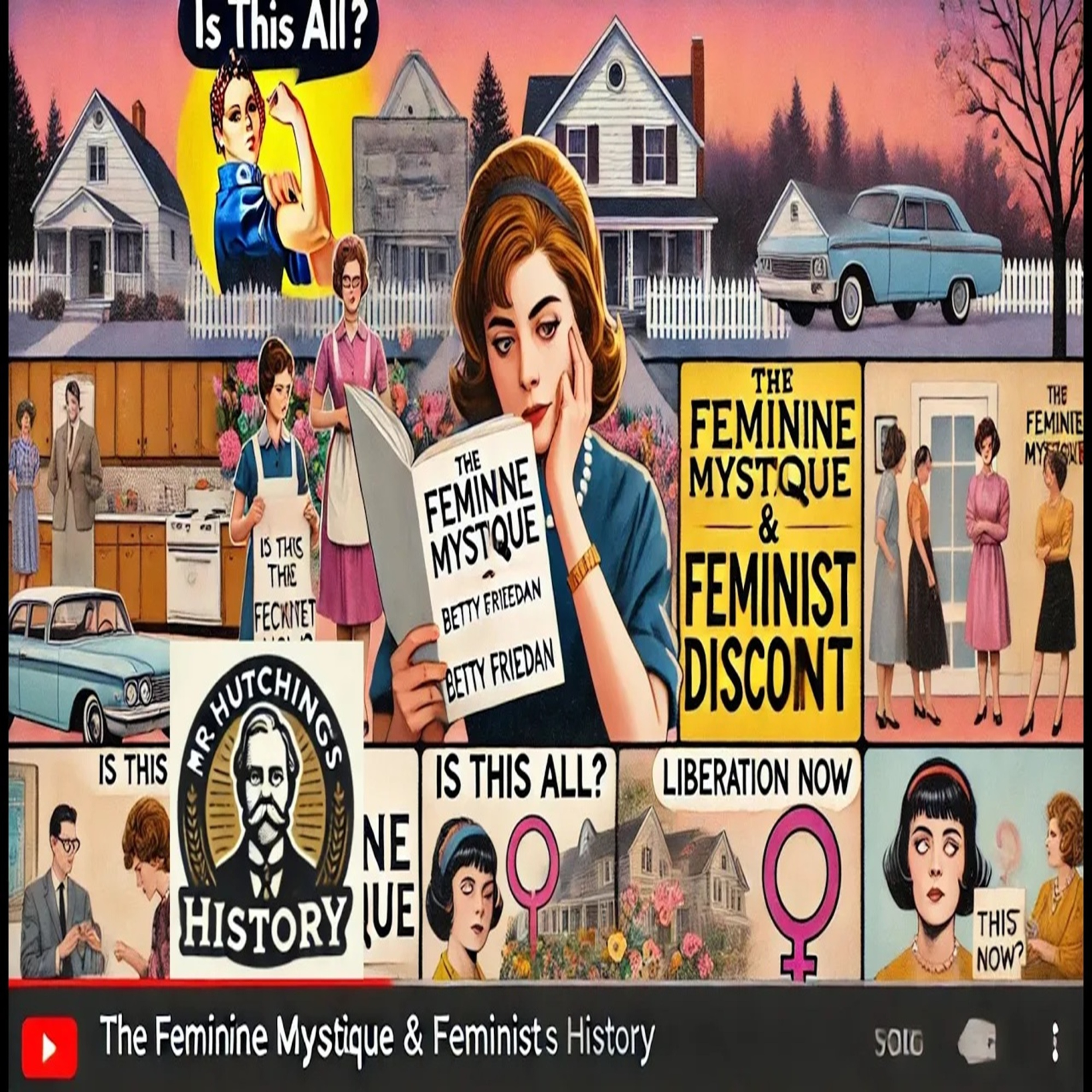 Mr. Hutchings HistoryThe Feminine Mystique and the Rise of Feminist Discontent in AmericaIn this episode of Mr. Hutchings History, we dive into the origins of feminist discontent in the USA and Canada, focusing on the groundbreaking work of Betty Friedan, The Feminine Mystique, and its impact on the feminist movements of the 1960s. We'll explore how Friedan's critique of the post-WWII domestic ideal resonated with women across North America, shedding light on the frustrations that led to organized activism for gender equality.
Key Topics:
The rise of feminist discontent in the 1950s, spurred by restrictive gender roles and societal expectations.
The impact of The Feminine Mystique in articulating...2024-11-2412 min
Mr. Hutchings HistoryThe Feminine Mystique and the Rise of Feminist Discontent in AmericaIn this episode of Mr. Hutchings History, we dive into the origins of feminist discontent in the USA and Canada, focusing on the groundbreaking work of Betty Friedan, The Feminine Mystique, and its impact on the feminist movements of the 1960s. We'll explore how Friedan's critique of the post-WWII domestic ideal resonated with women across North America, shedding light on the frustrations that led to organized activism for gender equality.
Key Topics:
The rise of feminist discontent in the 1950s, spurred by restrictive gender roles and societal expectations.
The impact of The Feminine Mystique in articulating...2024-11-2412 min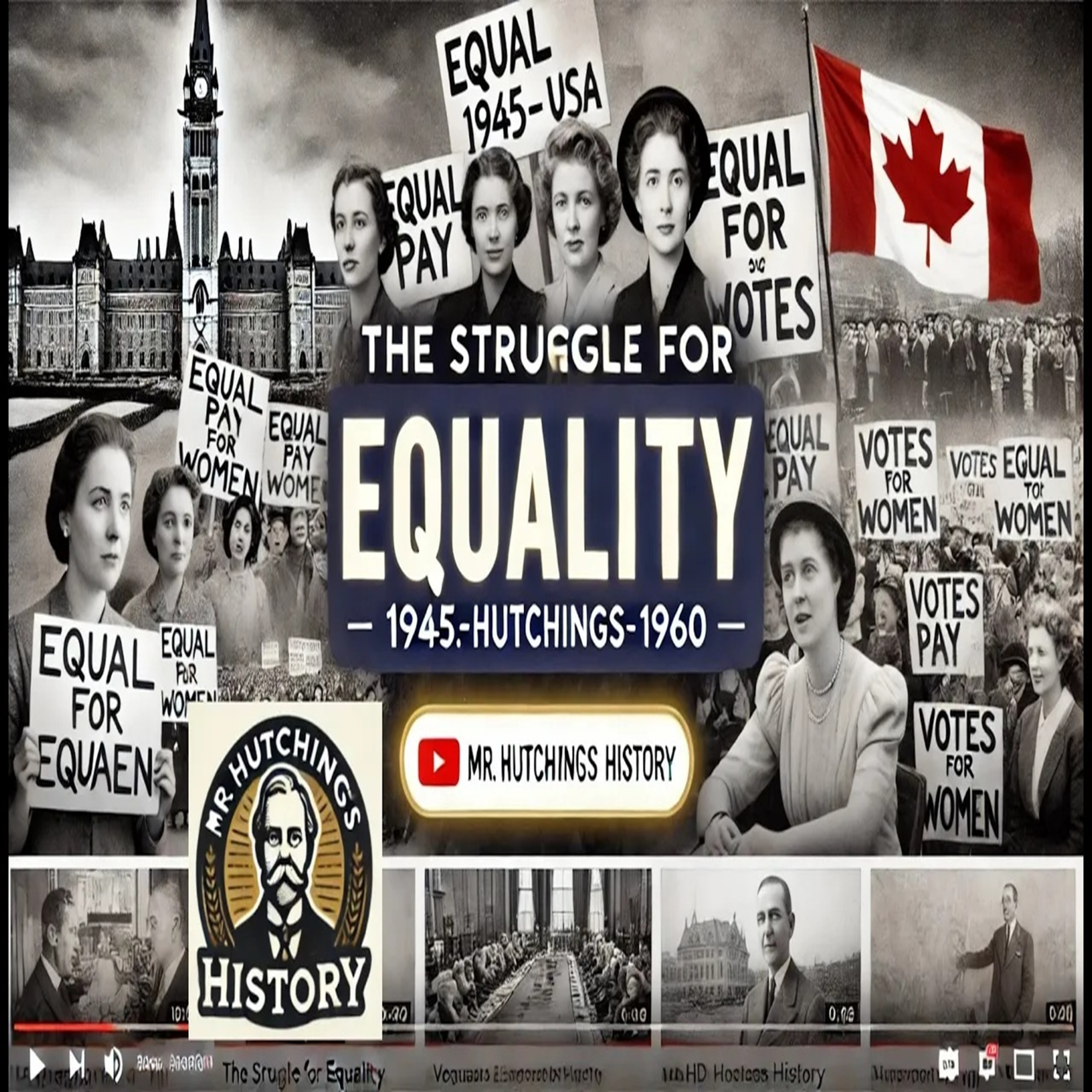 Mr. Hutchings HistoryThe Struggle for Equality: Women’s Rights Movements in Canada and the USA, 1945-1960In this episode of Mr. Hutchings History, we explore the rise of feminist movements in Canada and the United States between 1945 and 1960. This crucial period laid the groundwork for the sweeping feminist changes of the 1960s and beyond. We’ll discuss how post-WWII dynamics, economic pressures, and cultural shifts propelled the demand for gender equality, as women fought for better working conditions, equal pay, and reproductive rights.
Key Topics:
The political and social constraints on women’s rights in post-WWII Canada and the USA.
The impact of the post-war economic boom and rising dissatisfaction with traditional gend...2024-11-2415 min
Mr. Hutchings HistoryThe Struggle for Equality: Women’s Rights Movements in Canada and the USA, 1945-1960In this episode of Mr. Hutchings History, we explore the rise of feminist movements in Canada and the United States between 1945 and 1960. This crucial period laid the groundwork for the sweeping feminist changes of the 1960s and beyond. We’ll discuss how post-WWII dynamics, economic pressures, and cultural shifts propelled the demand for gender equality, as women fought for better working conditions, equal pay, and reproductive rights.
Key Topics:
The political and social constraints on women’s rights in post-WWII Canada and the USA.
The impact of the post-war economic boom and rising dissatisfaction with traditional gend...2024-11-2415 min Mr. Hutchings HistoryPaths to Equality: The Feminist Movements in Canada and the USA, Post-WWIIWelcome to Mr. Hutchings History! In this episode, we explore the evolution of feminist movements in Canada and the USA after World War II. We trace the rise of these movements, the challenges they faced, and their lasting impact on society and law. From the post-war transformation to the fight for reproductive rights, we uncover the driving forces behind the push for gender equality in both countries.
Key Topics:
Early feminist activism in the 19th and early 20th centuries.
The transformative impact of WWII on women's roles and aspirations.
Betty Friedan’s The Feminine Mystique and it...2024-11-2418 min
Mr. Hutchings HistoryPaths to Equality: The Feminist Movements in Canada and the USA, Post-WWIIWelcome to Mr. Hutchings History! In this episode, we explore the evolution of feminist movements in Canada and the USA after World War II. We trace the rise of these movements, the challenges they faced, and their lasting impact on society and law. From the post-war transformation to the fight for reproductive rights, we uncover the driving forces behind the push for gender equality in both countries.
Key Topics:
Early feminist activism in the 19th and early 20th centuries.
The transformative impact of WWII on women's roles and aspirations.
Betty Friedan’s The Feminine Mystique and it...2024-11-2418 min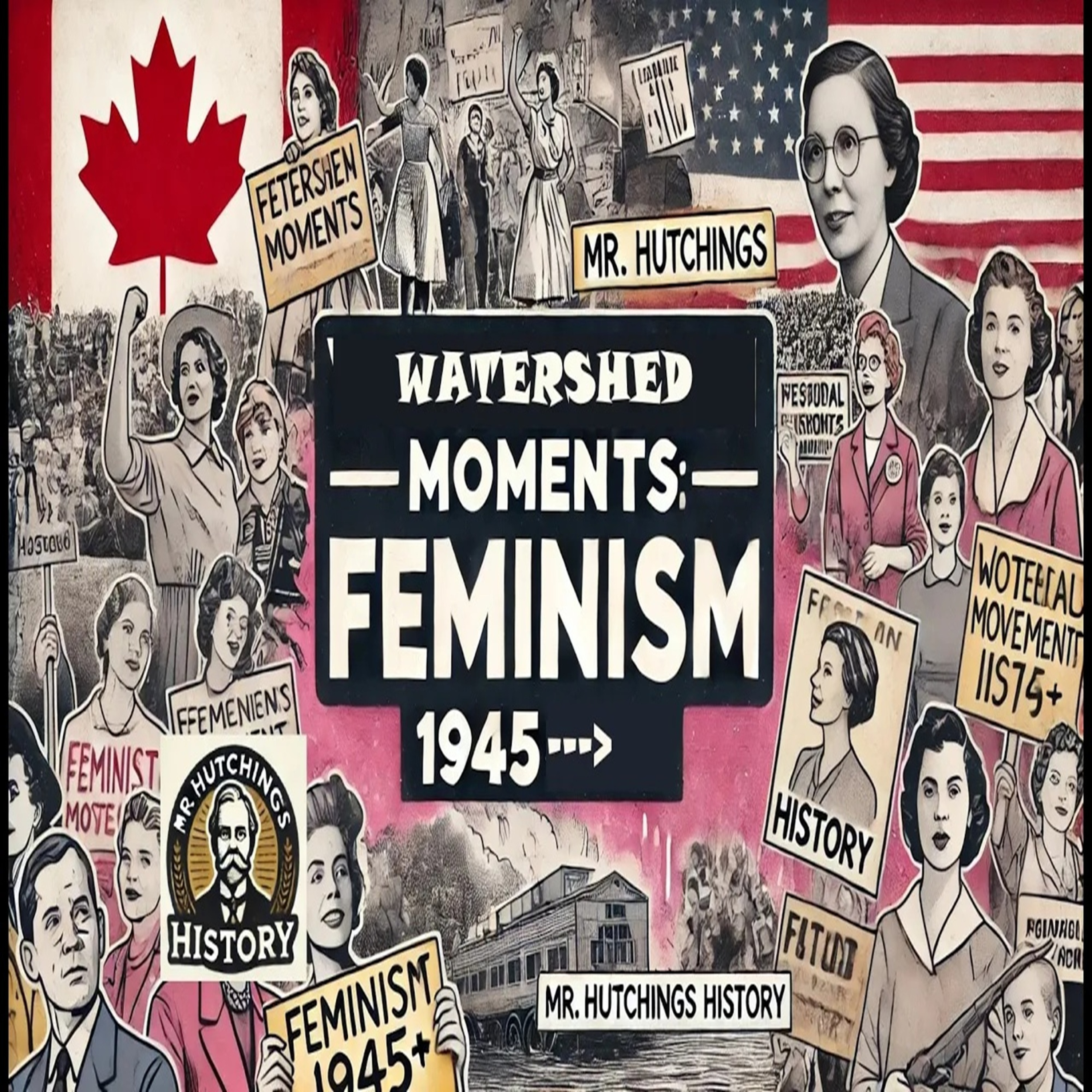 Mr. Hutchings HistoryWatershed Moments: An Overview of the Feminist Movements in Canada and the USA, 1945 and BeyondWelcome to Mr. Hutchings History! In this episode, we explore the rise of feminist movements in Canada and the USA post-1945, tracing their emergence, key moments, and lasting impact. From the post-war shift in women’s roles to the activism of the 1960s and 1970s, we examine how both countries grappled with gender inequality, influenced by key historical events, legal challenges, and social movements.
Key Topics:
The impact of World War II on women's roles and expectations.
Betty Friedan's The Feminine Mystique and the dismantling of the "domestic ideal."
Activism in the Civil Rights and labor mo...2024-11-2419 min
Mr. Hutchings HistoryWatershed Moments: An Overview of the Feminist Movements in Canada and the USA, 1945 and BeyondWelcome to Mr. Hutchings History! In this episode, we explore the rise of feminist movements in Canada and the USA post-1945, tracing their emergence, key moments, and lasting impact. From the post-war shift in women’s roles to the activism of the 1960s and 1970s, we examine how both countries grappled with gender inequality, influenced by key historical events, legal challenges, and social movements.
Key Topics:
The impact of World War II on women's roles and expectations.
Betty Friedan's The Feminine Mystique and the dismantling of the "domestic ideal."
Activism in the Civil Rights and labor mo...2024-11-2419 min Mr. Hutchings HistoryConservative Shifts in Supreme Court Ideology during the 1980s and its effects on Civil RightsWelcome to Mr. Hutchings History! In this episode, we delve into the conservative shift in the U.S. Supreme Court during the 1980s, examining how this transformation impacted civil rights policies, including affirmative action and minority representation. This era saw significant judicial changes with the appointment of conservative justices like Clarence Thomas, who reshaped the Court’s approach to race-conscious policies. We'll explore key cases, such as Bakke v. Regents (1978), and discuss how Reagan-era judicial appointments and public backlash contributed to a rethinking of civil rights protections.
Key Topics:
The Reagan administration’s impact on the judi...2024-11-2412 min
Mr. Hutchings HistoryConservative Shifts in Supreme Court Ideology during the 1980s and its effects on Civil RightsWelcome to Mr. Hutchings History! In this episode, we delve into the conservative shift in the U.S. Supreme Court during the 1980s, examining how this transformation impacted civil rights policies, including affirmative action and minority representation. This era saw significant judicial changes with the appointment of conservative justices like Clarence Thomas, who reshaped the Court’s approach to race-conscious policies. We'll explore key cases, such as Bakke v. Regents (1978), and discuss how Reagan-era judicial appointments and public backlash contributed to a rethinking of civil rights protections.
Key Topics:
The Reagan administration’s impact on the judi...2024-11-2412 min Mr. Hutchings HistoryThe Rise and Challenges of Affirmative Action in the 1970sWelcome to Mr. Hutchings History! In today’s episode, we explore the emergence of affirmative action during the 1970s, a pivotal decade in U.S. civil rights history. This episode examines how the federal government, particularly through legal rulings like Griggs v. Duke Power Company (1971) and President Nixon’s policies, sought to combat racial inequality. However, despite the government’s efforts, resistance to these policies grew, culminating in the Bakke v. Regents case (1978) and the conservative backlash in the 1980s.
Key Topics:
The role of the federal government in advancing affirmative action, including Nixon’s actions.
The Bakk...2024-11-2217 min
Mr. Hutchings HistoryThe Rise and Challenges of Affirmative Action in the 1970sWelcome to Mr. Hutchings History! In today’s episode, we explore the emergence of affirmative action during the 1970s, a pivotal decade in U.S. civil rights history. This episode examines how the federal government, particularly through legal rulings like Griggs v. Duke Power Company (1971) and President Nixon’s policies, sought to combat racial inequality. However, despite the government’s efforts, resistance to these policies grew, culminating in the Bakke v. Regents case (1978) and the conservative backlash in the 1980s.
Key Topics:
The role of the federal government in advancing affirmative action, including Nixon’s actions.
The Bakk...2024-11-2217 min Mr. Hutchings HistoryJohnson’s Legacy: Federal Power and the Path to Affirmative ActionWelcome to Mr. Hutchings History! In today’s episode, we explore the lasting impact of President Lyndon B. Johnson’s civil rights legacy, focusing on his role in the passage of landmark legislation and his shift toward affirmative action. Despite his achievements, such as the 1964 Civil Rights Act and the 1965 Voting Rights Act, Johnson faced resistance from Congress, local officials, and white Americans, revealing the limits of federal power in addressing systemic inequality.
Key Topics:
Johnson’s Civil Rights Achievements: The passage of transformative laws, including the Civil Rights Act and Voting Rights Act.
Resistance to Change...2024-11-2217 min
Mr. Hutchings HistoryJohnson’s Legacy: Federal Power and the Path to Affirmative ActionWelcome to Mr. Hutchings History! In today’s episode, we explore the lasting impact of President Lyndon B. Johnson’s civil rights legacy, focusing on his role in the passage of landmark legislation and his shift toward affirmative action. Despite his achievements, such as the 1964 Civil Rights Act and the 1965 Voting Rights Act, Johnson faced resistance from Congress, local officials, and white Americans, revealing the limits of federal power in addressing systemic inequality.
Key Topics:
Johnson’s Civil Rights Achievements: The passage of transformative laws, including the Civil Rights Act and Voting Rights Act.
Resistance to Change...2024-11-2217 min Mr. Hutchings HistoryThe Limits of Lyndon Johnson’s Civil Rights LegacyWelcome to Mr. Hutchings History! In today’s episode, we dive into the complexities of Lyndon B. Johnson’s civil rights legacy. Despite the groundbreaking successes of the 1964 Civil Rights Act and the 1965 Voting Rights Act, Johnson's later years in office revealed the limits of his reforms.
Key Topics:
Congress and Public Opinion: The resistance Johnson faced, especially regarding housing discrimination and white opposition, which delayed further progress.
Local Resistance: How key political allies, like Chicago’s Mayor Daley, obstructed federal mandates, particularly in desegregation.
Black Power and White Backlash: The rise of Black Power and the ra...2024-11-2211 min
Mr. Hutchings HistoryThe Limits of Lyndon Johnson’s Civil Rights LegacyWelcome to Mr. Hutchings History! In today’s episode, we dive into the complexities of Lyndon B. Johnson’s civil rights legacy. Despite the groundbreaking successes of the 1964 Civil Rights Act and the 1965 Voting Rights Act, Johnson's later years in office revealed the limits of his reforms.
Key Topics:
Congress and Public Opinion: The resistance Johnson faced, especially regarding housing discrimination and white opposition, which delayed further progress.
Local Resistance: How key political allies, like Chicago’s Mayor Daley, obstructed federal mandates, particularly in desegregation.
Black Power and White Backlash: The rise of Black Power and the ra...2024-11-2211 min Mr. Hutchings HistoryPresident Lyndon Johnson and the Civil Rights RevolutionWelcome to Mr. Hutchings History! In today’s episode, we explore President Lyndon B. Johnson’s profound impact on the civil rights movement from 1963-1969. Johnson's leadership, marked by landmark legislation like the 1964 Civil Rights Act and the 1965 Voting Rights Act, reshaped American society. However, his personal racial views and political pragmatism raise questions about his motivations.
Key Topics:
Civil Rights Legislation: Johnson’s role in passing the 1964 Civil Rights Act and 1965 Voting Rights Act, dismantling segregation and securing voting rights.
Contradictions in Johnson’s Views: The tension between his public support for civil rights and private...2024-11-2218 min
Mr. Hutchings HistoryPresident Lyndon Johnson and the Civil Rights RevolutionWelcome to Mr. Hutchings History! In today’s episode, we explore President Lyndon B. Johnson’s profound impact on the civil rights movement from 1963-1969. Johnson's leadership, marked by landmark legislation like the 1964 Civil Rights Act and the 1965 Voting Rights Act, reshaped American society. However, his personal racial views and political pragmatism raise questions about his motivations.
Key Topics:
Civil Rights Legislation: Johnson’s role in passing the 1964 Civil Rights Act and 1965 Voting Rights Act, dismantling segregation and securing voting rights.
Contradictions in Johnson’s Views: The tension between his public support for civil rights and private...2024-11-2218 min Mr. Hutchings HistoryPresident Kennedy and Civil Rights: Why the Progress Was So SlowWelcome to Mr. Hutchings History! This episode examines the Kennedy administration’s approach to civil rights, exploring why progress during his presidency was often slow and reactive. Despite high campaign promises, President Kennedy faced significant obstacles, including Congressional resistance, Southern opposition, and the challenge of balancing public opinion.
Key Topics:
Kennedy’s Campaign Promises vs. Actions: Explore his hesitancy to act on housing discrimination and literacy tests due to political calculations.
Congressional Challenges: Learn how Southern Democrats and regional resistance stalled key civil rights legislation during his presidency.
Activism and Key Events: Analyze the Freedom Rides, Birm...2024-11-2215 min
Mr. Hutchings HistoryPresident Kennedy and Civil Rights: Why the Progress Was So SlowWelcome to Mr. Hutchings History! This episode examines the Kennedy administration’s approach to civil rights, exploring why progress during his presidency was often slow and reactive. Despite high campaign promises, President Kennedy faced significant obstacles, including Congressional resistance, Southern opposition, and the challenge of balancing public opinion.
Key Topics:
Kennedy’s Campaign Promises vs. Actions: Explore his hesitancy to act on housing discrimination and literacy tests due to political calculations.
Congressional Challenges: Learn how Southern Democrats and regional resistance stalled key civil rights legislation during his presidency.
Activism and Key Events: Analyze the Freedom Rides, Birm...2024-11-2215 min Mr. Hutchings HistoryCivil Rights Under Presidents Kennedy, 1961-63 and Johnson, 1963-69: Comparing the LegaciesWelcome to Mr. Hutchings History! In this episode, we delve into the civil rights legacies of Presidents John F. Kennedy (1961-63) and Lyndon B. Johnson (1963-69). While both played critical roles in the civil rights movement, their approaches and achievements differed significantly, shaped by political pressures, activism, and the challenges of their respective eras.
Key Topics:
Kennedy’s Reluctance: From the Freedom Rides to the March on Washington, Kennedy’s administration reacted to civil rights crises but hesitated to push bold reforms, constrained by Southern political support.
Johnson’s Legislative Drive: After Kennedy’s assassination, Johnson used his...2024-11-2219 min
Mr. Hutchings HistoryCivil Rights Under Presidents Kennedy, 1961-63 and Johnson, 1963-69: Comparing the LegaciesWelcome to Mr. Hutchings History! In this episode, we delve into the civil rights legacies of Presidents John F. Kennedy (1961-63) and Lyndon B. Johnson (1963-69). While both played critical roles in the civil rights movement, their approaches and achievements differed significantly, shaped by political pressures, activism, and the challenges of their respective eras.
Key Topics:
Kennedy’s Reluctance: From the Freedom Rides to the March on Washington, Kennedy’s administration reacted to civil rights crises but hesitated to push bold reforms, constrained by Southern political support.
Johnson’s Legislative Drive: After Kennedy’s assassination, Johnson used his...2024-11-2219 min Mr. Hutchings HistoryCivil Rights in the Eisenhower Era, 1953-1961: Progress by PressureWelcome back to Mr. Hutchings History! This episode explores the civil rights landscape during Dwight D. Eisenhower’s presidency. Marked by his hesitant engagement, the Eisenhower era reveals how grassroots activism drove civil rights progress, even as federal leadership lagged behind.
Key Topics:
Eisenhower’s Reluctance: From his lukewarm response to Brown v. Board of Education to limited enforcement of civil rights, Eisenhower’s cautious stance reflected concerns over societal disruption and political resistance.
Little Rock Crisis: The 1957 showdown at Central High School forced Eisenhower to deploy federal troops, establishing a precedent for federal intervention in civil...2024-11-2220 min
Mr. Hutchings HistoryCivil Rights in the Eisenhower Era, 1953-1961: Progress by PressureWelcome back to Mr. Hutchings History! This episode explores the civil rights landscape during Dwight D. Eisenhower’s presidency. Marked by his hesitant engagement, the Eisenhower era reveals how grassroots activism drove civil rights progress, even as federal leadership lagged behind.
Key Topics:
Eisenhower’s Reluctance: From his lukewarm response to Brown v. Board of Education to limited enforcement of civil rights, Eisenhower’s cautious stance reflected concerns over societal disruption and political resistance.
Little Rock Crisis: The 1957 showdown at Central High School forced Eisenhower to deploy federal troops, establishing a precedent for federal intervention in civil...2024-11-2220 min Mr. Hutchings HistoryCivil Rights in the Truman Era, 1945-1953: Progress in Principle, Resistance in PracticeWelcome to Mr. Hutchings History! In this episode, we examine the Truman presidency and its civil rights legacy. From 1945 to 1953, President Harry S. Truman took groundbreaking steps, such as desegregating the military and creating the landmark To Secure These Rights report. However, his efforts faced significant resistance from Congress, particularly Southern Democrats, limiting the practical impact of his initiatives.
Key Topics:
Truman’s Civil Rights Agenda: The To Secure These Rights report called for an end to segregation and poll taxes, emphasizing the hypocrisy of racial discrimination during the Cold War.
Executive Orders: Desegregation of the ar...2024-11-2216 min
Mr. Hutchings HistoryCivil Rights in the Truman Era, 1945-1953: Progress in Principle, Resistance in PracticeWelcome to Mr. Hutchings History! In this episode, we examine the Truman presidency and its civil rights legacy. From 1945 to 1953, President Harry S. Truman took groundbreaking steps, such as desegregating the military and creating the landmark To Secure These Rights report. However, his efforts faced significant resistance from Congress, particularly Southern Democrats, limiting the practical impact of his initiatives.
Key Topics:
Truman’s Civil Rights Agenda: The To Secure These Rights report called for an end to segregation and poll taxes, emphasizing the hypocrisy of racial discrimination during the Cold War.
Executive Orders: Desegregation of the ar...2024-11-2216 min Mr. Hutchings HistoryTruman and Civil Rights, 1945-1953: A Step Forward or Political Calculus?Welcome to Mr. Hutchings History! This episode explores President Harry S. Truman’s approach to civil rights from 1945 to 1953, a pivotal era for federal intervention in racial equality. Truman’s presidency marked a turning point, with groundbreaking steps like desegregating the armed forces and creating the Fair Employment Practices Committee (FEPC). However, his actions faced resistance from Southern Democrats and were shaped by Cold War pressures.
Key Topics:
Executive Orders: Truman desegregated the military and federal employment in 1948, signaling federal support for civil rights.
Political Context: The Cold War influenced Truman’s policies as the U.S. sou...2024-11-2215 min
Mr. Hutchings HistoryTruman and Civil Rights, 1945-1953: A Step Forward or Political Calculus?Welcome to Mr. Hutchings History! This episode explores President Harry S. Truman’s approach to civil rights from 1945 to 1953, a pivotal era for federal intervention in racial equality. Truman’s presidency marked a turning point, with groundbreaking steps like desegregating the armed forces and creating the Fair Employment Practices Committee (FEPC). However, his actions faced resistance from Southern Democrats and were shaped by Cold War pressures.
Key Topics:
Executive Orders: Truman desegregated the military and federal employment in 1948, signaling federal support for civil rights.
Political Context: The Cold War influenced Truman’s policies as the U.S. sou...2024-11-2215 min Mr. Hutchings HistoryDe Facto Segregation in Chicago: The Struggle for Housing EqualityWelcome to Mr. Hutchings History! In this episode, we explore Dr. Martin Luther King Jr.’s 1966 Chicago campaign, where the Southern Christian Leadership Conference (SCLC) faced the challenges of de facto segregation, systemic poverty, and housing discrimination in a Northern urban setting. This campaign marked King’s bold shift from addressing Southern segregation to confronting entrenched economic injustices in the North.
Key Topics:
King’s focus on discriminatory housing practices and the challenges of mobilizing Chicago’s Black community.
Operation Breadbasket’s success in increasing Black employment under Jesse Jackson’s leadership.
The backlash from white residents du...2024-11-2213 min
Mr. Hutchings HistoryDe Facto Segregation in Chicago: The Struggle for Housing EqualityWelcome to Mr. Hutchings History! In this episode, we explore Dr. Martin Luther King Jr.’s 1966 Chicago campaign, where the Southern Christian Leadership Conference (SCLC) faced the challenges of de facto segregation, systemic poverty, and housing discrimination in a Northern urban setting. This campaign marked King’s bold shift from addressing Southern segregation to confronting entrenched economic injustices in the North.
Key Topics:
King’s focus on discriminatory housing practices and the challenges of mobilizing Chicago’s Black community.
Operation Breadbasket’s success in increasing Black employment under Jesse Jackson’s leadership.
The backlash from white residents du...2024-11-2213 min Mr. Hutchings HistoryThe Civil Rights Act of 1964: Lyndon B. Johnson’s Legacy and the Path to EqualityDive into the transformative passage of the Civil Rights Act of 1964 in this episode of Mr. Hutchings History. This landmark legislation ended legal segregation and prohibited discrimination based on race, color, religion, sex, or national origin. We explore the roles of key figures like Lyndon B. Johnson, the political and social dynamics behind the bill, and the relentless activism that paved the way for its success.
Discover the challenges Johnson faced in Congress, the influence of grassroots movements, and the impact of events like the Birmingham Campaign and the March on Washington. Learn about the historiographical perspectives...2024-11-2210 min
Mr. Hutchings HistoryThe Civil Rights Act of 1964: Lyndon B. Johnson’s Legacy and the Path to EqualityDive into the transformative passage of the Civil Rights Act of 1964 in this episode of Mr. Hutchings History. This landmark legislation ended legal segregation and prohibited discrimination based on race, color, religion, sex, or national origin. We explore the roles of key figures like Lyndon B. Johnson, the political and social dynamics behind the bill, and the relentless activism that paved the way for its success.
Discover the challenges Johnson faced in Congress, the influence of grassroots movements, and the impact of events like the Birmingham Campaign and the March on Washington. Learn about the historiographical perspectives...2024-11-2210 min Mr. Hutchings HistoryOccupation, Resistance, and Justice: The Public Fight for Justice by Indigenous Civil Rights Movements of the 1970sWelcome back to Mr. Hutchings History! In this episode, we explore the 1970s, a crucial period for Indigenous civil rights movements in North America. This decade saw a surge of activism across the United States and Canada, driven by bold protests and calls for justice. The American Indian Movement (AIM) led significant occupations like Alcatraz and Wounded Knee, demanding sovereignty and the fulfillment of treaty obligations. In Canada, Indigenous communities fought back against industrial pollution and sought justice for racial violence, as exemplified by the tragic case of Helen Betty Osborne. Indigenous resistance reached new heights, challenging government policies...2024-11-2223 min
Mr. Hutchings HistoryOccupation, Resistance, and Justice: The Public Fight for Justice by Indigenous Civil Rights Movements of the 1970sWelcome back to Mr. Hutchings History! In this episode, we explore the 1970s, a crucial period for Indigenous civil rights movements in North America. This decade saw a surge of activism across the United States and Canada, driven by bold protests and calls for justice. The American Indian Movement (AIM) led significant occupations like Alcatraz and Wounded Knee, demanding sovereignty and the fulfillment of treaty obligations. In Canada, Indigenous communities fought back against industrial pollution and sought justice for racial violence, as exemplified by the tragic case of Helen Betty Osborne. Indigenous resistance reached new heights, challenging government policies...2024-11-2223 min Mr. Hutchings History1960s Indigenous Civil Rights Movements: Activism and Assimilation Policies in North AmericaIn this episode of Mr. Hutchings History, we delve into the transformative civil rights movements of the 1960s, as Native Americans and First Nations in North America fought against assimilation policies and for the recognition of their rights. From the “fish-ins” in Washington State to opposition to Canada's White Paper, Indigenous activism took on new forms, fueled by the rise of organizations like the NCAI, NIYC, and AIM. These groups were pivotal in challenging policies that sought to erase Native identities and limit sovereignty. We explore the broader impact of these movements, the rise of more militant activism, and the...2024-11-2214 min
Mr. Hutchings History1960s Indigenous Civil Rights Movements: Activism and Assimilation Policies in North AmericaIn this episode of Mr. Hutchings History, we delve into the transformative civil rights movements of the 1960s, as Native Americans and First Nations in North America fought against assimilation policies and for the recognition of their rights. From the “fish-ins” in Washington State to opposition to Canada's White Paper, Indigenous activism took on new forms, fueled by the rise of organizations like the NCAI, NIYC, and AIM. These groups were pivotal in challenging policies that sought to erase Native identities and limit sovereignty. We explore the broader impact of these movements, the rise of more militant activism, and the...2024-11-2214 min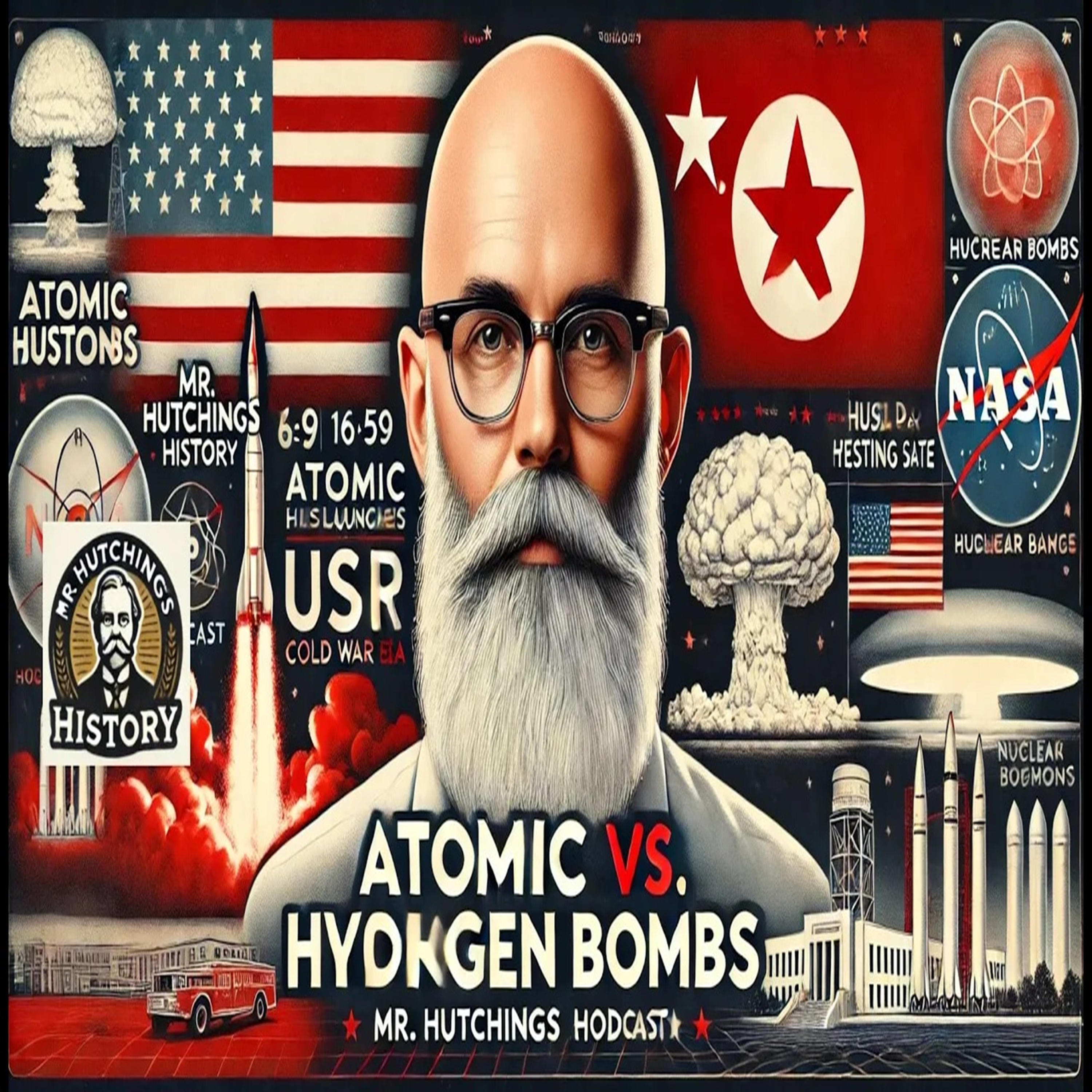 Mr. Hutchings HistoryAtomic vs. Hydrogen Bombs – The Science, History, and Impact of Nuclear WeaponsWelcome to Mr. Hutchings History! In today’s episode, we explore the critical distinctions between atomic and hydrogen bombs, the two most powerful types of nuclear weapons that have defined modern warfare and shaped global politics. We dive into the science of fission vs. fusion, the development of these weapons during World War II and the Cold War, and their lasting impact on international relations and security.The Atomic Bomb: We trace the history of the atomic bomb, from its use on Hiroshima and Nagasaki to its role in shaping the Cold War and global diplomacy....2024-11-2107 min
Mr. Hutchings HistoryAtomic vs. Hydrogen Bombs – The Science, History, and Impact of Nuclear WeaponsWelcome to Mr. Hutchings History! In today’s episode, we explore the critical distinctions between atomic and hydrogen bombs, the two most powerful types of nuclear weapons that have defined modern warfare and shaped global politics. We dive into the science of fission vs. fusion, the development of these weapons during World War II and the Cold War, and their lasting impact on international relations and security.The Atomic Bomb: We trace the history of the atomic bomb, from its use on Hiroshima and Nagasaki to its role in shaping the Cold War and global diplomacy....2024-11-2107 min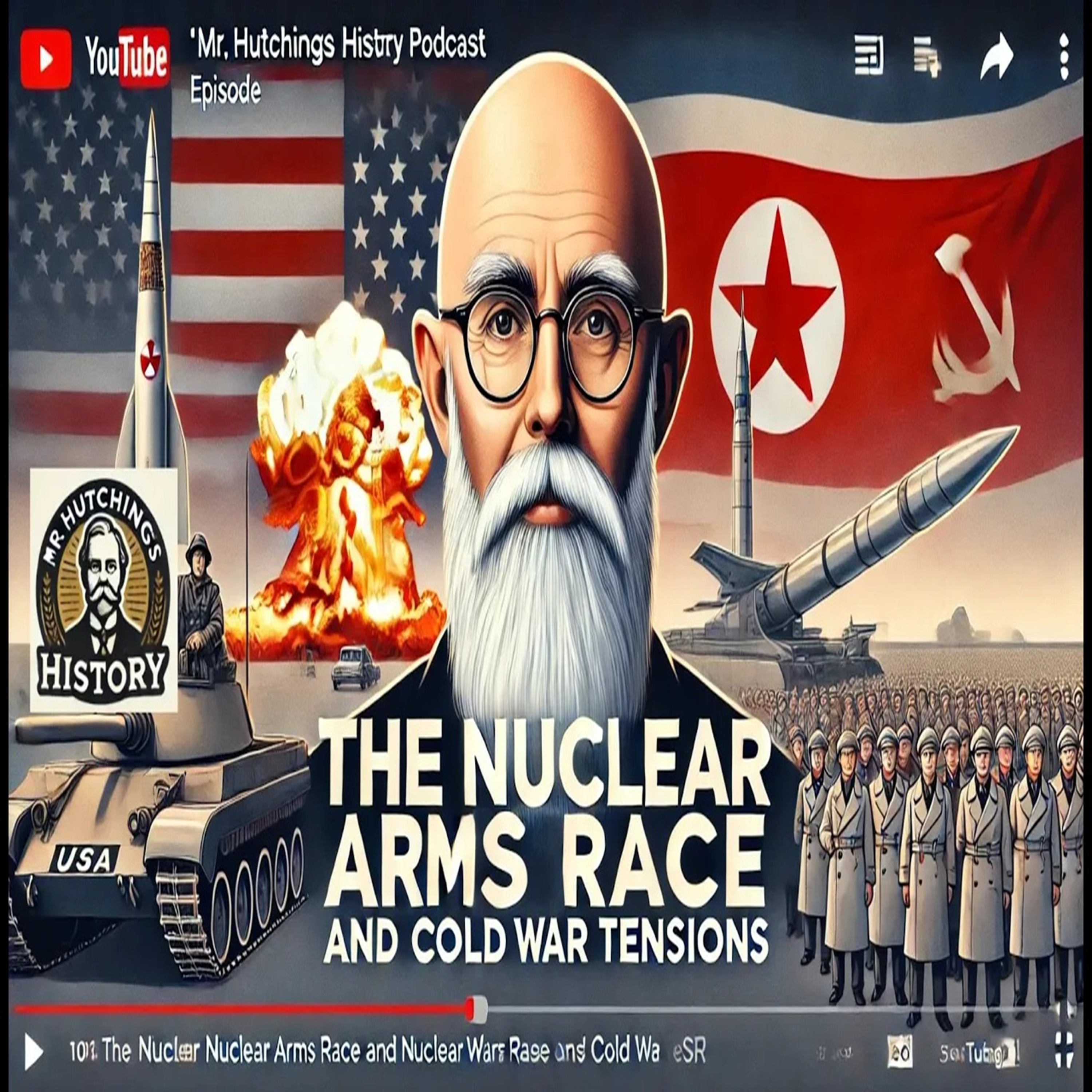 Mr. Hutchings HistoryThe Nuclear Arms Race and Cold War TensionsWelcome to Mr. Hutchings History! In this episode, we delve into one of the defining features of the Cold War: the nuclear arms race. This fierce competition between the United States and the Soviet Union had profound implications for global diplomacy, military strategies, and international relations.We explore:The origins of the nuclear arms race, beginning with the US and Soviet atomic bomb developments.The rise of deterrence strategies like Mutually Assured Destruction (MAD) and the concept of brinkmanship.Key events such as the launch of Sputnik, the myth of the missile gap, and the Cuban...2024-11-2118 min
Mr. Hutchings HistoryThe Nuclear Arms Race and Cold War TensionsWelcome to Mr. Hutchings History! In this episode, we delve into one of the defining features of the Cold War: the nuclear arms race. This fierce competition between the United States and the Soviet Union had profound implications for global diplomacy, military strategies, and international relations.We explore:The origins of the nuclear arms race, beginning with the US and Soviet atomic bomb developments.The rise of deterrence strategies like Mutually Assured Destruction (MAD) and the concept of brinkmanship.Key events such as the launch of Sputnik, the myth of the missile gap, and the Cuban...2024-11-2118 min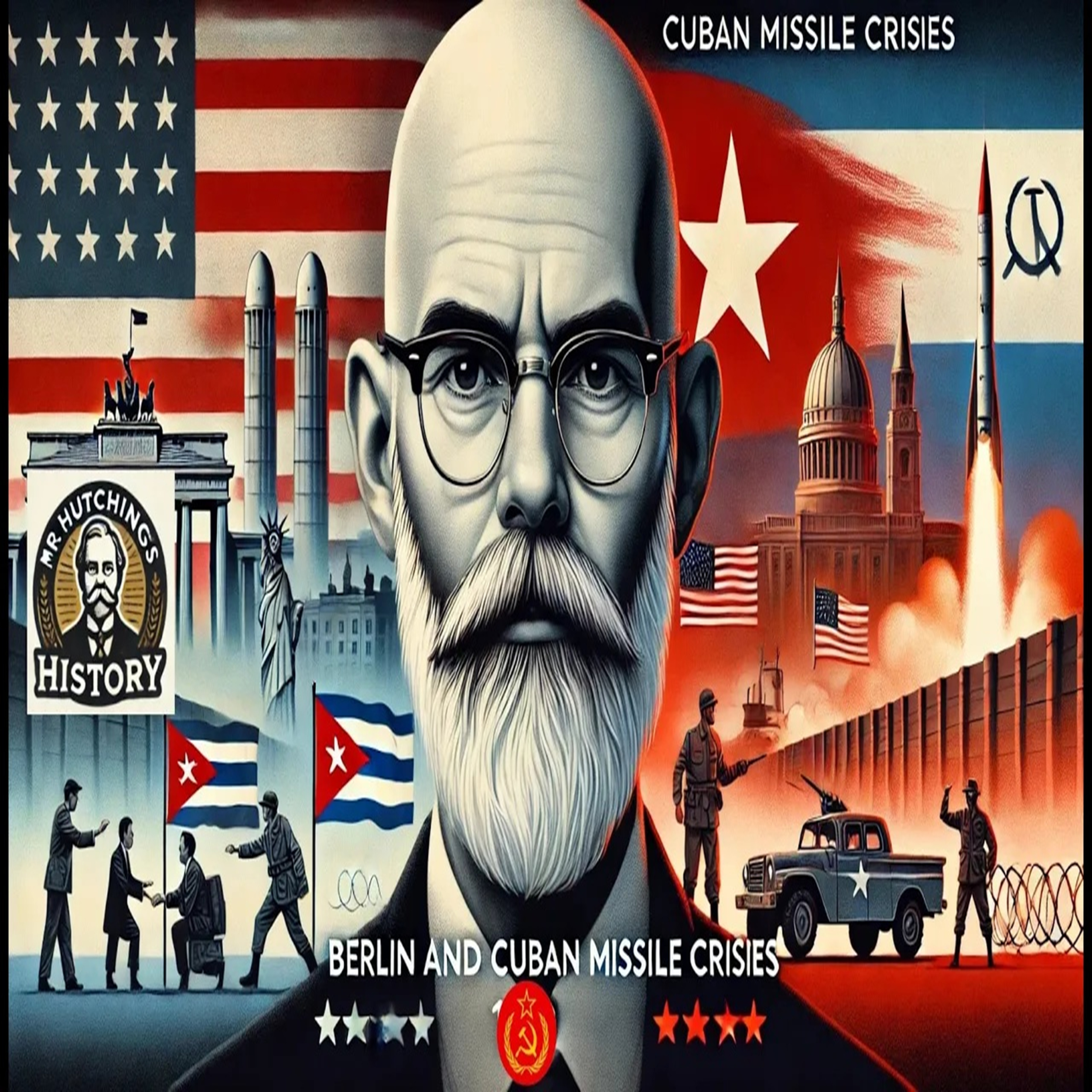 Mr. Hutchings HistoryBerlin and Cuban Missile Crises – Cold War FlashpointsWelcome to Mr. Hutchings History! In this episode, we explore two of the most critical crises of the Cold War: The Berlin Crisis (1958-1961) and the Cuban Missile Crisis (1962). These events brought the United States and the Soviet Union to the brink of nuclear war, forever altering superpower relations.Key topics include:The Berlin Crisis and Khrushchev’s demand for the withdrawal of Western powers from BerlinThe construction of the Berlin Wall and its symbolic representation of the Cold War divideThe Cuban Missile Crisis, the 13-day standoff, and the resolution that averted nuclear conflictThe impact of th...2024-11-2111 min
Mr. Hutchings HistoryBerlin and Cuban Missile Crises – Cold War FlashpointsWelcome to Mr. Hutchings History! In this episode, we explore two of the most critical crises of the Cold War: The Berlin Crisis (1958-1961) and the Cuban Missile Crisis (1962). These events brought the United States and the Soviet Union to the brink of nuclear war, forever altering superpower relations.Key topics include:The Berlin Crisis and Khrushchev’s demand for the withdrawal of Western powers from BerlinThe construction of the Berlin Wall and its symbolic representation of the Cold War divideThe Cuban Missile Crisis, the 13-day standoff, and the resolution that averted nuclear conflictThe impact of th...2024-11-2111 min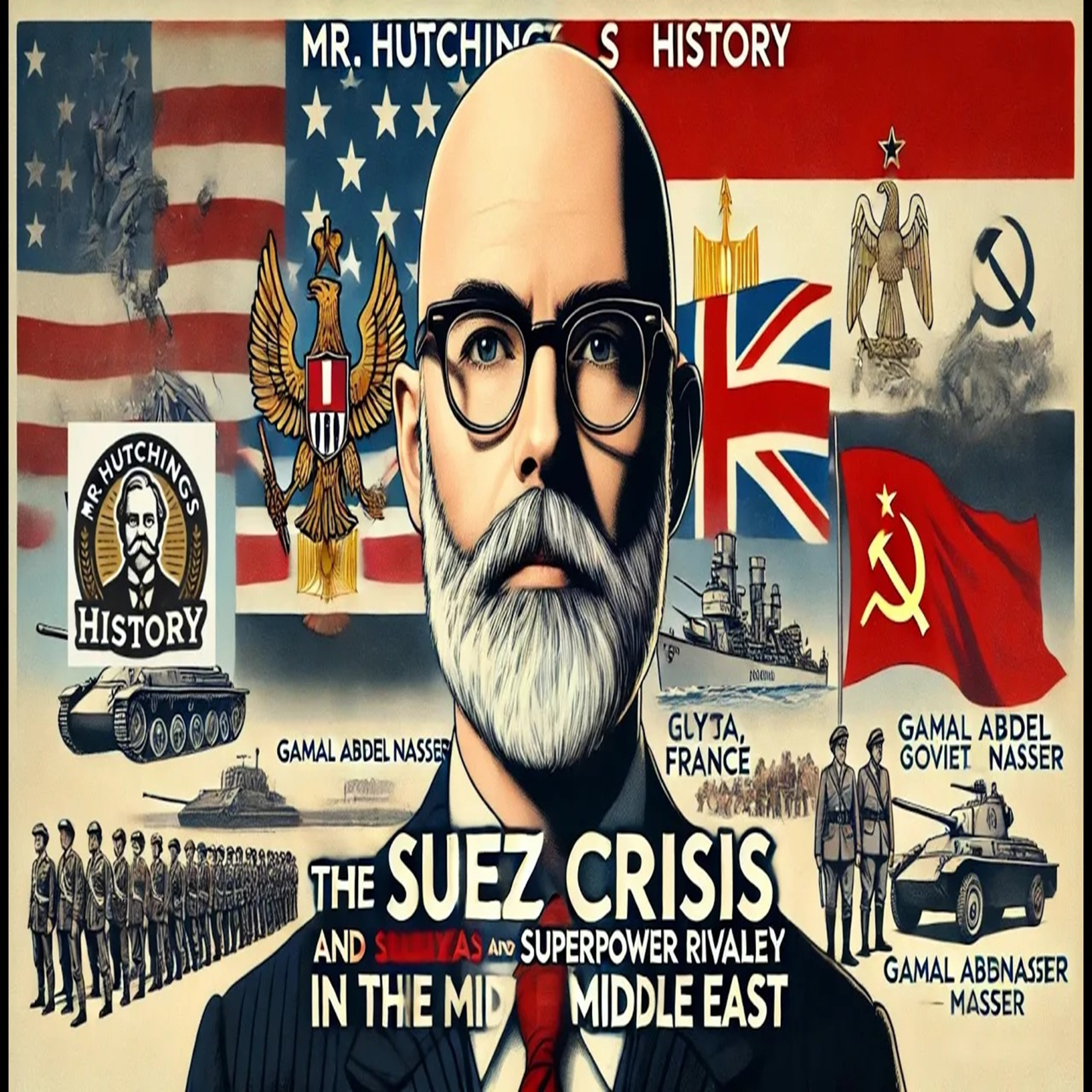 Mr. Hutchings HistoryThe Suez Crisis and Superpower Rivalry in the Middle EastWelcome to Mr. Hutchings History! In today’s episode, we focus on the Suez Crisis of 1956 and its lasting impact on Cold War superpower relations, particularly in the Middle East. The event heightened tensions between the United States and the Soviet Union and set the stage for the Eisenhower Doctrine, shaping future foreign policies and Cold War dynamics.Key topics include:The causes of the Suez Crisis and Nasser’s nationalization of the Suez CanalThe US and Soviet responses and the challenges to British and French influenceThe introduction of the Eisenhower Doctrine and its implications for the...2024-11-2108 min
Mr. Hutchings HistoryThe Suez Crisis and Superpower Rivalry in the Middle EastWelcome to Mr. Hutchings History! In today’s episode, we focus on the Suez Crisis of 1956 and its lasting impact on Cold War superpower relations, particularly in the Middle East. The event heightened tensions between the United States and the Soviet Union and set the stage for the Eisenhower Doctrine, shaping future foreign policies and Cold War dynamics.Key topics include:The causes of the Suez Crisis and Nasser’s nationalization of the Suez CanalThe US and Soviet responses and the challenges to British and French influenceThe introduction of the Eisenhower Doctrine and its implications for the...2024-11-2108 min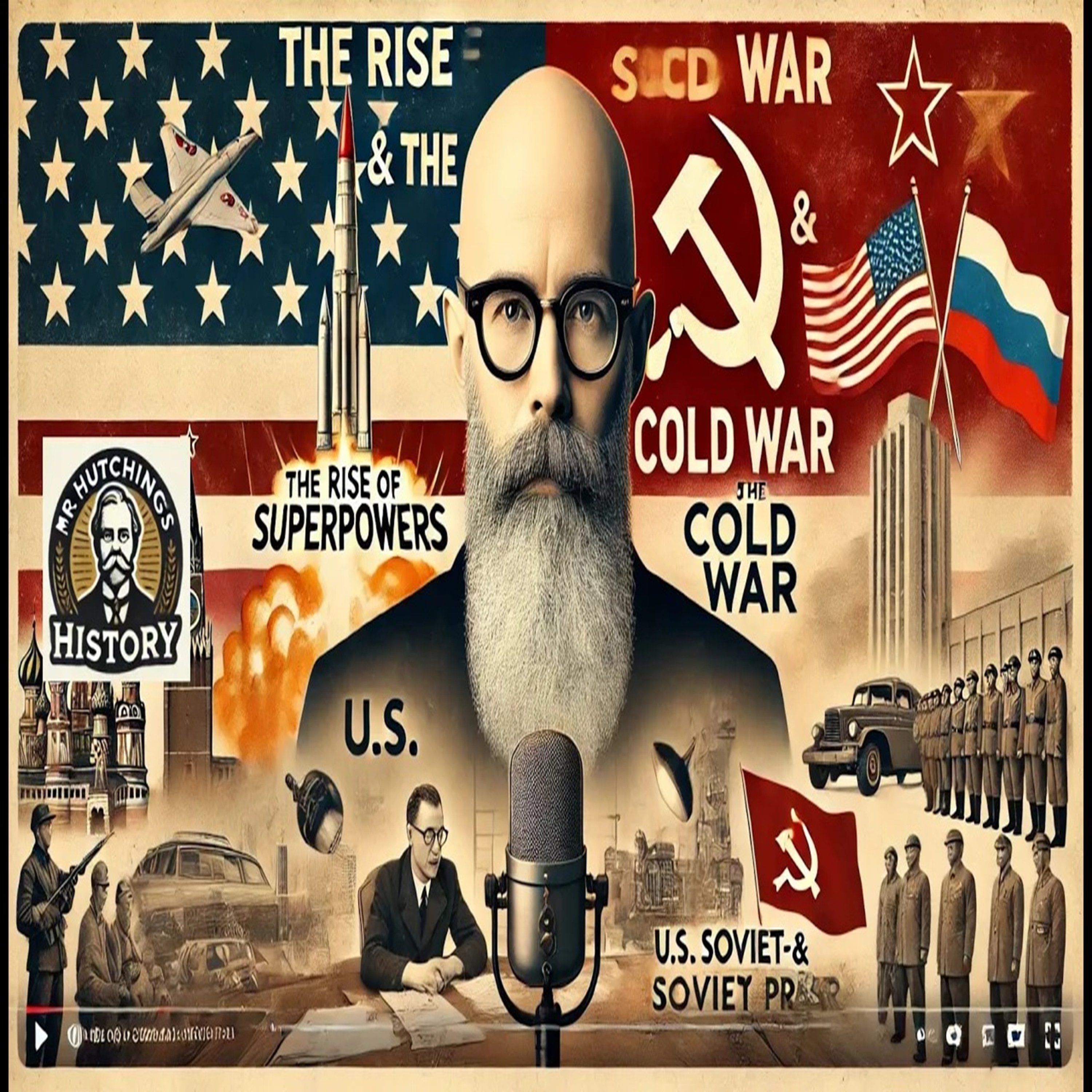 Mr. Hutchings HistoryThe Rise of Superpowers and the Origins of the Cold War: An OverviewWelcome toMr. Hutchings History. In this episode, we explore the origins of the Cold War, one of the most defining conflicts of the 20th century. We’ll examine how the US and USSR emerged as superpowers by 1945, and how wartime conferences like Yalta and Potsdam set the stage for superpower rivalry. What were the key ideological differences that led to tensions? Why did Europe become politically and militarily divided by 1949? We’ll delve into the breakdown of the Grand Alliance and the division of Europe, analyzing key events like the Berlin Blockade and the Marshall Plan.Through a mi...2024-11-2108 min
Mr. Hutchings HistoryThe Rise of Superpowers and the Origins of the Cold War: An OverviewWelcome toMr. Hutchings History. In this episode, we explore the origins of the Cold War, one of the most defining conflicts of the 20th century. We’ll examine how the US and USSR emerged as superpowers by 1945, and how wartime conferences like Yalta and Potsdam set the stage for superpower rivalry. What were the key ideological differences that led to tensions? Why did Europe become politically and militarily divided by 1949? We’ll delve into the breakdown of the Grand Alliance and the division of Europe, analyzing key events like the Berlin Blockade and the Marshall Plan.Through a mi...2024-11-2108 min